The Power 100: Commercial Real Estate’s Most Powerful Players
By The Editors April 23, 2019 9:00 am
reprints

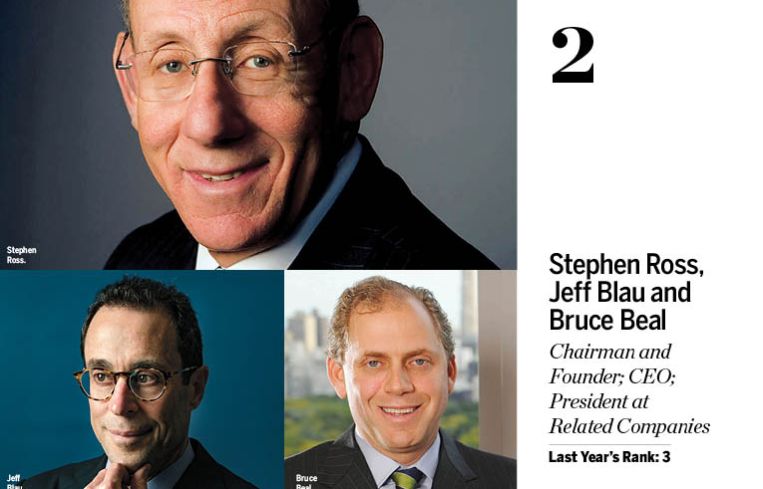
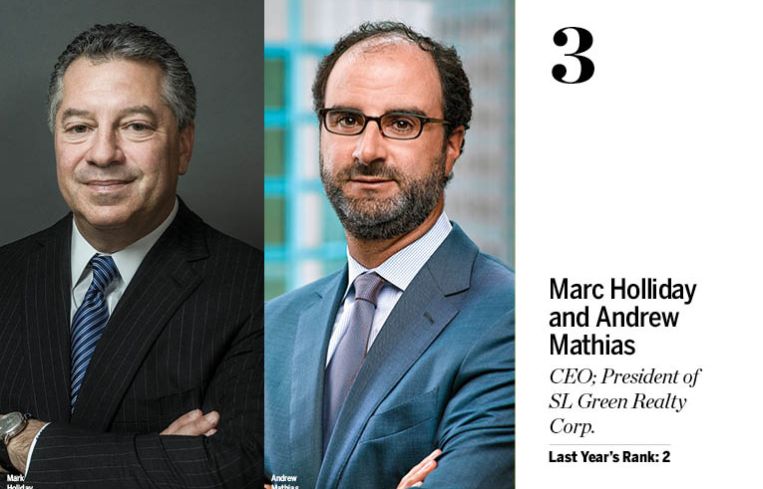
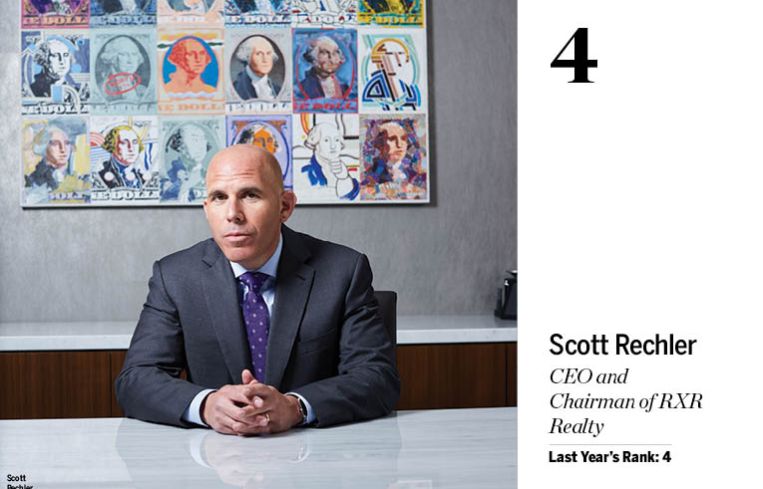
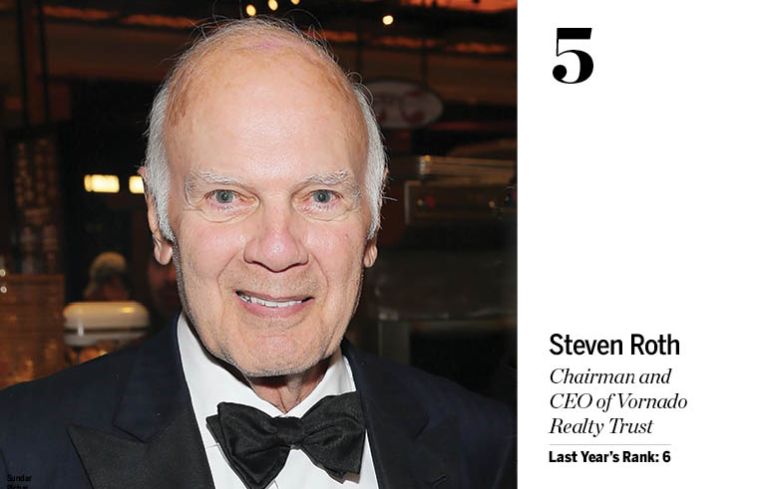
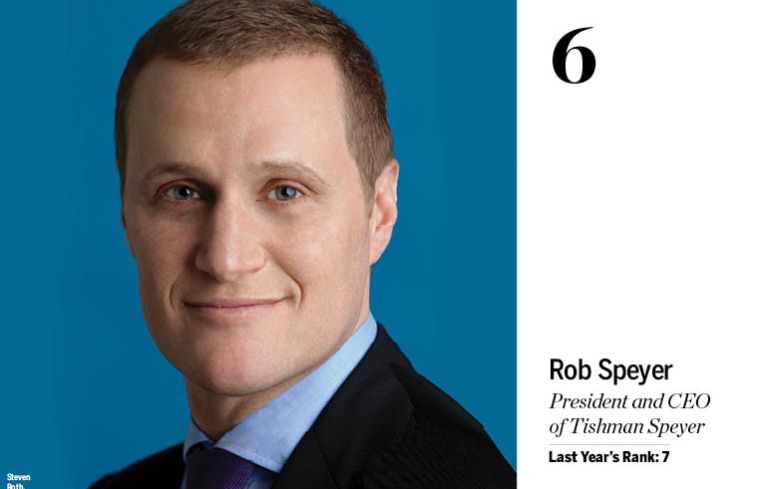

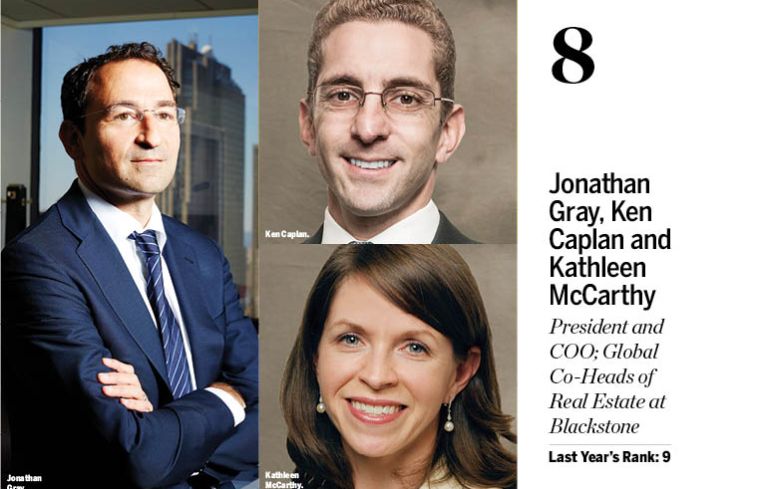
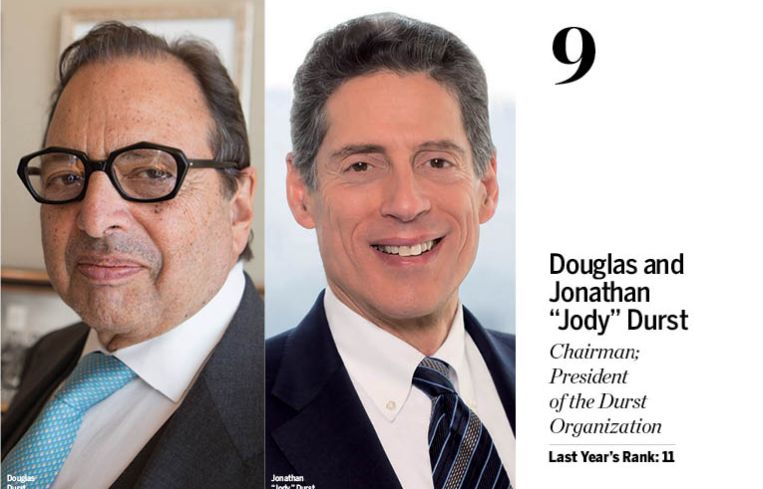

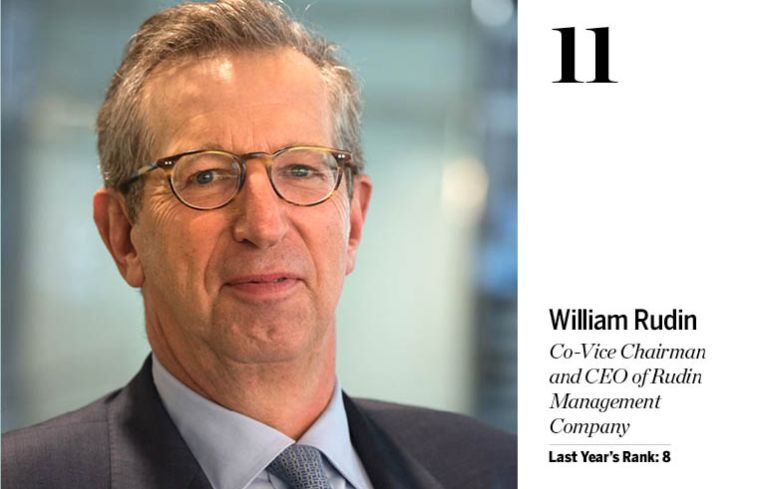
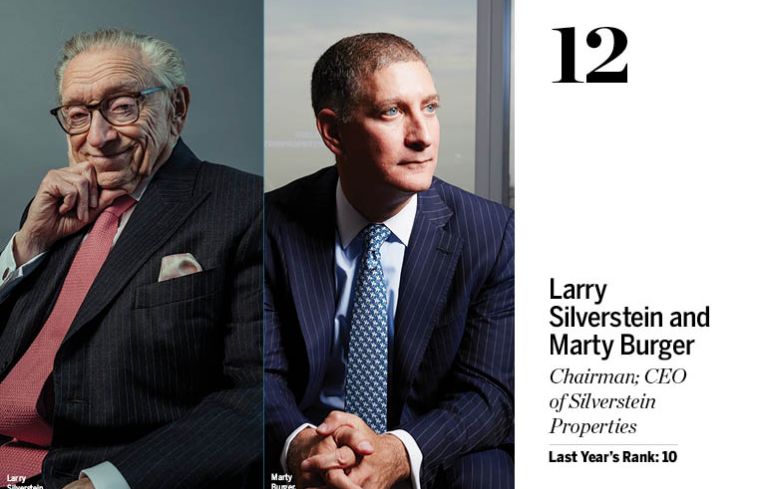


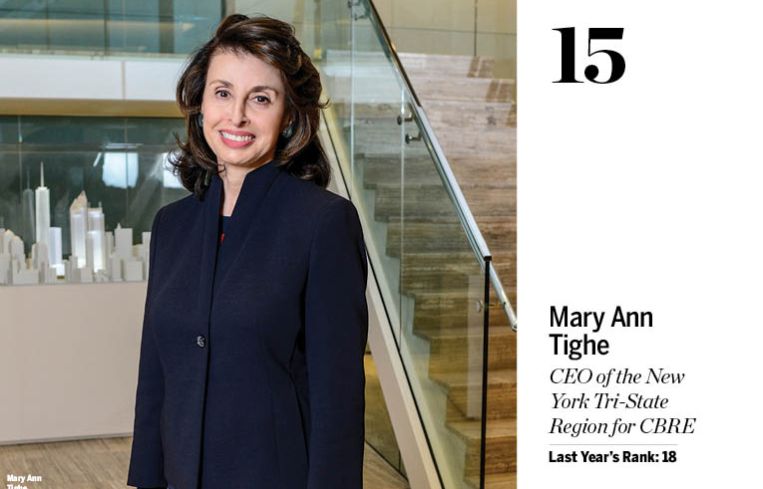

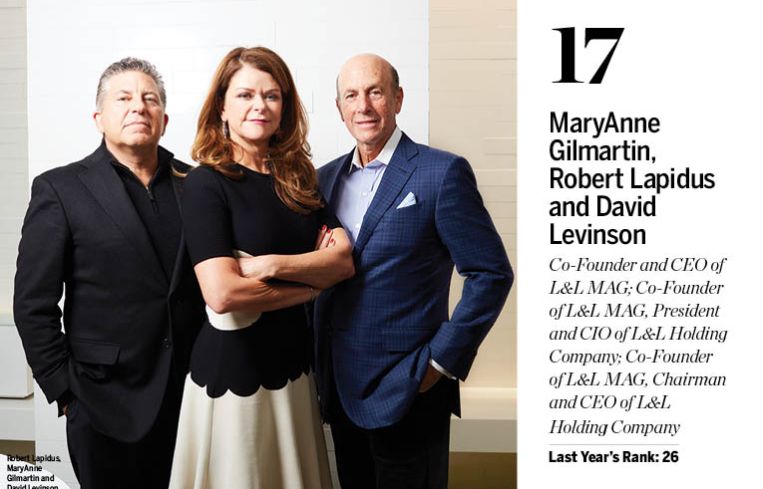
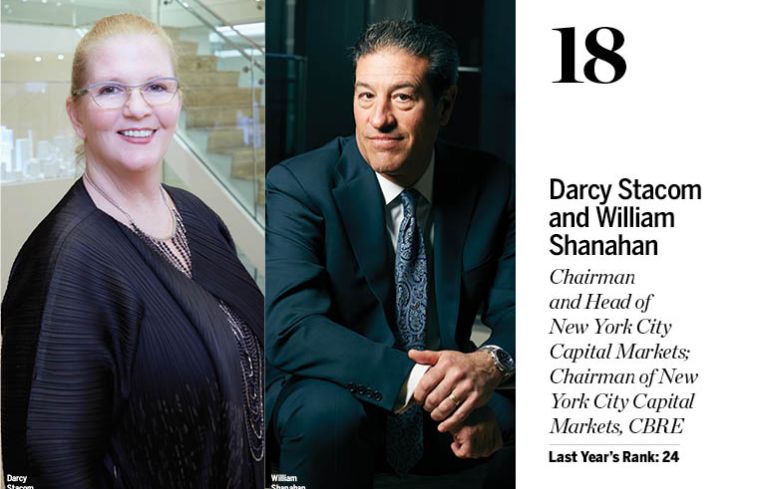
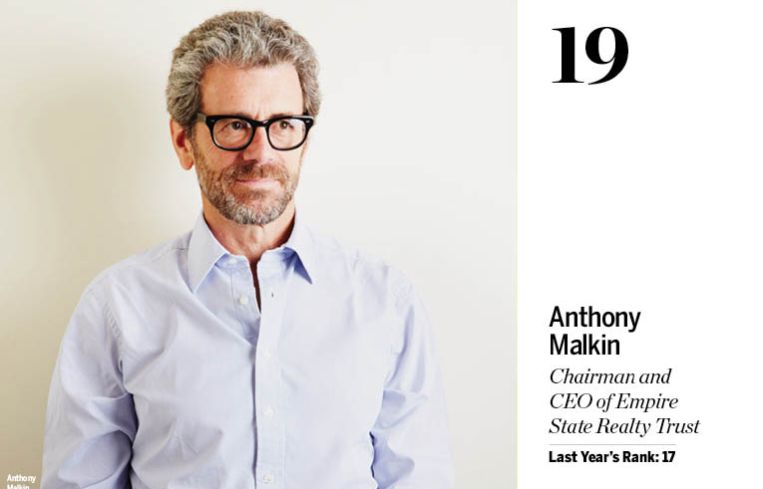
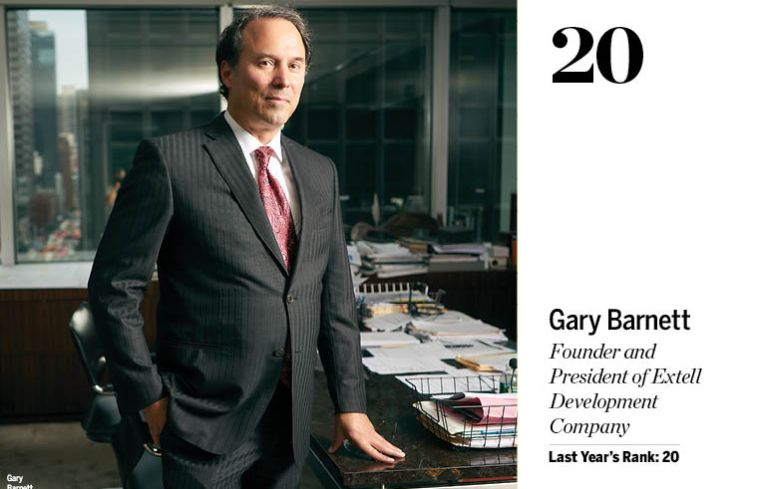

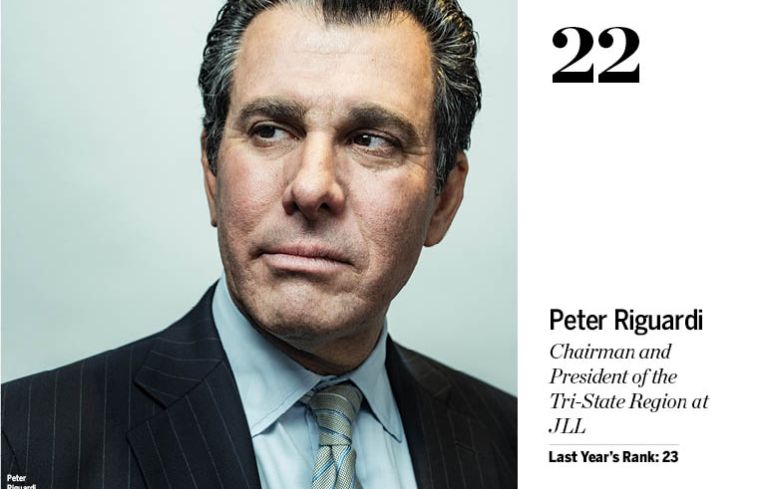
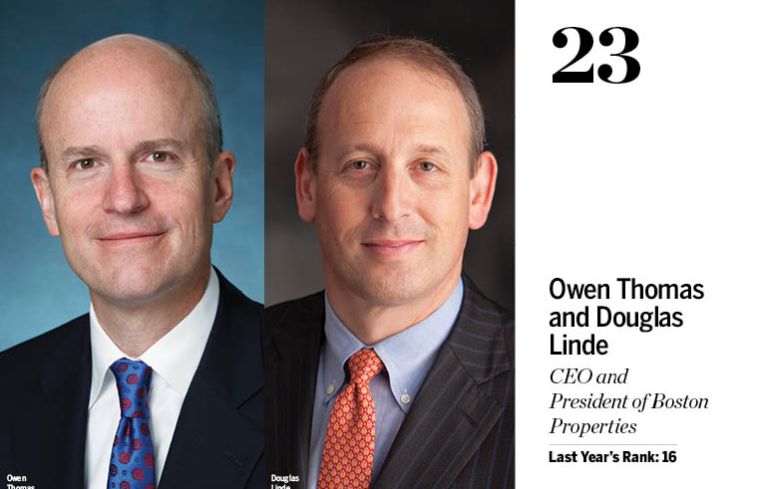
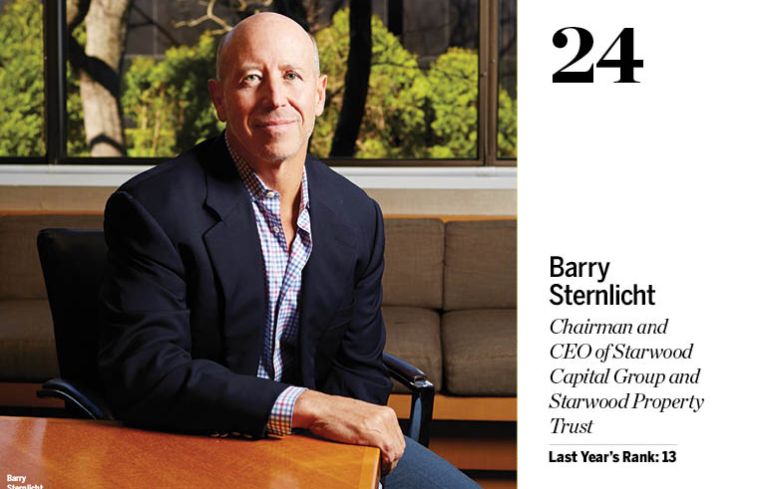
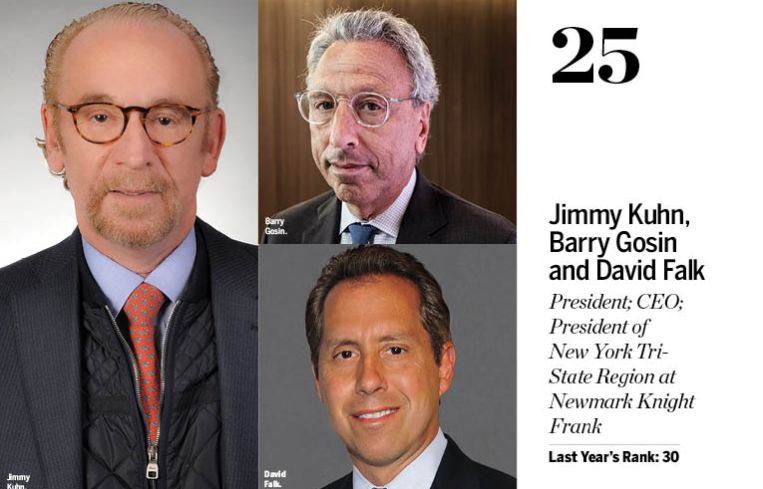



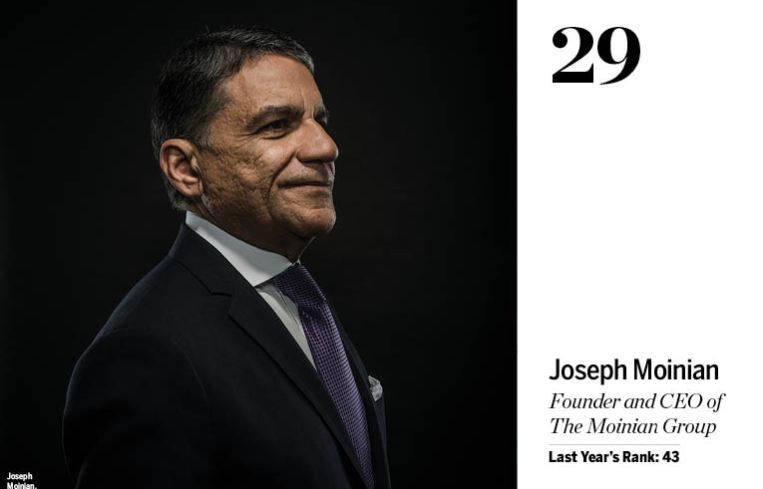
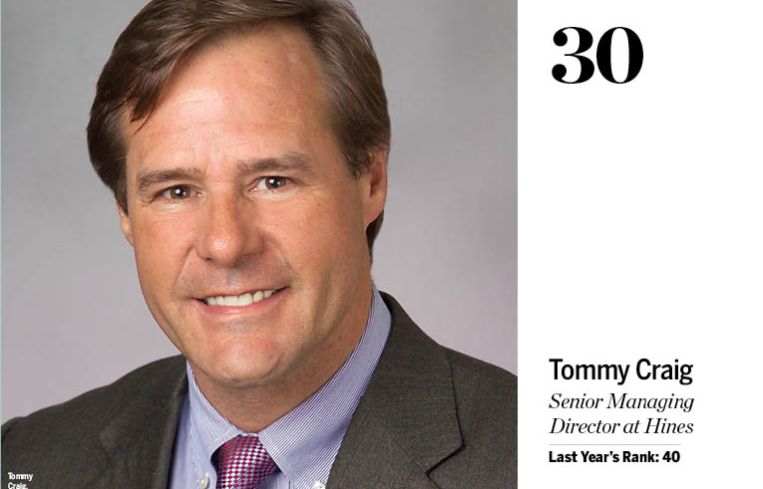


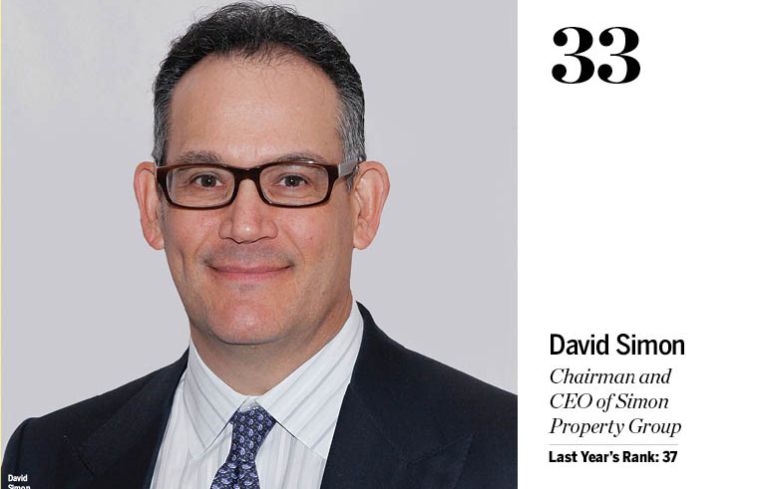

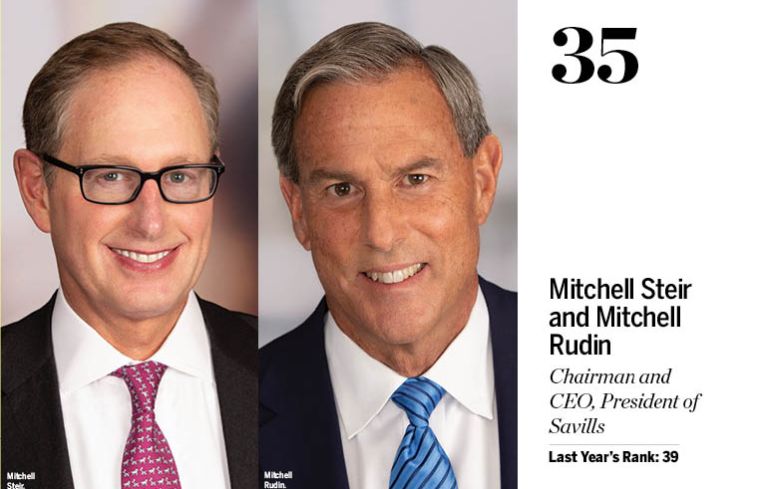
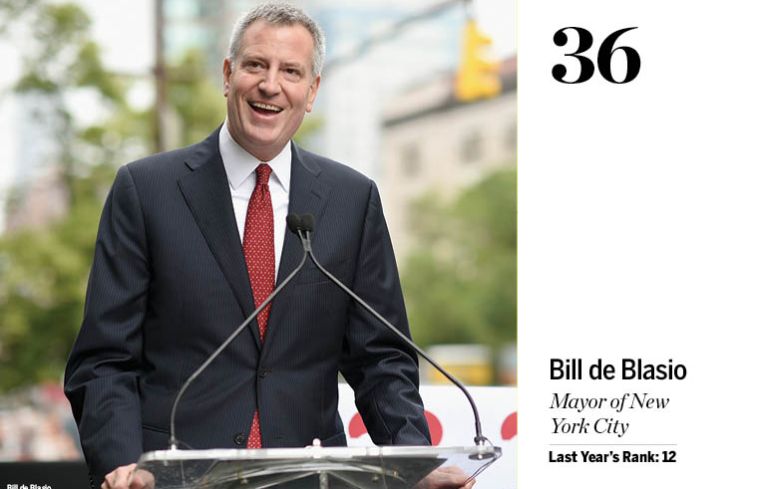

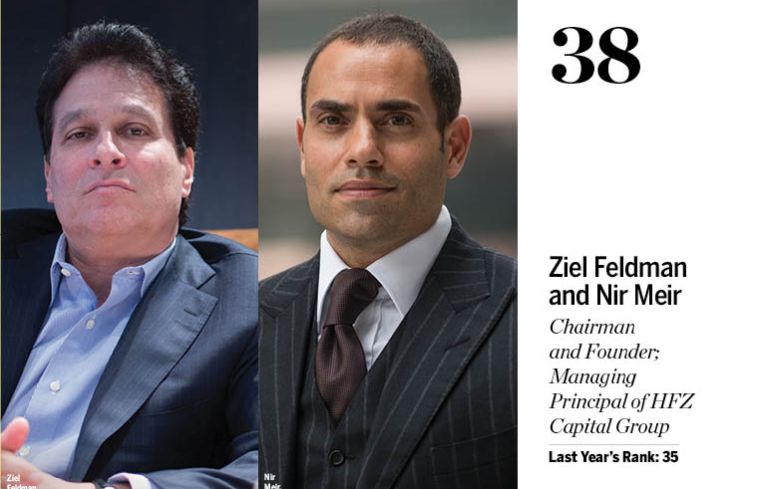
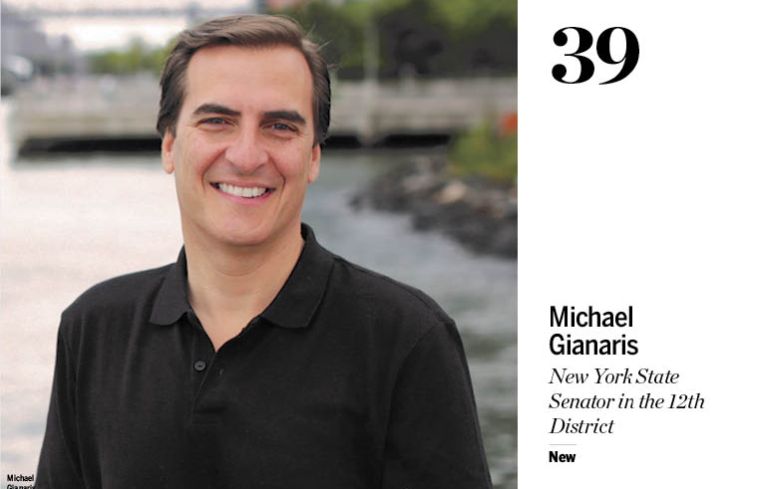
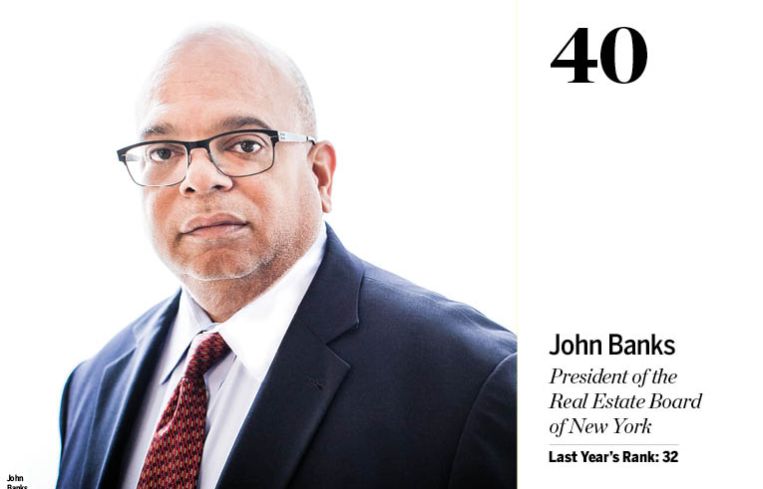

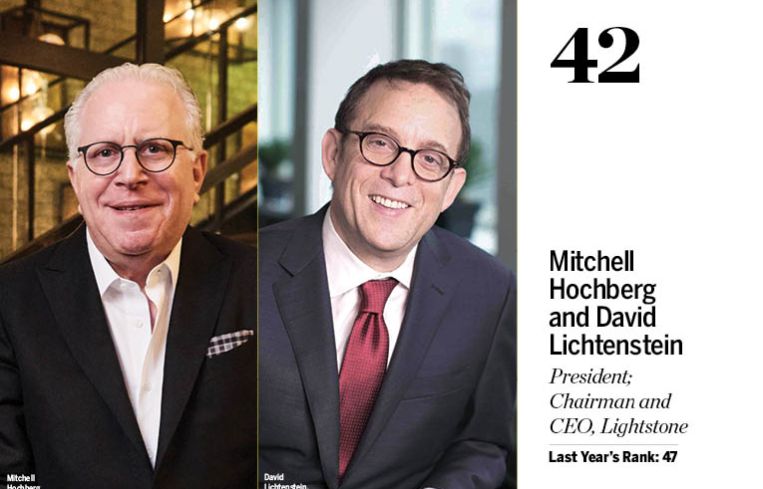
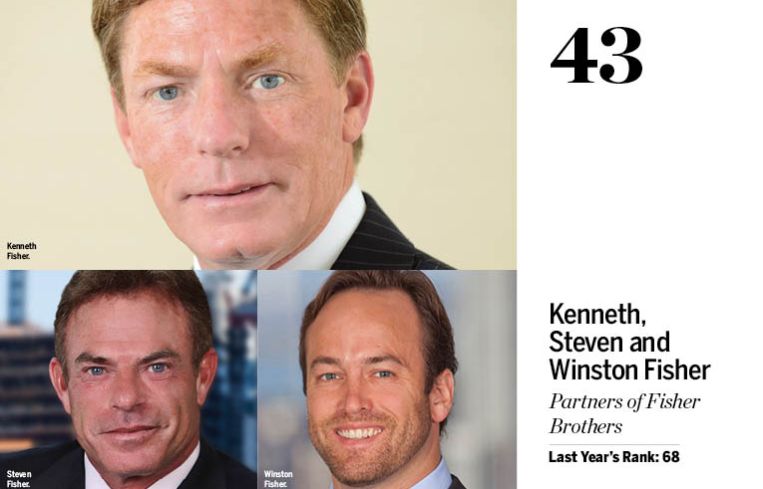

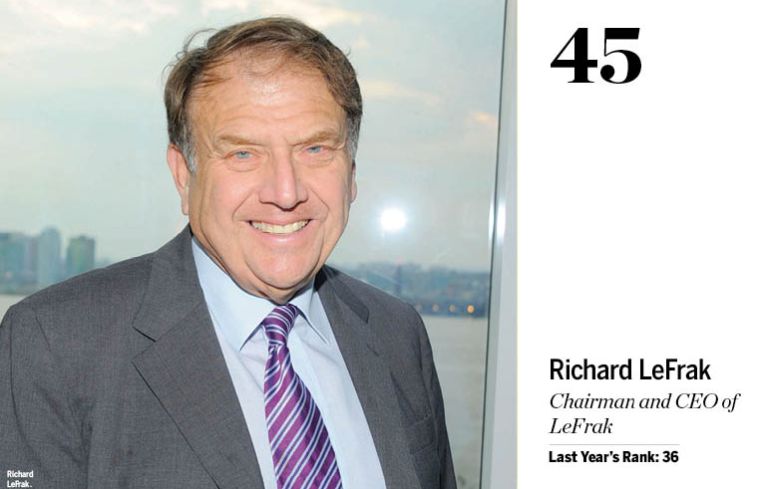
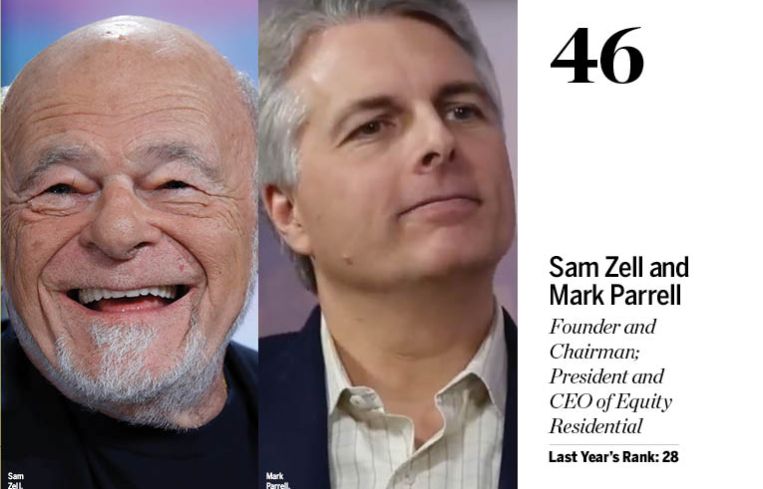
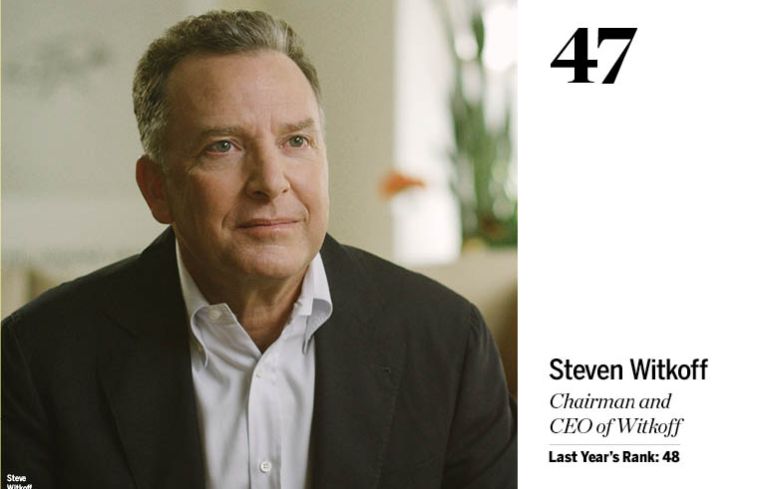

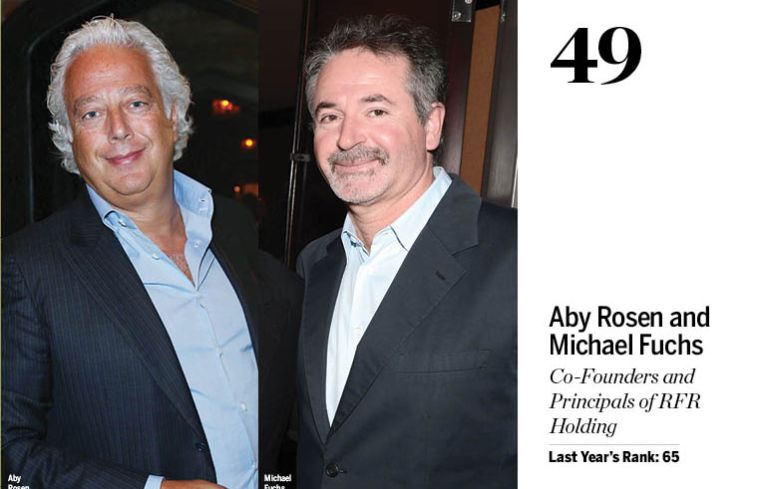
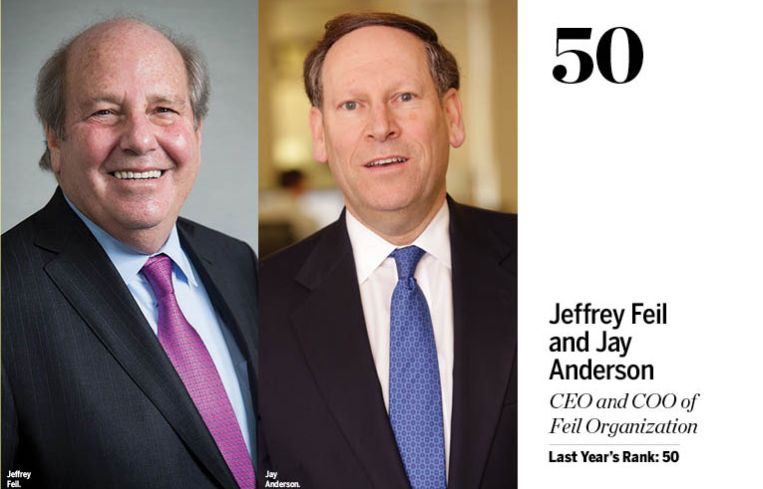
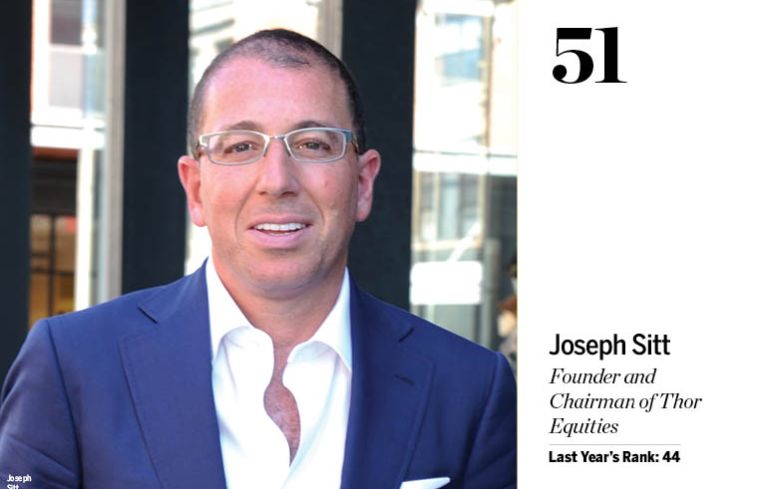
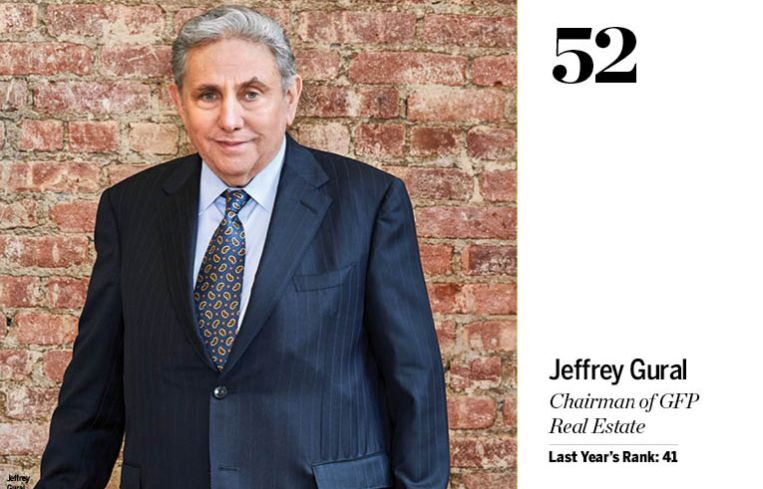

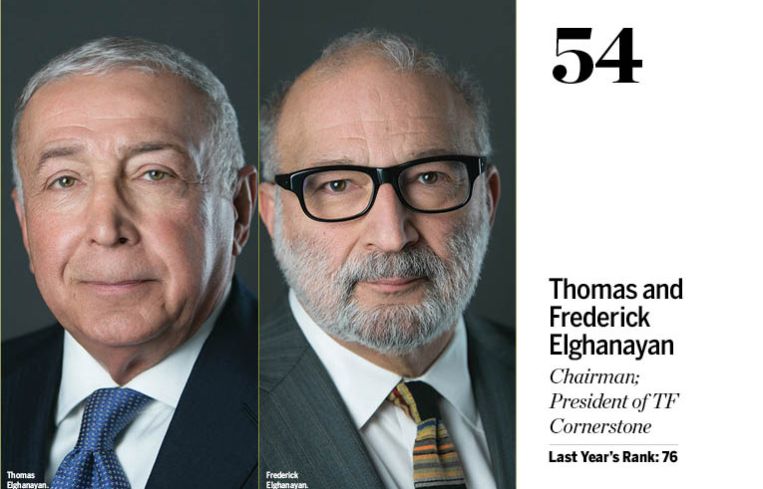
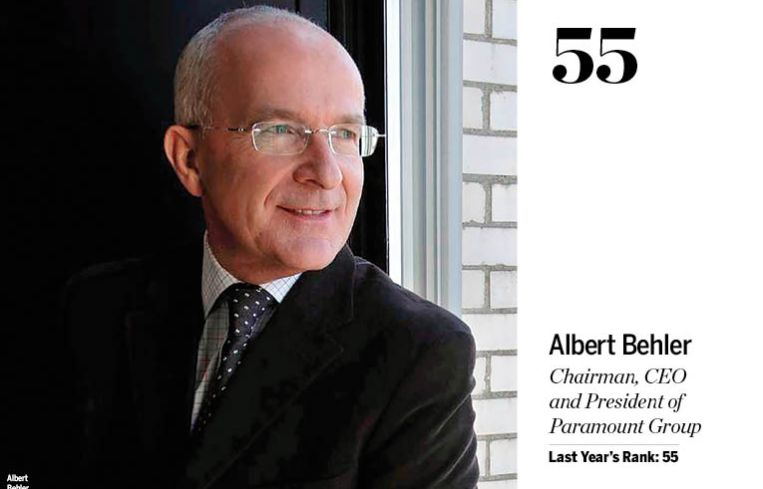

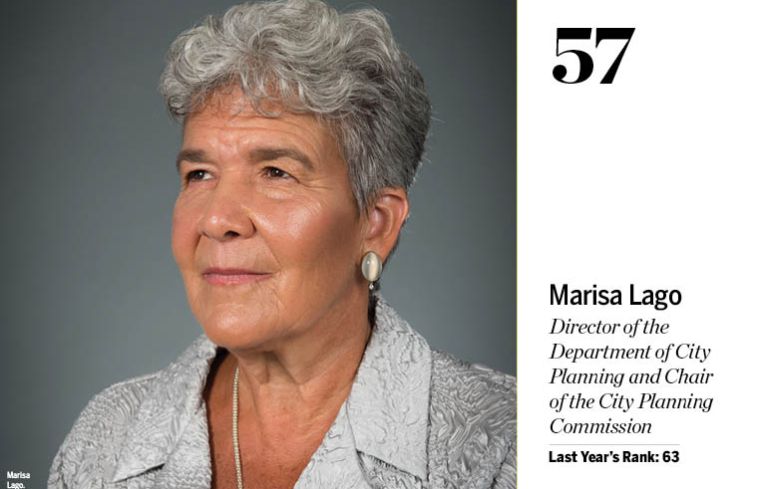
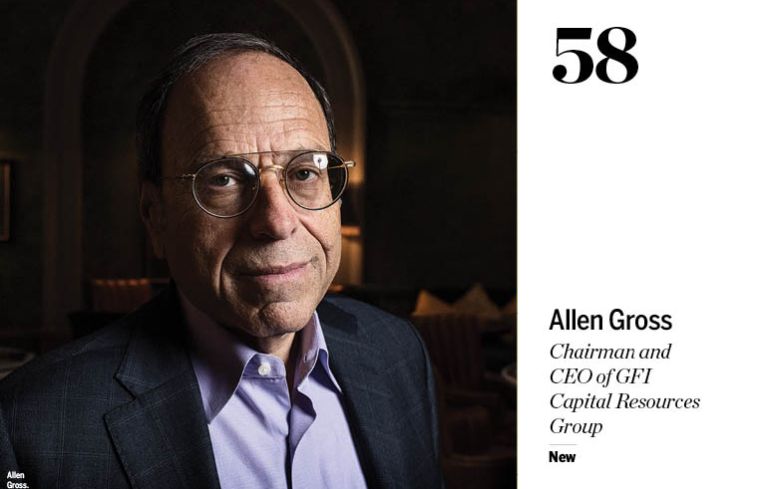


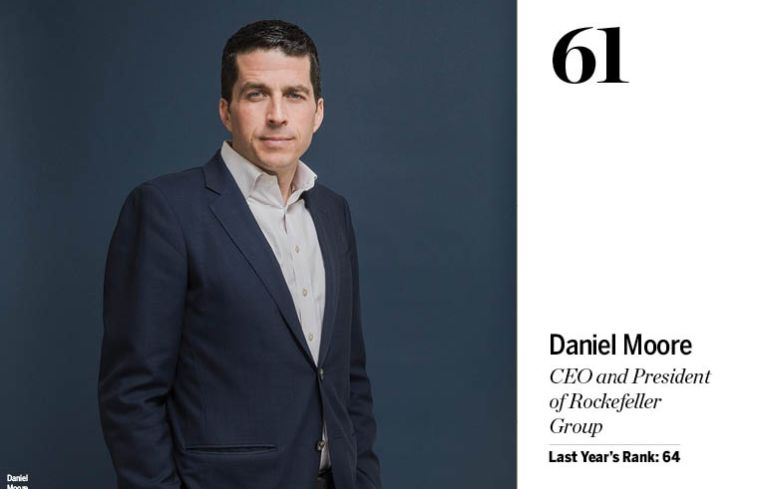
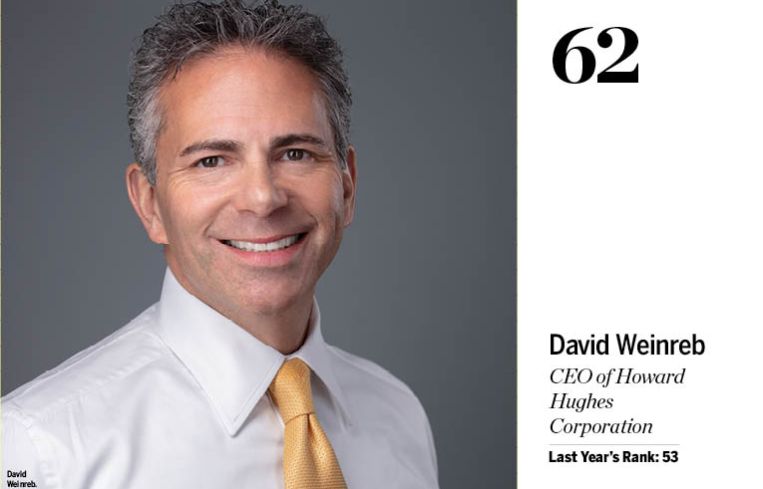
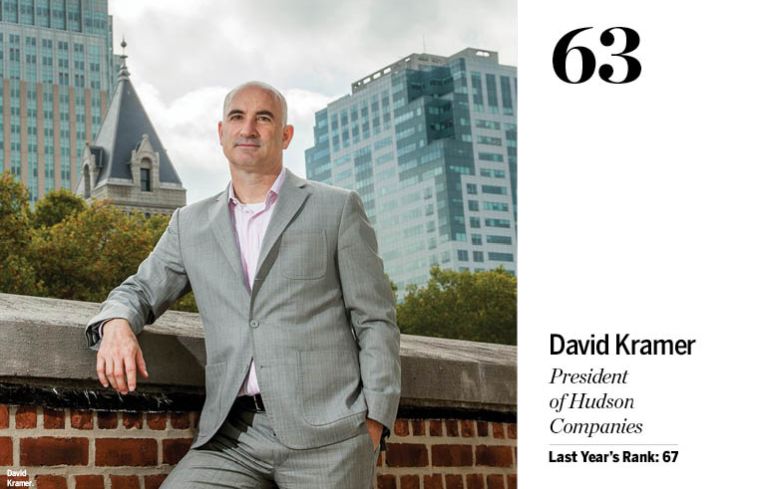
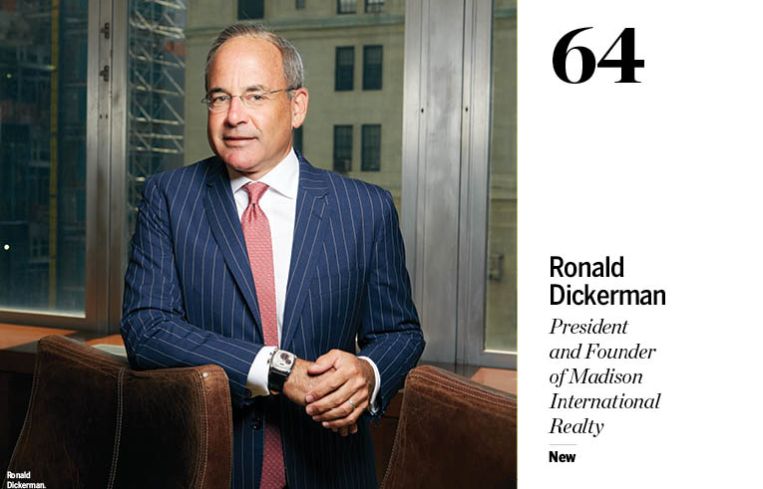
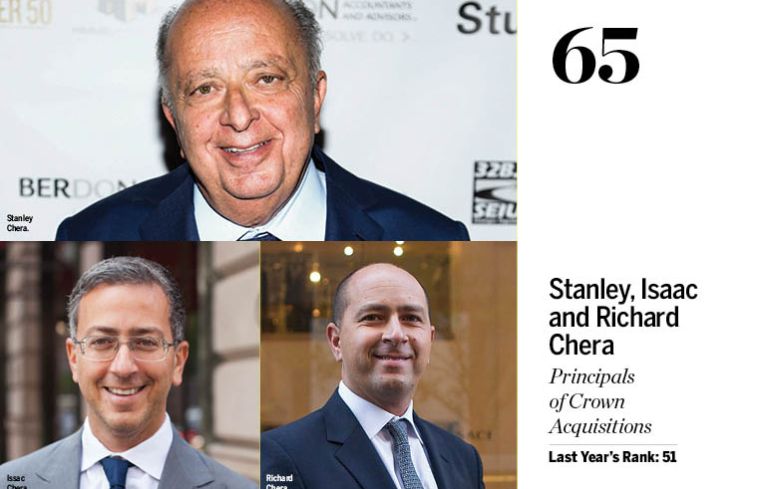
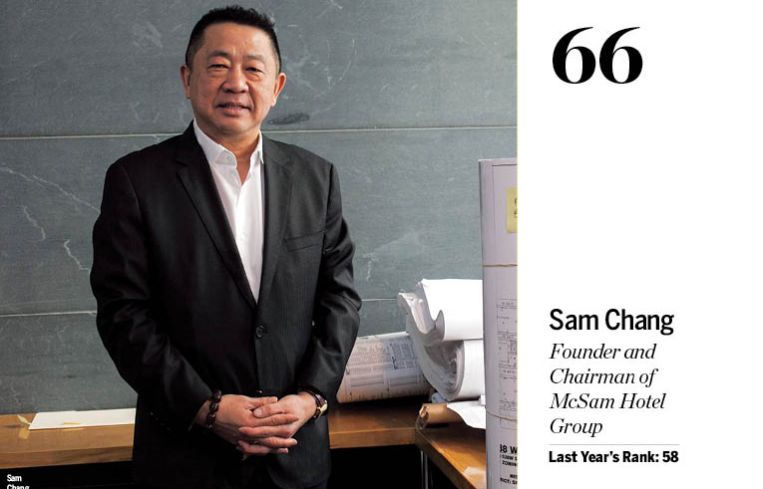
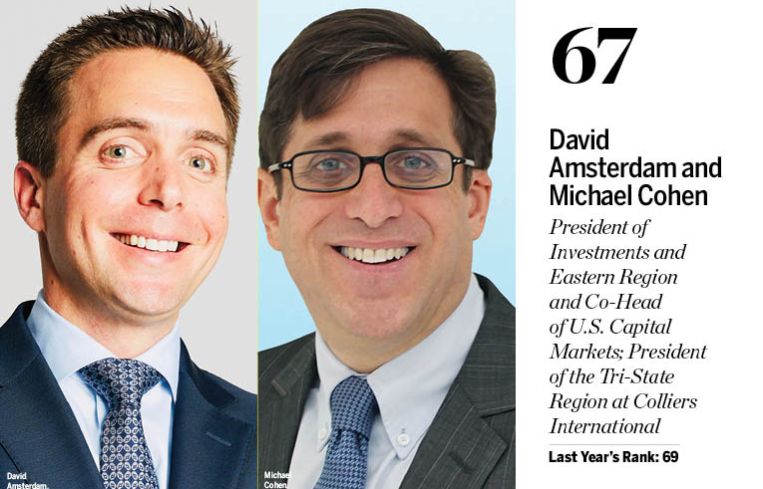
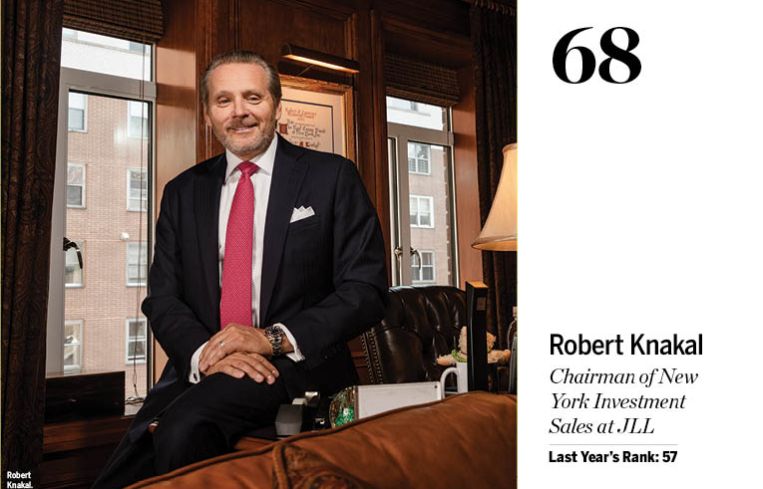
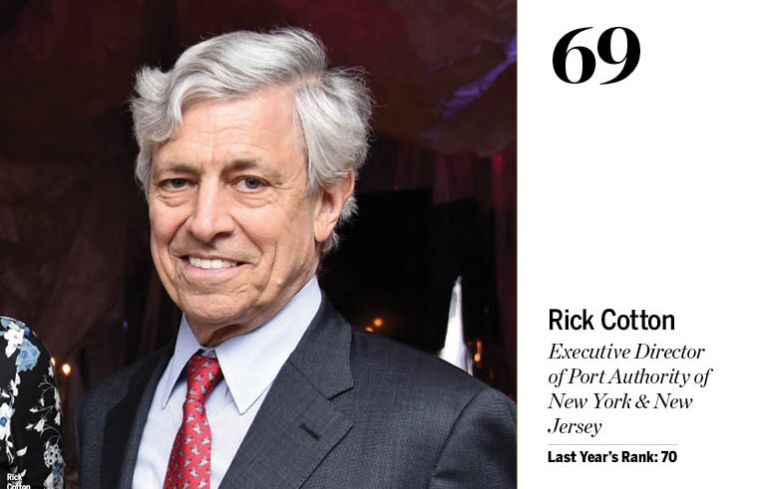

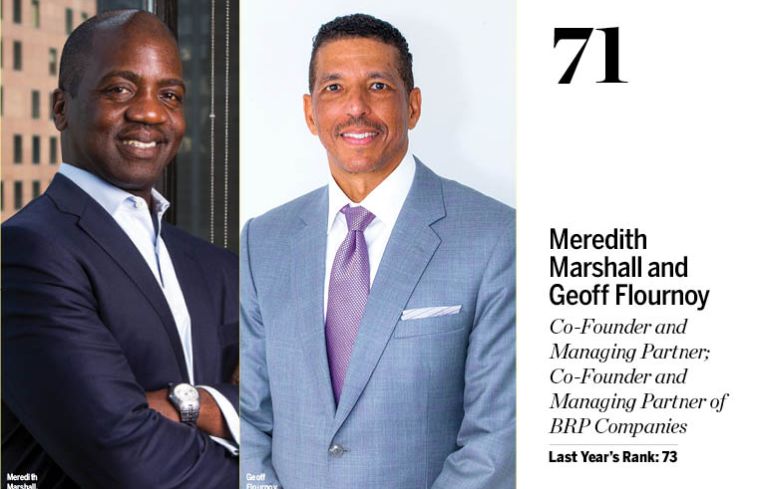
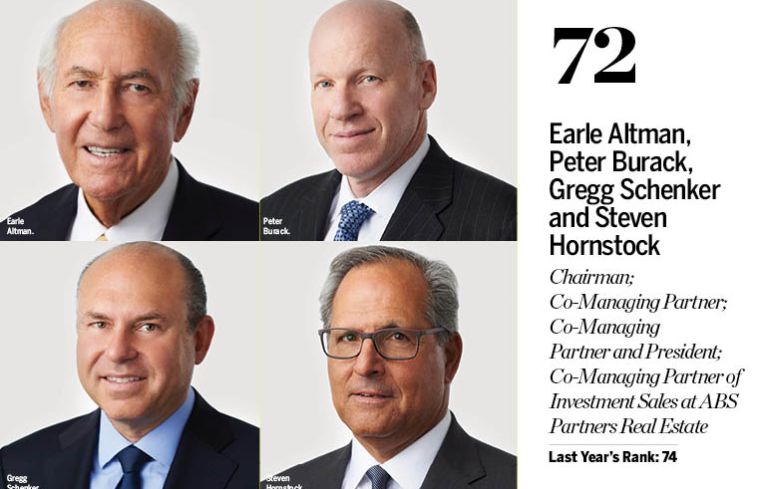
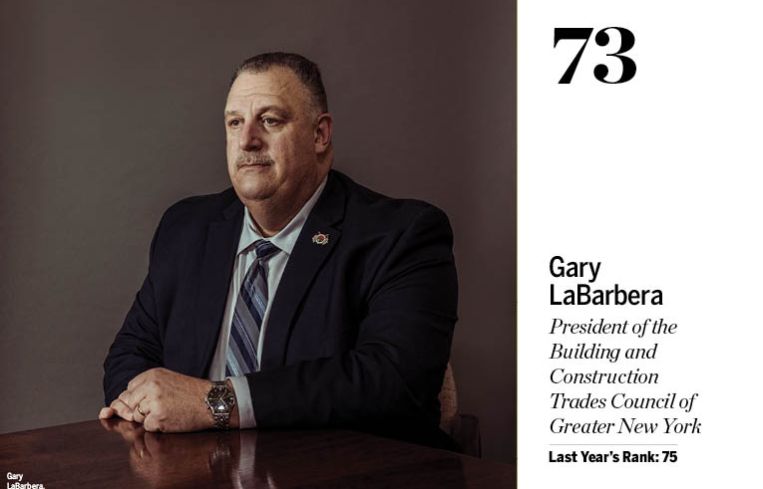
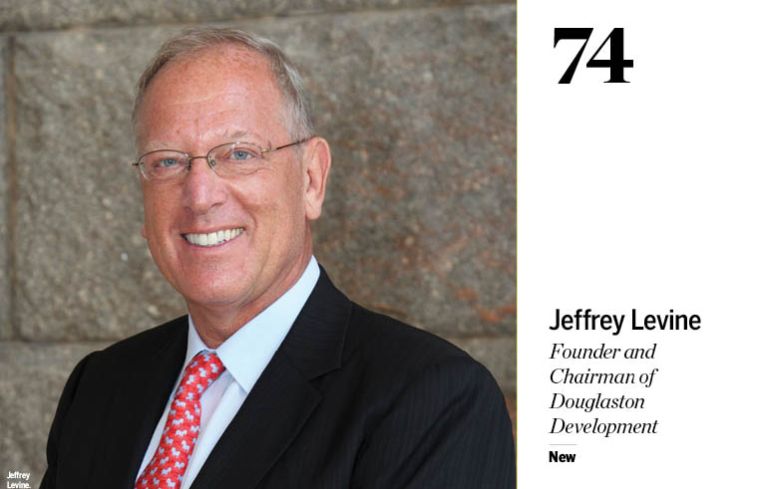
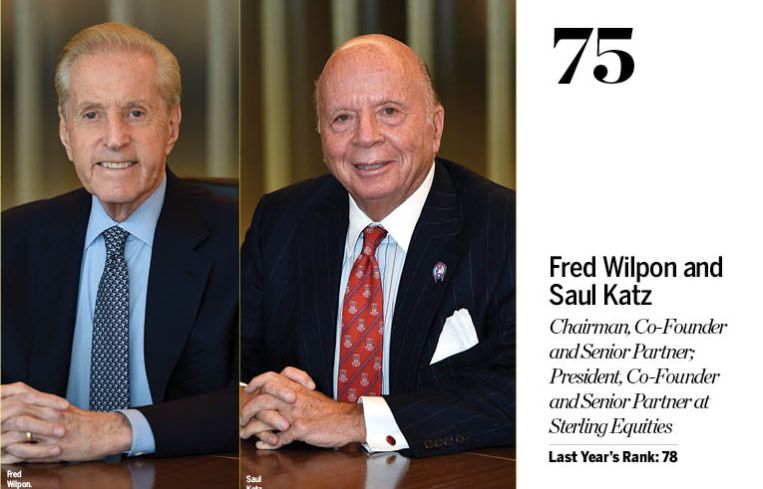
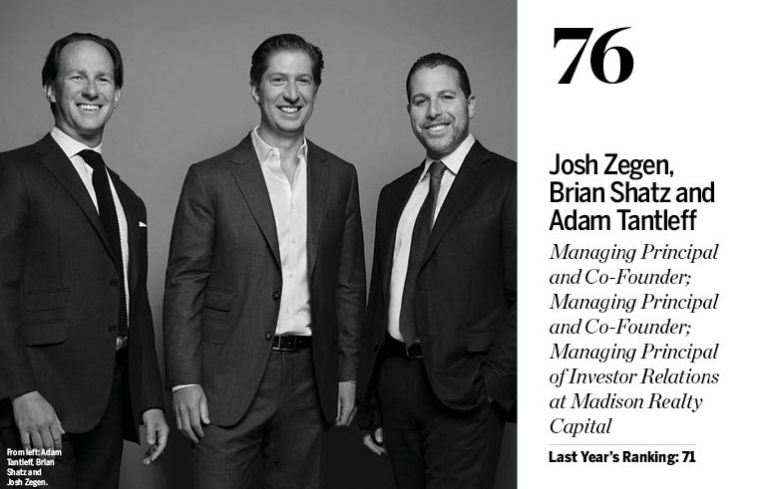
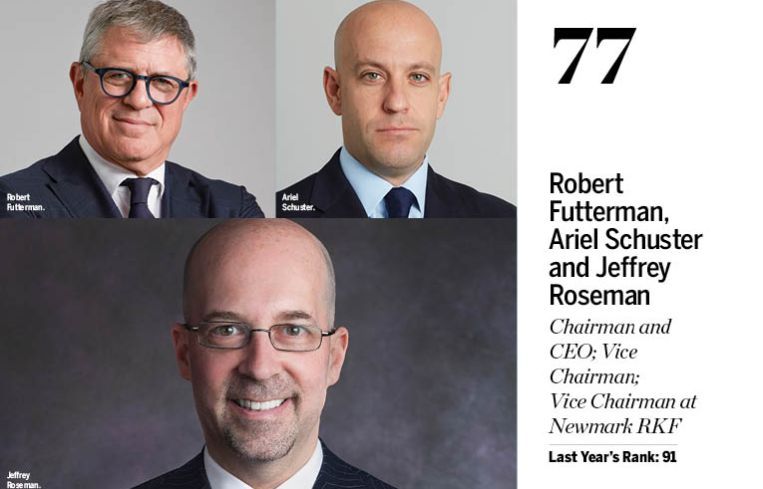
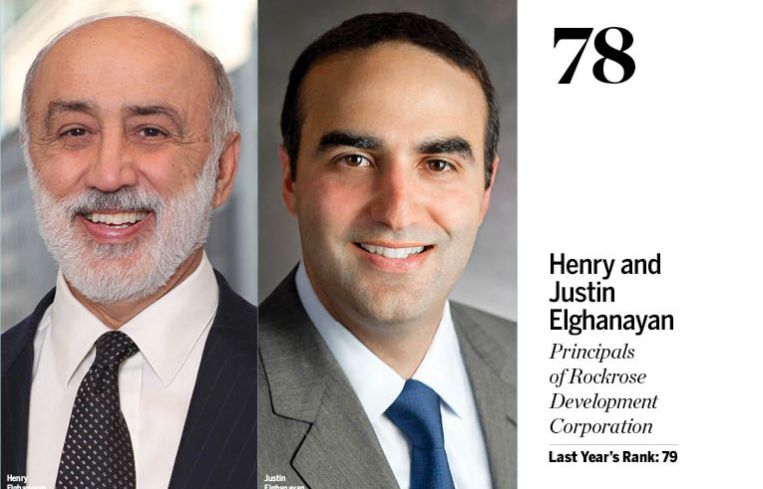

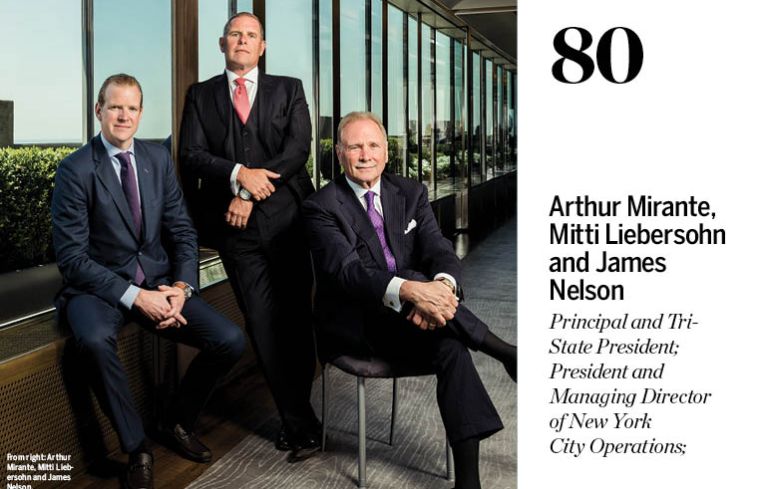
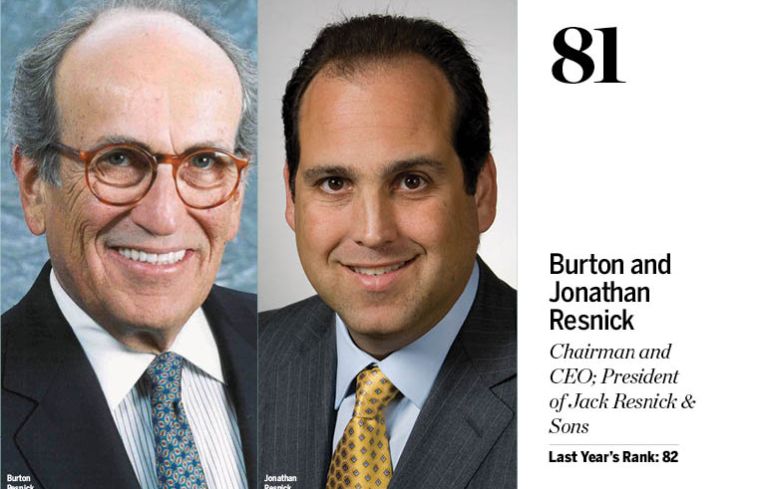
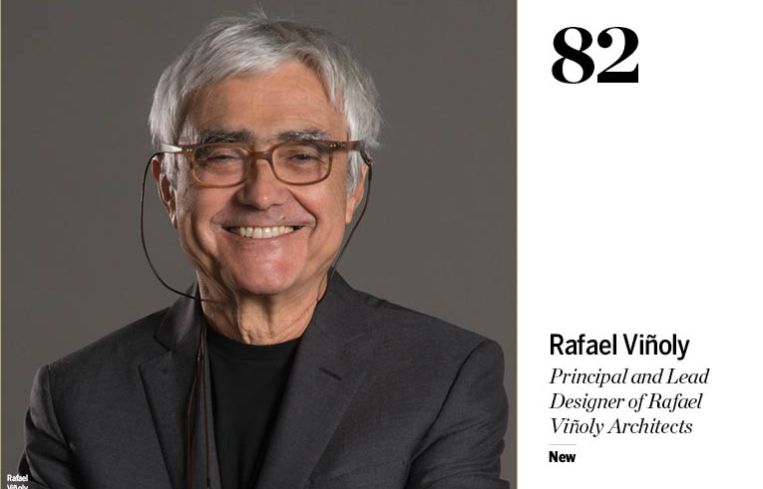
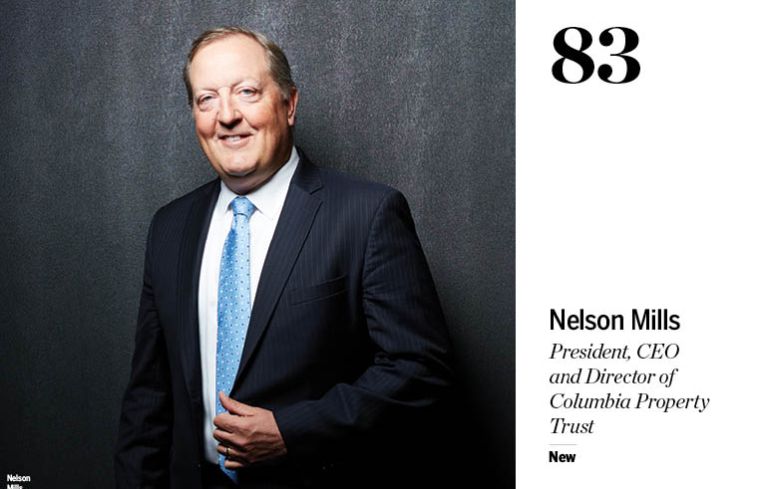
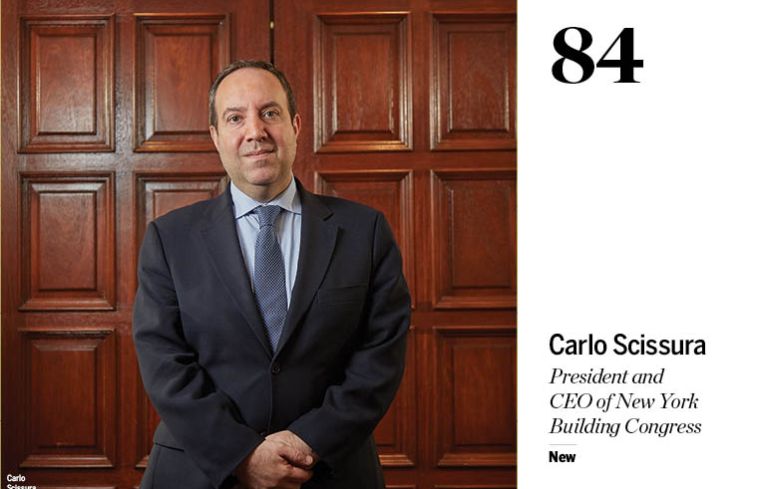

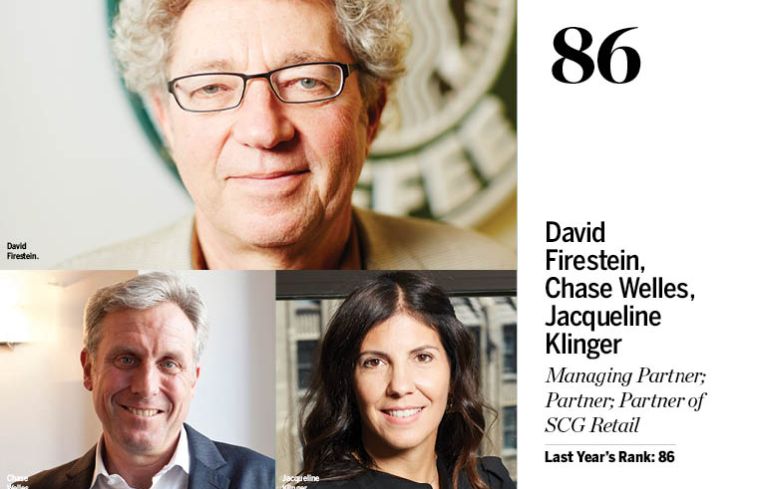

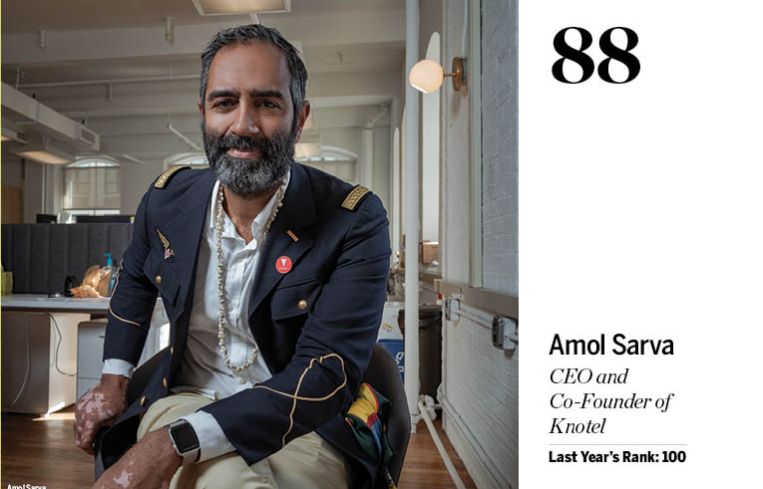

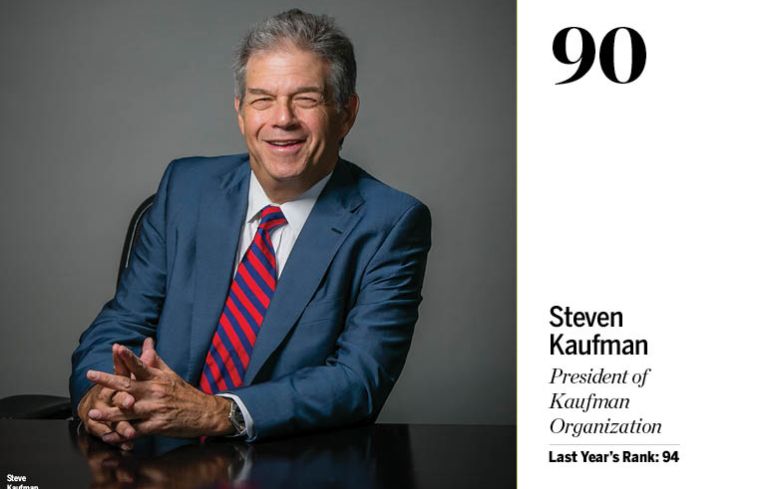
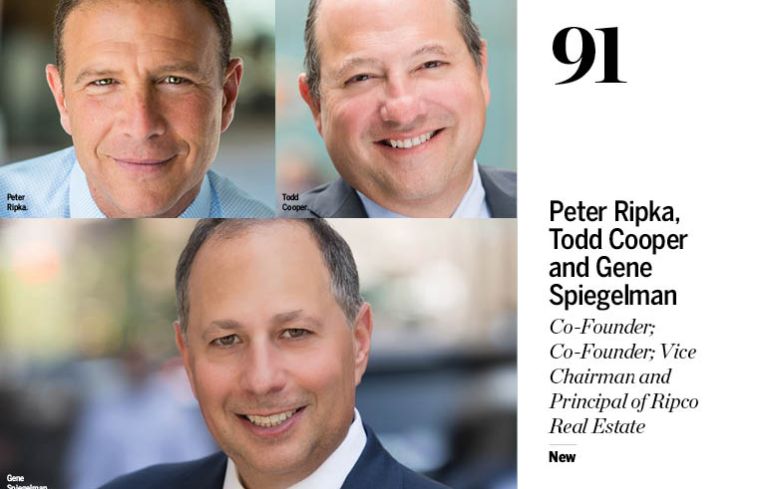

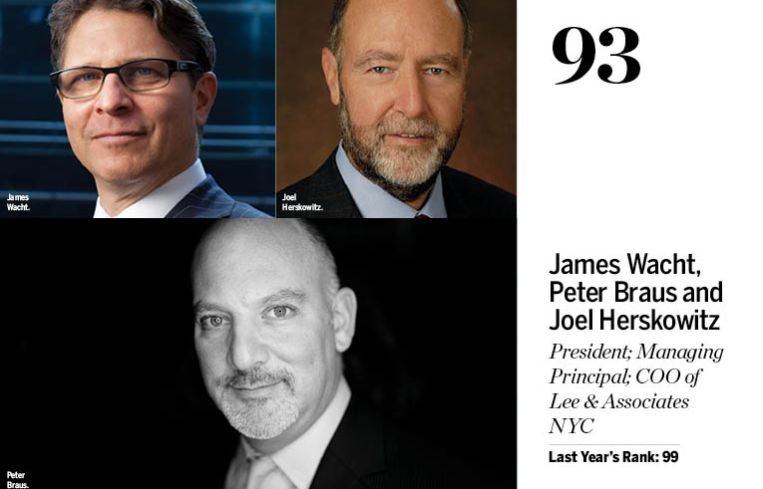
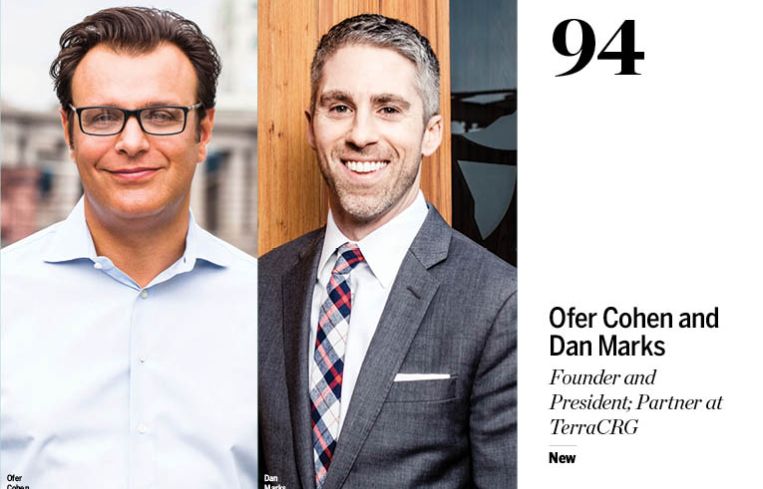
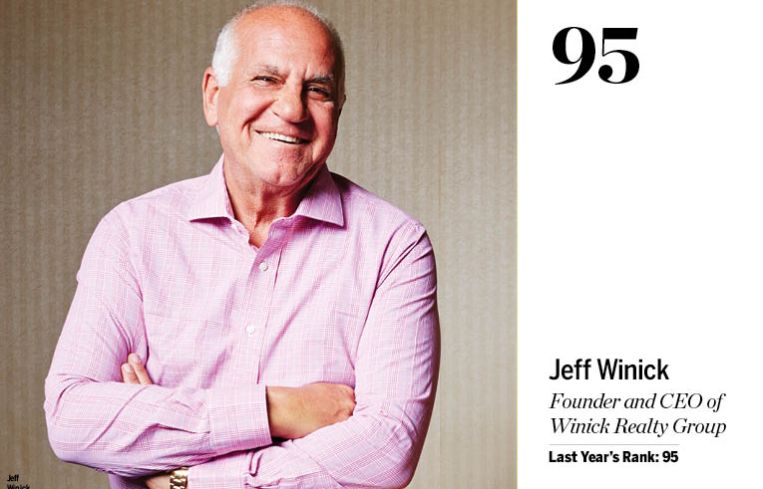
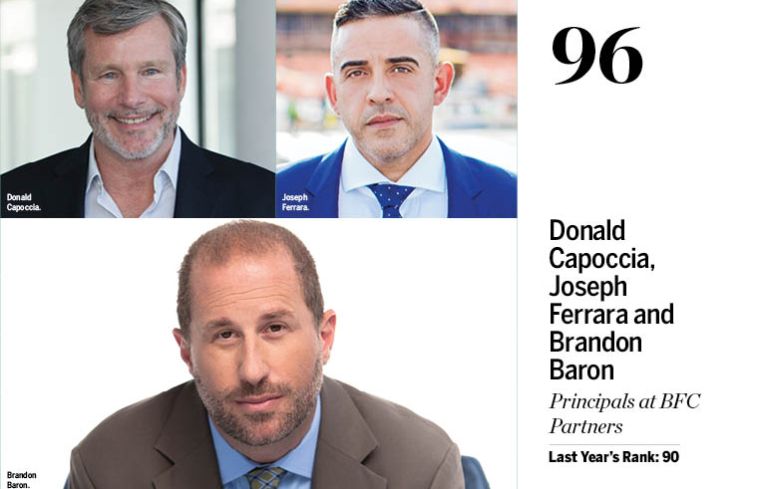
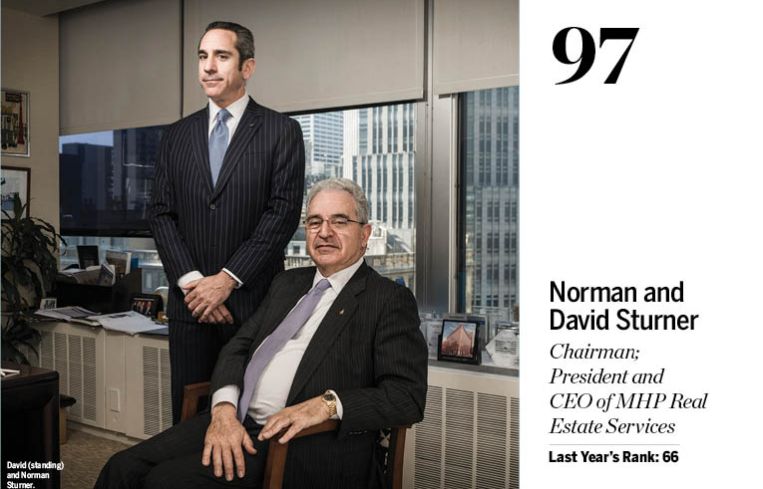
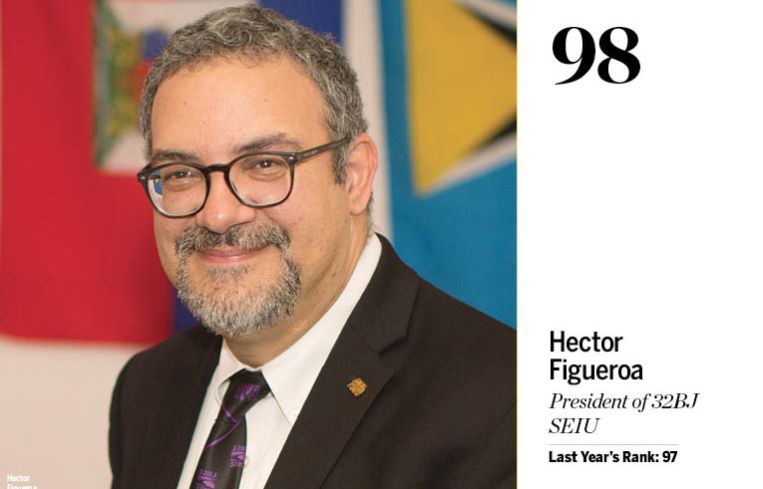
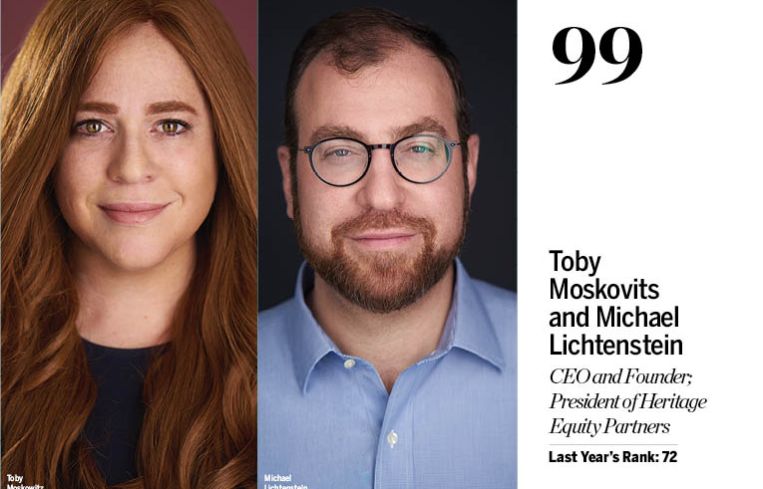
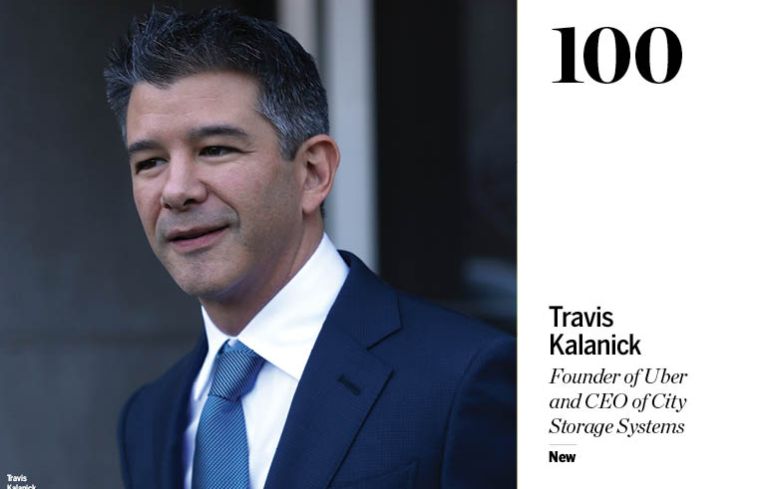
As Marc Holliday began explaining all SL Green Realty Corp. had done in the last year, he paused.
“I don’t know where to begin.”
SL Green had a banner year. It announced plans for One Madison Avenue, it took over the leasehold for 2 Herald Square,it churned out leases at One Vanderbilt and it even dipped into affordable housing.
It would be criminal if the firm landed anything short of No. 1.
But how would we live with ourselves if we didn’t give Related Companies the No. 1 spot on the year when Hudson Yards had its big debut? The naysayers were drowned out by the crowds who liked the enormous copper beehive (or whatever the kids call it). They love the shopping, the dining—even the Shed, notwithstanding the snide comparisons to airplane hangars.
Related wasn’t our No. 1 choice, either.
Last year, Brookfield Property Partners—which has been gobbling up properties and companies like it has a tapeworm—seized the title as New York City’s biggest commercial landlord. Brookfield will soon beat out Blackstone in assets under management globally, thanks to buying Oaktree Capital Management. We didn’t even mention the millions of square feet it unveiled at Manhattan West. We felt that was worth a lot.
Last year was, in essence, an embarrassment of riches for the real estate industry. These are the top players.—Max Gross
The 2019 Power 100 Issue:
Welcome to the List
The Bezos Factor: Who Fell a Few Rungs Thanks to Amazon
Biggest Jumps
Power Landlords: The Guys Who’ve Got the Biggest Portfolios in New York
Power Designers: The Most Powerful Eyes in the Business
1. Ric Clark and Brian Kingston
Chairman of Brookfield Property Group and Brookfield Property Partners; CEO of Brookfield Property Group
Last Year's Rank: 1
The Far West Side is largely considered Related Companies territory. But it really shouldn’t be.
Brookfield Property Partners has Manhattan West, which, when complete, will span 7 million square feet across six buildings, including 5.5 million square feet of offices, a Pendry Hotel, residential units and retail.
In the past year, the company has completed leasing its 1.5-million-square-foot 5 Manhattan West as well as its 200,000-square-foot Lofts at Manhattan West. And at 1 Manhattan West, which is slated to open in the fall, there are only seven or eight floors left for lease in the 2-million-square-foot, 67-story office building. The company has notched high-profile tenants at Manhattan West including Skadden Arps, accounting firm EY, the National Hockey League, Amazon, J.P. Morgan Chase, a Peloton flagship, a Whole Foods market and a Danny Meyer restaurant.
But its leasing, as impressive as it is, is not the whole story.
“We are now New York City’s biggest commercial landlord,” Ric Clark said.
It’s a status Brookfield already enjoyed in Los Angeles, Houston, London, Toronto, Calgary and Perth, according to Clark.
One of the “big things that moved the needle” for the company, he said, was acquiring Forest City, a July 2018 $11.4 billion deal (including debt) which gave Brookfield an additional 11 million square feet of office space (and 18,500 apartments) in the U.S., 5 million of which (and 2,500 apartments) is in New York City. Brookfield’s worldwide portfolio spans 450 million square feet. Clark credited Brian Kingston with sealing the Forest City deal.
And don’t forget, early last year Brookfield acquired GGP in a $9.3 billion cash deal, also due to Kingston’s handiwork. (That included 125 malls, or as a Brookfield Properties spokesman indicated, “8 percent of the high-quality retail space in the country.” In Gotham alone, that deal gave Brookfield more than 2 million square feet of retail.)
Brookfield will soon beat out Blackstone in assets under management globally. When Brookfield’s purchase of a 62 percent majority stake in Los Angeles-based global asset management firm Oaktree Capital Management for $4.8 billion closes, it will bring Brookfield to $475 billion in assets under management. (Blackstone has $472 billion, as per its fourth-quarter 2018 filing.)
Brookfield’s U.S. multifamily business, which did not exist eight years ago, grew to $17 billion last year, covering 67,000 units within 225 properties. And its total real estate assets under management climbed to $188 billion worldwide in 2018, up $40 billion over the last two years. And parent company, Brookfield Asset Management, one of the world’s largest alternative investment managers, has kicked off 2019 with a bang, closing its largest global real estate fund, Brookfield Strategic Real Estate Partners III, at $15 billion.
And last August, Brookfield assumed operations of the troubled 666 Fifth Avenue via a 99-year ground lease with Kushner Companies. Part of the 2019 mission is to “launch the redevelopment plan for 666 Fifth and re-tenant it,” said Clark, who led the deal. Plus, Brookfield will pursue tenants at its 2-million-square-foot 2 Manhattan West, a spec office building on which the firm launched construction.
All this adds up to a choice spot on the Power 100. The most choice. Number one.—L.E.S.
2. Stephen Ross, Jeff Blau and Bruce Beal
Chairman and Founder; CEO; President at Related Companies
Last Year's Rank: 3
After more than a decade of construction, Related Companies unveiled its masterpiece in March: the $25 billion, 18-million-square-foot Hudson Yards.
“We spent the last 11 years designing, planning and executing, with all of the construction issues,” said Jeff Blau. “When you’re done you kind of think you got everything right, but you hope people will come.”
Those worries were unwarranted. With more than 100 shops and restaurants, a cultural center and an Equinox-branded hotel, the project has broken every goal the developer set for it already—visitor numbers, condominium sales, office rents and money spent in the shops—despite hearing for years that “New Yorkers hate malls,” Blau said.
“It doesn’t seem that way to me,” he said. “We don’t call it a mall; it’s urban vertical retail shopping. And it seems to be working.”
Opening Hudson Yards would be enough for most companies to earn a high spot on this list, but Related didn’t stop there. The developer inked one of the biggest leases of 2018 in December when Deutsche Bank signed on for 1.1 million square feet at the Time Warner Center (which will be renamed in honor of the bank).
Outside of New York City, Related secured the land entitlements to start work on a 62-acre mixed-use development in Chicago and a 240-acre project in California and started to expand its Equinox-branded hotels to other states.
Related announced plans in October 2018 to build $3 billion of luxury senior housing in San Francisco and New York and got into the fulfillment business when it bought Quiet Logistics this March for an undisclosed sum.
Blau said the idea for the Quiet Logistics acquisition came after hearing from digitally native brands in which Related was invested how difficult it was to find nearby warehouse spaces for last-mile delivery.
And Related shows no signs of slowing down this year. It will get to work on its mega-projects in Chicago and California while turning its attention to the 6.2-million-square-foot second phase of Hudson Yards which includes another 2 million square feet of office, 4 million square feet of residential, 100,000 square feet of retail and a 120,000-square-foot elementary school.
“We planted a lot of seeds this year and we’ll go back into execution mode next year,” Blau said.—N.R.
3. Marc Holliday and Andrew Mathias
CEO; President of SL Green Realty Corp.
Last Year's Rank: 2
SL Green Realty Corp. has a reputation that’s centered around its status as one of Manhattan’s largest and most prominent office landlords.
But in 2018, the developer first dipped its toe in a ground-up, partially-affordable residential project at 185 Broadway in the Financial District. The 31-story, 260,000-square-foot building will hold 209 units, 30 percent of which will rent at below-market rates. Contractors are currently digging the foundations for the building between Dey and Cortlandt Streets.
Of course, One Vanderbilt gets the most press, and in Midtown the steel superstructure for the 1.7-million-square-foot building has risen 1,100 feet in the air. The development is 54 percent leased and expected to be complete in August 2020, eight weeks ahead of schedule. TD Bank and TD Securities will move in as the first tenants this August. And SL Green’s work improving the subway platforms at Grand Central Terminal is 80 percent complete.
The real estate investment trust is also working on a 20-unit residential condominium project on top of a Giorgio Armani store at 760 Madison Avenue at the corner of East 65th Street, where it expects to break ground by the end of the year.
The major commercial landlord currently has six developments with more than 5 million square feet of construction in the pipeline, including a massive planned expansion at One Madison Avenue. The former Metropolitan Life Insurance Building—which is attached to the iconic clock tower overlooking Madison Square Park—will get an 18-story glass expansion designed by Kohn Pedersen Fox, bringing its footprint to 1.5 million rentable square feet.
“We’ll be completely transforming the podium with new window systems and replacing the limestone with a glass curtain wall system,” said Marc Holliday. “We have an excellent design that pays homage to the historical and architectural history of this site.”
The firm also plans to revamp a 600,000-square-foot former printing plant at 460 West 34th Street on 10th Avenue by Hudson Yards into high-end office space. It just nailed down a 212,000-square-foot lease with First Republic Bank at the property, which it entered contract to buy in December 2018.—R.B.R.
4. Scott Rechler
CEO and Chairman of RXR Realty
Last Year's Rank: 4
You could say that RXR Realty has been a wee bit busy over the past 12 months.
“We’re expanding our scope. It’s all about understanding New York and the customers of New York,” Scott Rechler said. “And, it’s fun—more time-consuming than just buying an office building—but fun.”
RXR’s lengthy list of projects includes joining TF Cornerstone and MSD Capital’s development team in building a $3 billion office and hotel tower next to Grand Central Terminal at 109 East 42nd Street; being selected to lead JetBlue’s $3 billion planned terminal expansion at John F. Kennedy International Airport; building a 1-million-square-foot last-mile distribution facility in Maspeth, Queens, and the $1.5 billion redevelopment of a mixed-use entertainment district around the Nassau Coliseum.
“The biggest theme of the past year is [portfolio] diversity,” Rechler said. “We’ve focused on investing anywhere we can create real estate solutions that help our customers and also help the community.”
While many have felt the heat of market competition in bids, RXR has more than held its own, from beating out traditional infrastructure funds for the JetBlue award to being the recipient of several off-market deals—thanks to the firm’s unique and varied development and investment expertise.
“We really focus on understanding our counterparty’s needs—whether it’s the customer or the community—and we try to do things that are win-win for the long term,” Rechler said. “It becomes a good calling card when others have challenging projects or developments in municipalities. They know when RXR is involved we’re going to do the right thing for the long term so that they’ll be successful, and that we’ll understand what their needs are and create something that meets their ultimate objective.”
Another big theme of the year for RXR was opportunity zones. As a master developer in many areas that fall into the designated zones in New York—such as New Rochelle, Yonkers and parts of Glen Cove—RXR is raising a $500 million opportunity zone fund.
“The strategy for us investing in these underserved, underperforming submarkets is consistent with what the opportunity zone program was put in place to do—to use investment to help revitalize and create economic vitality within these markets,” Rechler explained.
On the debt side, RXR’s been busy refinancing several of its properties, including an impressive double-header only two weeks ago. The company refinanced its Pier 57 redevelopment with a $375 million loan from Nuveen Real Estate, plus its 32 Old Slip office property with a $404 million loan from Mesa West Capital within 24 hours. Phew. The transactions were boosted by robust leasing activity from Google and law firm Cahill, Gordon & Reindel, respectively.
“Twenty-nineteen is not only about real estate and building the four walls but asking how do we activate what’s happening within those four walls—to maximize the experience for all of our customers and optimize the value of our properties. We’re continuing with our customer- and community-centric approach.”—C.C.
5. Steve Roth
Chairman and CEO of Vornado Realty Trust
Last Year's Rank: 6
Vornado Realty Trust is one of the real estate juggernauts that keeps on winning.
The company broke a national record last year for the most expensive home ever sold, when hedge funder Ken Griffin paid $238 million for the penthouse at 220 Central Park South. And now rumor has it that Amazon chief Jeff Bezos himself (in an ultimate trolling New York move) is scoping out a unit at the tower on Billionaire's Row.
This should be some comfort to Steve Roth. Earlier this month, in his annual letter to shareholders, Roth bemoaned New York's loss of the Amazon deal.
"Losing them was one of the stupidest damn things I've ever seen," he wrote. But not to fear, Vornado still came out a winner. A Vornado spinoff called JBG Smith is the largest property owner in Crystal City, Va. Amazon's new headquarters location, and Vornado shareholders received a 75 percent stake in that company when it was created.
"I, our senior management team and our board still retain every share that we received in the spin," Roth said.
Amazon aside, Vornado continued to move forward on several fronts in New York City, where it controls a portfolio spanning 26.8 million square feet.
According to Roth's letter, the proceeds from 220 Central Park Tower, which so far total $665 million for 23 units, will go towards the continuing work on the real estate investment trust's 9-million-square-foot portfolio along West 34th Street in the Penn Station area.
With Hudson Yards now open to the west, Vornado's Penn Plaza portfolio is well positioned to capitalize on the increased traffic and attention to the area.
In particular, Vornado is working on a plan for a two-building campus on the top of Pennsylvania Station, spanning 4.4 million square feet and rechristened Penn 1 and Penn 2. One block over, Vornado is moving forward on the Farley Post Office, where it paid $42 million to up its ownership to 95 percent from 50 percent in October 2018. Vornado anticipates delivering the office-and-retail complex in 2020.
Its plans for the Hotel Pennsylvania, for which futuristic renderings were leaked earlier this year, are on pause, the letter states. —C.G.
6. Rob Speyer
President and CEO of Tishman Speyer
Last Year's Rank: 7
It’s one thing to have your finger on the pulse of the city’s real estate market today. But leading major development deals requires you to know precisely where the market will be years down the line—a much more impressive knack. It’s precisely that ability that Tishman Speyer has cashed in on over the last year, seeing some of its boldest long-term projects pay off in a big way.
Start with The Spiral, the 65-story Bjarke Ingels-designed office tower at Hudson Yards that Tishman Speyer announced plans for in 2016. Construction only just started last year, but that didn’t stop Tishman Speyer from signing on Pfizer to lease 800,000 square feet in the tower when construction is finished in the early 2020s. Two weeks ago, the landlord also signed on AllianceBernstein as a tenant, bringing the total preleased space to 1 million square feet.
“We’re ahead of schedule,” crowed Rob Speyer. “That’s a real validation of our decision to take some architectural risk and develop a building that’s meant for the people who actually work there every day.”
If embarking on the giant tower has turned out to be a percipient venture, you can say the same for the company’s Jacx project in Long Island City, Queens, a 1.2-million-square-foot creative office complex set for completion this summer. Deals there with Macy’s, Bloomingdale’s and WeWork have enabled Tishman Speyer to fully prelease all the available space in one of the neighborhood’s first new office buildings in decades. Amazon Schmamazon.
“There were a lot of skeptics, but Long Island City has played out even more robustly than we expected,” Speyer said.
LIC is also an important residential sandbox for Tishman Speyer: The company is building Jackson Park there, a multifamily development with 1,800 rental units. All in all, Speyer said the company has 7 million square feet under development in the five boroughs.
“It’s the most activity in our history,” he boasted.
All of that raises an obvious question for such a prescient builder: Which neighborhoods is Tishman Speyer betting will be the next Hudson Yards or Long Island City?
Speyer responded the way any savvy developer would—by pleading the fifth.
“I can’t tell you that, man!” —M.Grossman
7. Jed Walentas
CEO of Two Trees Management
Last Year's Rank: 18
Jed Walentas’ vision for the Williamsburg, Brooklyn waterfront is taking shape.
Walentas’ Brooklyn-based Two Trees Management, which manages a real estate portfolio worth north of $4 billion, is making headway on its megadevelopment at the site of the former Domino Sugar Factory, which will transform a large chunk of the neighborhood.
“I think we figured out a way to create a business where our objectives and goals really align incredibly well with the communities where we work,” Walentas said. “It makes it way more fun to come to work every day when you’re not choosing between what you think is in your interest and what’s in the public’s interest.”
The new Domino Park, which stretches along the waterfront, opened in the summer of 2018, as did the first of the four buildings planned for the site, Shop Architects’ two-legged 325 Kent Avenue. The 522-unit building is fully leased, and the retail component opened with Misi, a nearly impossible-to-get-into restaurant from Michelin-starred chef Missy Robbins, sandwich shop Mekelberg and Modern Chemist, among other tenants.
Two Trees broke ground on the second building at the site, CookFox Architects’ 1 South First, and the skeleton is now fully formed, with the skin rising over it. The office and apartment building is scheduled to open at the end of 2019.
Two Trees also completed the lease-up at 300 Ashland Street, a 379-unit rental building in Downtown Brooklyn, secured 140 office leasing deals comprising over 250,000 square feet and was instrumental in bringing the Downtown Brooklyn Arts Festival to Downtown Brooklyn.
Walentas said, at the moment, his firm is primarily occupied with the design of the final two Domino buildings.
Two Trees also has holdings in Manhattan, including the 864-unit Mercedes House in Hell’s Kitchen, and the tech-friendly office building at 50 West 23rd Street in the Flatiron District.
He also said, since his company is independent, with no partners or institutional money, he’s able to answer only to himself and the public.
“It’s only me making decisions,” Walentas said, “so I get to decide,”—C.G.
8. Jonathan Gray, Ken Caplan and Kathleen McCarthy
President and COO; Global Co-Heads of Real Estate at Blackstone
Last Year's Rank: 9
New York City may have lost out on an e-commerce windfall when Amazon backed out of plans to open a new headquarters here last year, but that doesn’t mean Blackstone, one of the largest global landlords headquartered in the Big Apple, is missing out on the internet retail action.
Flexing its muscles as one of the best-capitalized real estate investment shops in the world, Blackstone, through its real estate investment trust, laid out $1.8 billion last March to buy a 22-million-square-foot industrial portfolio spread across the country—last-mile-distribution facilities that count Amazon as a key tenant.
But even that was small potatoes compared with its acquisition of Gramercy Property Trust, a $7.6 billion deal which closed in October 2018 that added 81 million square feet of industrial buildings from coast to coast.
“We’ve been very active in the logistics space,” Ken Caplan said. Quite the understatement.
A common thread that unites Blackstone’s diverse ambitions—the firm invested about $20 billion in real estate last year, as per Caplan—is to buy buildings where it’s hard to build new ones, eliminating the threat of oversupply. That’s why Blackstone also went on a shopping spree in 2018 for premier Hawaiian resorts. It spent $1 billion early last year on the Grand Wailea in Maui and finished the year by adding another luxe lodging along the island’s relatively scarce developable beachfront, the Ritz-Carlton Kapalua.
“It is hard to build hotels in certain resort markets, which has led to very limited new supply,” Caplan said. “We are buying irreplaceable hotels in some of these markets at meaningful discount to replacement costs.”
The company’s investments in New York City in 2018 couldn’t match that level of ambition, but Blackstone remains in control of heavyweight properties here as well: the massive 110-building Stuyvesant Town and Peter Cooper Village development on the Lower East Side, for one.
“We’ve really been focused on our residents and [on] enhancing the community and the whole property,” Caplan said.
One way was by adding solar panels to the complex’s roofs, a feature that helped make it the first LEED Platinum-certified apartments community in New York City.—M.Grossman
9. Douglas Durst and Jonathan "Jody" Durst
Chairman; President of the Durst Organization
Last Year's Rank: 11
The second phase of Durst Organization’s Halletts Point project in Astoria, Queens, may be stalled over a funding dispute with the city, but the family-owned development firm just opened the megaproject’s first residential building at 10 Halletts Point.
After completing just one partially affordable, 404-unit residential building, the century-old developer hopes to build four more mixed-income apartment towers at 20, 30, 40 and 50 Halletts Point, along with two entirely below-market buildings next door on New York City Housing Authority’s Astoria Houses campus.
Further south in Long Island City, Queens, Durst is also pouring the second floor on its 70-story, 958-unit residential tower at 29-37 41st Avenue, dubbed the Sven for Douglas Durst’s grandson. The development is 70 percent market-rate and 30 percent affordable housing at 130 percent area median income. Overall, Durst owns 2,500 apartments, with another 2,000 residential units under construction or in the pipeline.
On the commercial front, “It’s been an active year, and we’re pretty bullish on the market,” said Durst spokesman Jordan Barowitz. The company’s portfolio includes about 13 million square feet of commercial space. Of that, Condé Nast’s former space at 151 West 42nd Street is nearly 80 percent leased to new tenants, he said, and a separate Condé net lease for the entirety of 825 Third Avenue is set to expire this month. Durst plans to use the opportunity to reposition the 50-year-old building, which it attempted to market to investors as a ground lease last year. The firm also leased 225,000 square feet at 1 World Trade Center last year, bringing the building up to 80 percent rented.
Douglas Durst noted that the company’s 150,000 square feet of retail and office space on West 57th Street is also almost completely leased. It has successfully inked deals for 75,000 square feet of offices and 68,000 square feet of retail at the base of the buildings—VIA, Helena and Frank 57 West. He added that he was “concerned” about proposed rent-regulation reforms being mulled by the state legislature, which could negatively impact rent revenues for major owners and developers of rent-regulated housing like the Durst family.—R.B.R.
10. Jeff Bezos
CEO of Amazon
New
Not many people can throw an entire neighborhood’s real estate market into complete upheaval with just one decision, but Jeff Bezos did it—twice.
The CEO of Amazon put all eyes on Long Island City, Queens, when he announced in November 2018 that he would build an at least 4-million-square-foot campus in the waterfront neighborhood.
Amazon’s decision set off a flurry of activity in the neighborhood with brokers saying national brands were eyeing outposts in the area. The Wall Street Journal reported that people were buying residential condominium units sight unseen through text messages and that some Amazon workers closed on properties before the news was even made public.
A December 2018 StreetEasy report found that 18.8 available residential listings in Long Island City saw a price hike after the news broke, a turnaround from 2017’s declining sales and prices there.
While Gov. Andrew Cuomo, Mayor Bill de Blasio and groups like the Real Estate Board of New York heralded Amazon’s future arrival, Bezos also came up against local politicians like State Sen. Michael Gianaris and local activist groups like immigrants’ rights nonprofit Make the Road New York, who were concerned about the $2.5 billion worth of tax breaks given to Amazon from the city and state and worried that the influx of Amazon workers would displace long-term residents.
A little more than a week after Gianaris was nominated to the Public Authorities Control Board, which would have to approve Amazon’s plan, the e-commerce giant pulled out of the deal, saying, “A number of state and local politicians have made it clear that they oppose our presence and will not work with us to build the type of relationships that are required to go forward with the project.”
Real estate brokers in the neighborhood mourned the loss with reports surfacing about homebuyers trying to back out of deals made when Amazon was still coming.
Even without Amazon’s headquarters, New York City might not be done with Bezos. The company still has a distribution warehouse on Staten Island, and The New York Post reported this month that Bezos was in talks to buy a $60 million apartment at 220 Central Park South.—N.R.
11. William Rudin
Co-Vice Chairman and CEO of Rudin Management Company
Last Year's Rank: 8
William Rudin wears two very powerful hats in the real estate business.
First, there’s the one he wears as head of Rudin Management Company, one of the blue-chip landlords of Gotham with (as per the firm’s website) some 36 properties consisting of 4.7 million square feet of residences and another 10.2 million square feet of office space.
Last year, 2018, was “pretty strong and robust,” Rudin said. He inked solid leases like Blackstone’s 148,587-square-foot expansion at 345 Park Avenue in December; Dorilton Capital’s expansion to 33,500 square feet at 32 Avenue of the Americas and the Gersh Agency’s taking of 28,000 square feet at 41 Madison Avenue.
All the while, Rudin (as well as his children Michael and Samantha, both senior vice presidents who “continue to expand their roles,” per Rudin, and his cousin, Eric, co-chairman and president) has been overseeing the tweaking and updating of the empire, from renovating properties like 211 East 70th Street, 55 Broad Street and 41 Madison Avenue; to rolling out the company’s smart building platform called Nantum and investing in tech companies like Latch; to getting the final preparations underway for the summer opening of Dock 72 in Dumbo, Brooklyn.
But there is another hat that Rudin wears as the chairman of the Real Estate Board of New York—a role that has grown more complex in the last five months.
“Last year was a major transition in terms of Albany and the change in power,” Rudin said. “We at REBNY are working very hard with the new leadership to make sure that [as issues such as] rent regulation start moving forward that there’s an understanding of the economic drive of what real estate produces for our city and state.”
Given the proclivities of the new class of state senators and city councilmembers, Rudin and REBNY President John Banks will have their work cut out for them. However, they’ve already gotten points on the board, getting firmly behind Gov. Andrew Cuomo’s congestion pricing proposal and beating down Mayor Bill de Blasio’s flirtation with a commercial vacancy tax. Plus, REBNY no doubt feels comfortable with Vicki Been as de Blasio’s choice to replace Alicia Glen as deputy mayor—a critical role as the state senate tackles affordable housing.
“Vicki Been is a great choice,” Rudin said. “She’s well versed in housing and we look forward to working with the deputy mayor designate—it’s a very strong signal in continuing…what Alicia Glen did with affordable housing.”—M.Gross
12. Larry Silverstein and Marty Burger
Chairman; CEO of Silverstein Properties
Last Year's Rank: 10
ABC, easy as 123? Silverstein Properties certainly makes it appear so. The company closed on the $1.2 billion acquisition of the Walt Disney Company-owned ABC campus on the Upper West Side in July 2018, but that was only the tip of the iceberg in terms of its activities.
“That deal was very exciting,” Marty Burger said. “It’s a very coveted site because your front door is Lincoln Center and your back door is Central Park. We were very fortunate and privileged to have won that [transaction].”
Downtown at 120 Broadway, the company has been busy marrying the old-world feel of a 1915 property with the needs of 21st-century tenants.
“We’re restoring the building to its original magnificence and making it shine all over again,” Larry Silverstein said. “It’s a historic landmark, it’s unique and special and it’s totally different from the buildings of steel and glass that we’re building at the [World] Trade Center.”
Speaking of which, the firm opened the 2.5-million-square-foot 3 World Trade Center last June with three tenants and has been racking them up ever since. Most recently, accounting firm Dixon Hughes Goodman leased 12,000 square feet at the property.
“We’re very busy. For the first time in a really long time we have nothing under construction, but all of our projects are doing great and we’re about to start the next phase of new developments,” Burger said.
The firm was also busy funding projects—its own as well as others’.
In May, Silverstein launched its first capital raise on the Tel Aviv Stock Exchange, reaching $175 million. The issue was oversubscribed, with demand doubling the amount Silverstein sought to raise. And in October, it launched its financing arm, Silverstein Capital Partners, bringing on Michael May to lead the charge. The firm financed its first deal in November—a $240 million mezzanine loan for JDS Development’s mixed-use development at 9 Dekalb Avenue in Downtown Brooklyn—and has several more in the pipeline, Burger said.
And despite Silverstein’s deep Big Apple roots, the right market isn’t always New York (gasp!). This March, it partnered with Arden Group and Migdal Insurance in a $452 million purchase of a Class A office building at 1735 Market Street in Philadelphia.—C.C.
13. Michael Turner and Dean Shapiro
President; Head of U.S. Development at Oxford Properties Group
New
“We were the inverse” of Amazon, Michael Turner said. “New York’s quiet victory with Google.”
Quiet is definitely the proper word. There were no nationwide competitions. No fawning mayors or governors slavishly singing the CEO’s praises. There were no tax controversies, no political backlash, no public rebuke and humiliation—nothing except for a dizzying real estate deal the likes of which most developers would kill for.
We’re speaking, of course, of Google’s $1 billion decision late last year to forge a 1.7-million-square-foot campus in Hudson Square—specifically at Oxford’s St. John’s Terminal at 315 and 345 Hudson Street and 550 Washington Street.
It’s the kind of deal that Turner, who became the president of Oxford last year, and Dean Shapiro would be happy to hang their hat on, but wait—did we also mention that this is the year that Hudson Yards opened? Though Related Companies gets the glory, Oxford has partnered with Related since 2010 to develop the 28-acre, 18-million-square-foot mini-city, the first phase of which had its premiere party last month.
“The world looked very different when we came on board,” Turner said. “But we believed in the project. It was a moment of pride to see that come to life.”
Call it Canadian politeness or modesty, but the quiet work has continued. With very little fanfare, Oxford—the real estate arm of the Canadian pension fund Omers, which owns some 104 million square feet of real estate and has $60 billion of assets under management—has built a mezzanine loan operation out of its New York office and has continued picking up property in Boston and Washington, D.C. and bought a $3.5 billion stake in logistics company IDI.
“On any given day, we have a $2 billion book,” Turner said, adding that “a sweet spot for us is $100 million to $300 million.”
But don’t expect the company to rest on their laurels.
“Execution matters,” Turner said. “We have to deliver beautifully at St. John’s. Our team will be laser-focused on all the elements of these large and complicated projects.”
—M.Gross
14. Jeff Sutton
Founder and President of Wharton Properties
Last Year's Rank: 19
The name “Jeff Sutton” is so deeply entwined with Fifth Avenue retail that you’d be forgiven for thinking that Wharton Properties was having a bad year given how much of a shellacking the famous strip has taken of late.
You’d be wrong.
Sutton has largely escaped the headline closings—from Henri Bendel to Versace to The Gap—that have flayed his peers. But to a certain extent, the Brooklyn-born real estate hustler has gone back to his roots; he’s been grinding out creative leases like the Tiffany & Co. sublease at 6 East 57th Street while the jeweler commences a three year renovation of its flagship (the Trump Organization owns the building, but Sutton made a deal with Niketown—the original tenant—to relocate the sports apparel company to his 650 Fifth Avenue, which included taking over the empty space), and it was the largest retail deal in the city last year.
He’s also doing the respectable office leases, like 49,000 square feet to Knotel at 530-536 Broadway, and outer-borough retail ones, like a Sephora at 429 86th Street in Bay Ridge, Brooklyn. (Wharton did 19 leases last year.) He also picked up properties in Brooklyn, Queens and the Bronx (a dozen in total) and refinanced 17 buildings. And, of the many American developers who have tried their luck on the Tel Aviv Stock Exchange, Sutton is one of the few to have emerged unscathed. After a tiny blip back in December, his bonds are trading at 4.4 percent yields (the highest all year).
But the most interesting play the developer has undertaken was buying out SL Green Realty Corp.’s stake in 724 and 720 Fifth Avenue last summer. (The exact terms of the deal were not released, but the properties were a part of an eight-parcel package SL Green and Wharton bought in 2012 from David Frankel Realty for $416 million, as The Real Deal originally reported.)
What could Sutton do with the property?
While we wouldn’t want to traffic in speculation, it should be noted that Sutton owns the air rights to produce something truly towering, and truly spectacular—and he has the means to build it. Rather than one of the supertall condos of West 57th Street for the billionaire set (which was never his modus operandi) he could conceivably do a supertall office building. A boutique, luxury office tower with a schmancy design, perhaps? Just remember, you heard it here first.—M.Gross
15. Mary Ann Tighe
CEO of the New York Tri-State Region for CBRE
Last Year's Rank: 18
After more than three decades in the commercial real estate business, Mary Ann Tighe isn’t slowing down one bit. Over the past year, the 70-year-old head of CBRE’s tri-state business has done 5.7 million square feet of office deals, including several hundred thousand square feet of leases outside the U.S. Her team has leased 98 percent of the 1.9-million-square-foot former Time & Life Building at 1271 Avenue of the Americas. Law firms Blank Rome and Latham & Watkins collectively took 550,000 square feet in the property last year, and wealth manager Bessemer Trust took another 239,000 square feet. At the newly opened 3 World Trade Center, Tighe and her crew from CBRE nailed down big leases with McKinsey, Hudson River Trading, Casper and Diageo, just as media conglomerate GroupM moved into its 700,000-square-foot offices in the 2.5-million-square-foot tower.
On the Far West Side, Tighe helped seal a 99,337-square-foot lease for Regus’ trendy Spaces coworking brand at Georgetown Company’s redeveloped 787 11th Avenue.
The one-time art historian also leased various foreign office spaces for GroupM parent company WPP, including a 14,500-square-foot outpost in Bogota and a 258,300-square-foot one in Toronto, along with a 45,513-square-foot location in Mexico City for WPP subsidiary Young & Rubicam.
Her forecast for the office market is surprisingly upbeat.
“Normally the first quarter is the quietest period in the market,” she said. “But this has been the most explosive start to the year, coming off a record-breaking leasing year of 32 million square feet in New York City.”
However, she predicted that landlords had overbuilt amenities like exercise rooms in new office developments and would eventually have to find new uses for some of that space.
“I think we’re all gonna have a laugh [about the excess of amenities] in a few years.”—R.B.R.
16. Adam Neumann and Miguel McKelvey
Co-Founder and CEO; Co-Founder and Chief Creative Officer, The We Company
Last Year's Rank: 14
Founded by Adam Neumann and Miguel McKelvey in New York City, the privately held WeWork has become an amoeba, dividing and colonizing real estate and companies at breakneck speed, in between launching new business lines like last year’s WeWork Labs, a program dedicated to helping early stage startups grow, and WeMrkt, a market stand featuring member products.
Working hard to distance itself from its 2010 coworking roots, the company this year rebranded as the We Company. And it boasts that large companies—those with 1,000-plus employees, like IBM, Microsoft, Standard Chartered, GE, NASDAQ, HSBC, Salesforce, Liberty Mutual and UBS—now represent 32 percent of WeWork’s membership.
And that’s a membership that exceeds 400,000 across 425 locations in 100 cities and 27 countries globally.
WeWork started off the year with a $2 billion investment from SoftBank Group, and while $14 million less than anticipated, it was still a sizable sum. (The $2 billion brought the Japanese bank’s total investment in the company to more than $10 billion.) In February, WeWork and partner Rhône Capital announced that they closed their $850 million purchase of the iconic former Lord & Taylor flagship location at 424 Fifth Avenue, more than a year after announcing the acquisition.
The same month WeWork picked up data platform Euclid for an undisclosed amount, TechCrunch reported, and this month WeWork acquired five-year-old office management startup Managed by Q, as Commercial Observer reported.
Two 2018 acquisitions that point to WeWork’s diversification include office management startup Teem in September for $100 million in cash and marketing company Conductor.
And all of that is on top of the fact that WeWork offers fully furnished apartments via WeLive, owns Flatiron School (a coding bootcamp it purchased in a mostly stock deal worth more than $40 million at the time in October 2017), and Meetup (the online group organizer that it bought in November 2017 for a reported $30 million).—L.E.S.
17. MaryAnne Gilmartin, Robert Lapidus and David Levinson
Co-Founder and CEO of L&L MAG; Co-Founder of L&L MAG, President and CIO of L&L Holding Company; Co-Founder of L&L MAG, Chairman and CEO of L&L Holding Company
Last Year's Rank: 26
A little more than a year after MaryAnne Gilmartin joined L&L Holding’s Robert Lapidus and David Levinson to form L&L MAG, it’s all systems go.
The development company announced its first project in December 2018, a 460-unit residential building at 241 West 28th Street in Chelsea, and this March was tapped to develop a long-vacant waterfront parcel in Long Island City, Queens, into a mixed-use development.
“The honeymoon period may be over, but the marriage is strong,” Gilmartin said. “We feel really good about the partnership.”
It wasn’t just the recently formed L&L MAG side of the business making moves. L&L Holding closed its $880 million acquisition of the 1.3-million-square-foot Terminal Stores with Normandy Real Estate Partners in last fall. The company plans to redevelop the 128-year-old warehouse building into an office and retail destination, all while maintaining its historic character.
“It’s really the ultimate counterpoint to the glass and steel that we build,” said Levinson, adding Terminal Stores has columns made with trees older than the United States. “This is an authentic building with brick and wood.”
L&L Holding also topped out its 897-foot-tall 425 Park Avenue office development, announced plans for a $2.5 billion redevelopment of the Times Square hotel-and-retail development TSX Broadway with a 17,000-square-foot LED billboard, and opened the redeveloped 32-story 390 Madison Avenue—leasing 436,905 square feet to J.P. Morgan Chase in March 2018.
“We’re not in the commodity real estate business,” Lapidus said. “The specialty space does really well, the commodity stuff suffers.”
In the past three years, both L&Ls had nearly 100 new people join—with 75 percent of L&L MAG made up of women—along with five weddings and eight new babies, Gilmartin said.
For next year, the companies plan to focus on finishing their millions of square feet under development and building up their multifamily portfolio.—N.R.
18. Darcy Stacom and William Shanahan
Chairman and Head of New York City Capital Markets; Chairman of New York City Capital Markets, CBRE
Last Year's Rank: 24
“No matter how anyone writes the story, we grossly exceeded our clients’ price expectations in a very creative auction,” Darcy Stacom said about the Chrysler Building deal.
The story, however, is very interesting. RFR Realty and Signa Holding GmbH acquired the leasehold for the Chrysler Building for $151 million in equity from Tishman Speyer and Abu Dhabi Investment Council (ADIC). While the sum seems paltry compared with the $800 million Tishman Speyer cleared when it sold a 90 percent stake in the iconic skyscraper at 405 Lexington Avenue to ADIC at the height of the market in 2008, it’s not a bad number considering the ground lease is owned by the Cooper Union school (with an annual rent of $32 million, which should reset to $55 million in 2049) and the building requires about $200 million in renovations.
Stacom previously told Commercial Observer that, with Chrysler closing, as well as other properties like 0 Bond Street signed and closed this year (Paramount sold it to Cara Investment GMBH for $130.5 million), Savanna acquiring 521 Fifth Avenue from SL Green for $381 million, and J.P. Morgan buying Bank of China’s 410 Madison Avenue for $100 million—all deals she and partner William Shanahan negotiated—“The market feels very alive and well right now.”
The pair is involved in many of the city’s biggest deals. Last year’s included Google’s $2.4 billion purchase of the Chelsea Market building and the $800 million sale of Terminal Markets.
“I spent nine months negotiating directly with Jamestown for Chelsea Market,” Stacom said. “That was the one that took the most time.”
Stacom said her most exciting transaction of the $6.6 billion in deals the team closed last year was Terminal Markets.
“Everyone had tried to buy it for 30 years and we managed very quietly to pick a limited number of people to go to. We sold it for $880 million, less than a 2-cap, to L&L [Holding Company] and Normandy [Real Estate Partners] basically in the cover of darkness. It’s the largest asset I’ve every sold without being able to do investor tours. It was the largest single-asset outright investor sale last year.”
To boost the strength of their team—now at 14 professionals and six support staff—the power duo hired “three senior people from three major organizations to really create the future of the team,” as Stacom said. Those were David Fowler from HFF and Sheryl Waldorf from what was TH Real Estate last year and Doug Middleton from Eastdil this year.—L.E.S.
19. Anthony Malkin
Chairman and CEO of Empire State Realty Trust
Last Year's Rank: 17
Empire State Realty Trust had a bit of a viral moment last year.
Rapper Eminem performed his song “Venom” at the top of the company’s trophy asset, the Empire State Building, in October 2018 for Jimmy Kimmel Live! and the video got more than 9 million hits on YouTube alone.
“That’s a huge thing for our brand,” said Anthony Malkin. “And [the video] continues to build on the brand of our Empire State Building.”
But viral fame wasn’t the only accomplishment for ESRT. The company, which celebrated its fifth year since going public in October 2018, signed more than 1 million square feet of leases last year and had its cash rent spread for new deals climb to 27 percent.
Large deals included Signature Bank taking 111,872 square feet at 1400 Broadway, Uber grabbing 34,600 square feet in the same building and Nespresso’s 41,800-square-foot lease at 111 West 33rd Street. At the Empire State Building, LinkedIn took another 30,165 square feet, bringing its total footprint in the property to 312,947 square feet.
“The whole portfolio is really cranking,” Malkin said.
ESRT also opened up the first phase of its $150 million makeover to the Empire State Building, which included moving the visitor entrance from Fifth Avenue to West 34th Street.
“It’s a tremendous improvement of efficiency and flow for our tourist visitors,” Malkin said. “It returns the Fifth Avenue lobby to the tenants.”
ESRT unveiled a new, larger lobby at 20 West 34th Street and renovated the observation deck. The makeover encompasses a VIP guest room, restoring the granite flooring and adding digital ticket kiosks.
Malkin is currently focused on finishing the Empire State Building’s observation project by October and getting to work on “a lot of leasing to do” in the building. But still, don’t expect ESRT to announce deals with WeWork anytime soon.
“We’re not suffering by not leasing to the coworking and enterprise space providers,” said Malkin, who has been known to publicly share his disdain for WeWork. “We provide our tenants with a better experience by giving them the sort of services, security and quality that they don’t get in buildings that had coworking.”—N.R.
20. Gary Barnett
Founder and CEO of Extell Development Company
Last Year's Rank: 20
Gary Barnett’s Extell Development Company has amassed a tremendous footprint in Manhattan with a slew of visible and daring luxury condominium developments throughout the city. Barnett is only satisfied with being number one—his developments include Manhattan’s most expensive residential tower, Brooklyn’s tallest residential tower, and the Lower East Side’s largest housing complex.
In 2018, Barnett successfully financed his ongoing developments, and leasing launched at three of Extell’s projects including the Central Park Tower, Brooklyn Point and The Lofts at Pier Village in New Jersey. But the real trick will be selling the hundreds of units in the company’s pipeline in an ever-more precarious luxury condominium market.
That process will be overseen by Extell’s new CEO, 42-year-old Sush Torgalkar, formerly the COO of Westbrook Partners.
Central Park Tower, the 98-story super-luxury supertall on Billionaire’s Row, is nearing completion and Extell is projecting total revenue of $4.5 billion from its 179 apartments—the largest sell-out ever in the city—which works out to an aggressive $7,450 per square foot, according to financial documents filed by the company.
At Brooklyn Point, Extell’s first development in Brooklyn and the tallest residential building in the borough, Barnett secured the $530 million he needed to complete the 68-story project, which topped out earlier this month. Amenities at the building will include a 35-foot rock climbing wall, and a rooftop infinity pool—the highest in the Western Hemisphere.
Meanwhile, at One57, Extell’s other tower on Billionaire’s Row, which opened its doors in 2014, 13 units sold for a total of $135 million in 2018 and the first quarter of 2019, with 28 still to go.
Extell is also moving forward on its Upper West Side project at 36 West 66th Street, where it’s waiting on approvals for its 150-foot mechanical voids, on what will be, unsurprisingly, the neighborhood’s tallest residential tower, rising 775 feet.—C.G.
21. Douglas Harmon and Adam Spies
Co-Chairmen of Capital Markets at Cushman & Wakefield
Last Year's Rank: 29
If salespeople sell things, then what’s the word for people who sell really, really big things? Ginormasalespeople? Salespeople, Mega Division?
Whatever the term, Douglas Harmon and Adam Spies, Cushman & Wakefield’s investment sales super-brokers, are it. If a deal is going to run into the nine (or even 10) figures, then chances are great that Harmon and Spies are on it. For 2018, that meant representing Jamestown, the seller of the Chelsea Market building to Google, for $2.4 billion.
It also meant representing the sale of Starrett City—officially called Spring Creek Towers—to Brooksville Company and Rockpoint Group for $905 million. That sale included 46 buildings that sit on 145 acres adjoining Jamaica Bay in East New York, Brooklyn. With more than 5,000 apartments, Starrett City is so big that it has its own strip mall; it has its own power plant. Unsurprisingly, the transaction was the largest individual multifamily property sale in the U.S. last year.
The two brokers of Really Big Things have complementary backgrounds; Harmon was a rock star early on, selling the Helmsley portfolio in the 1990s when he was just 35. His partner Spies, meanwhile, is known as a numbers nerd, having started his career as an accountant at one of the then-Big Six firms.
Years of homework and pattern recognition got the two to where they are now.
“Insight is a much more effective weapon if it’s loaded with a wealth of experience,” Harmon said.
The Starrett City transaction, for example, was a deal that took a decade to unfold; the attempted 2007 sale of the same complex had been twice rejected by the U.S. Department of Housing and Urban Development. Perhaps as a reaction, Harmon noted that his 2018 sale of Starrett City was carefully solved for all stakeholders.
The team’s experience in brokering the sale of Stuyvesant Town and Peter Cooper Village, and advising servicer CWCapital Asset Management, for $5.4 billion in 2015, helped too.
“These days we can more often see potential deal obstacles hiding in plain sight,” Harmon noted, “If you can spot a problem that could derail a deal, or slow down a deal ahead of time, it’s easier to solve or navigate around it.”—A.R.
22. Peter Riguardi
Chairman and President of the Tri-State Region at JLL
Last Year's Rank: 23
Peter Riguardi closed out 2018 by inking the second-largest office deal of the year—Deutsche Bank’s 1.1-million-square-foot headquarters at Related Companies’ Time Warner Center.
After five years of working with the German bank, Riguardi and his team were able in December 2018 to sign a 25-year lease with Related for the majority of the office portion of the building—except for the 20th floor—along with the naming rights.
“It was an amazing choice for branding,” Riguardi said. “It was a great choice to retain and recruit top talent.”
The president of JLL’s New York region has been on a winning streak the past several years and netted more than 5 million square feet of leases around the city in 2018, a 15 percent increase from the year before.
Aside from the monster Deutsche Bank lease, Riguardi and his team negotiated the buyout of J.Crew’s $35 million, 370,000-square-foot space at 770 Broadway by Facebook and J.Crew’s relocation to 350,000 square feet at Brookfield Place. He also saw a flurry of leasing activity at Fosun International’s 28 Liberty Street, including information services company Wolters Kluwer’s 130,000-square-foot lease and the London Stock Exchange’s 75,000-square-foot deal.
“The largest occupiers and landlords, before they make a decision on what they want to do, are talking to us,” Riguardi said. “Our batting average is getting better and we’re winning those businesses.”
Riguardi said he is finalizing some big leases from “household names” in the coming months. And while he doesn’t foresee inking a deal as large as Deutsche Bank’s this year, he expects he’ll be able to match the amount of square footage leased in 2018. But it’s not just the brokerage side where Riguardi is doing well.
JLL’s tri-state office had its business grow by 20 percent in 2018, with the addition of 100 people including Robert Knakal’s 53-person investment sales team, Riguardi said. The brokerage plans to add at least another 75 brokers this year and continue to increase its market share.
“We’re ambitious,” he said. “We’ve got a great team. Most of our top people are in the prime of their career and we got a great rising group.”—N.R.
23. Owen Thomas and Douglas Linde
CEO and Preisdent of Boston Properties
Last Year's Rank: 16
Last May’s early completion and stabilization of Salesforce Tower in San Francisco, a new, 61-story, 1.4-million-square-foot development—already 100 percent leased—is part of what made 2018 such a great year for Owen Thomas and Douglas Linde of Boston Properties.
“Salesforce Tower is a prime example of what BXP does best: develop, deliver and manage complex, marquee, Class-A properties in markets with strong underlying economic driver,” said Thomas, who has been partners with Linde since joining the firm six years ago.
On our side of the world, as lender and developer, the team entered into a joint venture with the Moinian Group, providing $80 million of mortgage financing in debt to refinance a loan to acquire a development site at 3 Hudson Boulevard that can accommodate up to 2 million square feet of future development.
Said Linde, a 22-year veteran of the firm, “We continue to grow our presence in New York as we believe the market has strong underlying demand and offers attractive, long-term growth opportunities, even as new supply comes online.”
The team, which achieved 93 percent leasing at the 1.7-million-square-foot 399 Park Avenue, expects demand for New York City properties and new developments to continue this year, including at Boston Properties’ Hudson Yards site (the square block between 11th Avenue and Hudson Boulevard Park from West 34th to West 35th Streets) with the anchor tenant to begin development.
—S.P.
24. Barry Sternlicht
Chairman and CEO of Starwood Capital Group and Starwood Property Trust
Last Year's Rank: 13
With $56 billion in assets under management, Barry Sternlicht’s Starwood Capital Group bends the space-time of the real estate industry like few other American property owners. Even fewer source global opportunities with as much persistence—a reputation Starwood lived up to again in 2018. Add in Starwood Property Trust, a mortgage-focused real estate investment trust that Sternlich also controls and that lent a record $9 billion last year—and you have a veritable powerhouse on your hands.
“It was one of our biggest years ever buying and selling,” Sternlicht said. “Last year, we did $4 billion in acquisitions and $8 billion in sales.”
Underscoring the firm’s deep roots in the hospitality industry—after all, this is the company that launched W Hotels and, more recently, 1 Hotels—Starwood shelled out $225 million late last year to buy the St. Regis Princeville Resort on the Hawaiian island of Kauai, which it will rebrand under the 1 Hotels flag (a project slated to cost another $100 million).
And as always, there’s been a steady stream of more buttoned-down, but just as big, domestic acquisitions. This month, Sternlicht’s firm laid out more than $500 million to buy a pair of big city office towers. First, it picked up Minneapolis’ Wells Fargo Center, a 1.2-million-square-foot building in the city’s downtown, for $314 million, in an acquisition from Hines and Blackstone. Then, just last week, Starwood plunked down $227.5 million to buy a 711,000-square-foot office complex in Atlanta from Columbia Property Trust. The company is also at work on a giant office complex in Miami, and reports have suggested it aims to move its headquarters there from Greenwich, Conn.
But Starwood hasn’t limited its appetite just to American shores. In March, Starwood announced it would expand its 1 Hotels brand—a vertical that blends sustainability and luxury—with a new outpost in Melbourne, Australia, that will open in 2022.
Starwood has also turned its attention to opportunity zones, the federally designated neglected areas where, under 2017’s tax reform, developers will get tax incentives for major investments.
“It’s no secret that we’re aggressively looking at opportunities [in that space]. It’s sort of additive to what we do already,” Sternlicht said. In January, the company hired Anthony Balestrieri, formerly of MetLife Real Estate Investors, to guide its opportunity zone investments.
Though it didn’t notch any big acquisitions in New York City last year, Sternlicht’s hometown is still very much on his radar screen. After all, the company announced it would open its first-ever office here just last month: a 14,000-square-foot space at 40 10th Avenue.—M.Grossman
25. Jimmy Kuhn, Barry Gosin and David Falk
President; CEO; President of New York Tri-State Region at Newmark Knight Frank
Last Year's Rank: 30
As soon as Jimmy Kuhn picks up the phone, he knows where he wants the conversation to go.
“I want to talk about the significant capital markets business last year,” he said. “Our debt team knocked it out of the park—probably did $13 billion in debt in 2018. This goes to what we’ve done over the last five years in capital markets since we bought ARA [Apartment Realty Advisors] in 2014.”
But Newmark, which integrated ARA and its Berkeley Point Capital business into the Newmark brand last October, has a lot to discuss for 2018, the biggest being the $1.5 billion portfolio sale, which included over 2,000 apartments in New York City, from the Jack Parker Corporation.
The year’s biggest deal for NKF was the sale of the $1.5 billion Parker Portfolio, including over 2,000 apartments in New York City, to various buyers from the Jack Parker Corporation. NKF also represented both sides in the sale of 7 Hanover Square from Guardian Life to GFP Real Estate for $310 million in January; worked on behalf of NYU Langone in the sale of Shore Hill Housing, a two-building, 558-unit senior housing complex in Bay Ridge, Brooklyn, for $150 million in November; and represented Jack Resnick in the lease of 279,000 square feet of office space at 315 Hudson Street to Google in December.
“The summary,” said Kuhn, “is that we sold about $3 billion worth of product in the marketplace in New York City last year.”
On the leasing front, the company took on the final stage of leasing for 1 World Trade Center, representing NYC Health and Hospitals for its 25-year lease for over 525,000 square feet at 50 Water Street and represented Jack Resnick in his leasing of 279,000 square feet at 315 Hudson Street to Google.
The company looks to growth in the year ahead in several areas. It acquired RKF Retail Holdings in September, bolstering its national retail business with the addition of 70 brokers. Big things are also expected of the company’s new hospitality team after it hired Adam Etra, Mark Schoenholtz, Lawrence Wolfe and Miles Spencer away from Eastdil. Newmark is also developing an internally crowd-sourced database that will connect all of the company’s service lines and business units. And it also expects to see growth in the life sciences department.
“With the growing business in technology, data centers and life science, we are building up our global practice groups in these three areas,” Kuhn said. “After San Francisco and Palo Alto, New York is fast becoming the [next] hub for technology. The [New York Economic Development Corporation] has had a huge initiative to bring life sciences here. What’s really important is that Newmark continues to be an entrepreneurial firm cloaked in a corporate structure. We think about businesses, we think about where trends are going, and then we give our brokers the tools to build businesses and practice groups that are relevant to what’s going on in the economy.”—L.G.
26. Ron Moelis, Lisa Gomez and David Dishy
CEO; COO; President of Development and Acquisitions at L+M Development Partners
Last Year's Rank: 31
Powerhouse affordable development firm L+M Development Partners is so busy that its COO, Lisa Gomez, can barely keep track of all the projects she oversees. With 15 developments and 2,000 new apartments under construction across the five boroughs, the firm has its fingers in nearly every low-income swath of New York City.
Among its new construction projects are two buildings with 219 affordable apartments and 95 supportive units for the formerly homeless in the Belmont section of the Bronx. The complex, which is being built on land owned by nearby St. Barnabas Hospital, will include an ambulatory care center, primary care offices and a wellness center, along with a day care, café and rooftop farm. Gomez called it a “model project” that will show “how housing can help chronically sick people and emergency users.”
The company is also working on large affordable developments in the Kingsbridge Heights and Soundview sections of the Bronx, as well in East Harlem.
In addition, L+M is building a 446-unit affordable complex on Surf Avenue and West 19th Street in Coney Island, Brooklyn, as well as a below-market-rate, 127-unit building designed to passive-house standards in Rockaway, Queens. The developer is also revamping roughly 3,000 units of subsidized housing in New York City and San Jose, Calif. That includes 700 public housing apartments at Baychester and Murphy Houses in the Bronx being renovated under the federal Rental Assistance Demonstration program, which converts a development’s source of subsidy from public housing to Section 8.
But its most well-known development is Essex Crossing, a 1.7-million-square-foot megaproject on the Lower East Side that’s expected to be complete by 2022. So far, much of the first phase is complete: A 99-unit affordable senior rental building, a 211-unit, half-affordable rental building, and a 55-unit condominium building are all finished. Another mixed-income, 195-unit rental that includes a Regal Cinemas, an urban farm and a new Essex Street Market space is nearing the finish line, too. The 150,000-square-foot food and art market known as the Market Line is also expected to open its first phase this spring, with two more subterranean sections of the market to be built over the next few years.—R.B.R.
27. Paul Darrah
Director of Real Estate in New York City at Google
New
Meet Google’s Paul Darrah, the man who rushed in where Amazon feared to tread. In December 2018, Google, the California-based search, advertising and technology firm, announced an expansion of its New York City presence down to Hudson Square, heralding a “$1 billion” investment (for you math nerds, that’s 10 to the 91st power part of a Google). The Hudson Square campus includes leases at 315 Hudson Street and 345 Hudson Street, both buildings it plans to move into next year, and a letter of intent at St. John’s Terminal at 550 Washington, occupancy that is planned for 2022. That hub will be in addition to the firm’s Chelsea campus, where its purchase of the 1.2-million-square-foot Chelsea Market building for $2.4 billion in March 2018 was one of the top transactions of that year.
Overseeing all of these deals is Darrah, an architect-turned-facilities guy who cut his teeth at Bloomberg, leading the development of the media firm’s Park Avenue headquarters. At a Real Estate Board of New York members luncheon last month, he mentioned the “war for talent” that Google and other tech employers are engaged in. Though by old-school standards, we’re not talking about that many employees—Google plans to double its current New York City workforce of 7,000 over the next decade—apparently welcoming, primary-colored space is a major weapon in that skirmish.
Bells and whistles include multiple cafés that serve juice, gourmet food and even have Glatt Kosher offerings, and on-site wellness that includes gym facilities and massage therapists. However, community engagement may be Google’s secret weapon. Darrah said at the REBNY luncheon that “we’ve contributed in significant ways to the local community—that’s really how we’ve grown and matured.”
On that front, Google just debuted a tech training center offering free classes for small businesses in its Chelsea hub. Meanwhile, an expansion at RXR Realty and Youngwoo & Associates’ Pier 57 at West 15th Street in West Chelsea includes a large elevated park and plans for possible ferry service.—A.R.
28. Bruce White, John Santora and Bruce Mosler
CEO and Chairman; Vice Chairman and Tri-State Region President; Chairman of Global Brokerage, Cushman & Wakefield
Last Year's Rank: 33
“We’re in a great position to jump on 2019,” said John Santora. Cushman & Wakefield’s stock, the result of last summer’s initial public offering, has rebounded since its last December trough of $13.45 per share, and is now hovering around $18 per share, slightly above its IPO price of $17. The firm’s big presences (Brett White has been CEO since 2015, and Bruce Mosler, a legendary leasing broker and former CEO, has been with the firm for decades) are guiding a ship that in 2018 did such large deals as Pfizer (both selling the Midtown East headquarters and representing the tenant in leasing new space at Hudson Yards); selling the Chelsea Market building to Google on behalf of Jamestown for $2.4 billion and representing McDonald’s in its 7,000-square-foot retail lease at the Bow Tie Building at 1530 Broadway.
“We had dominance in capital markets, continued growth, continued strength in leasing, and repositioned our middle-market team with Kevin Smith [a veteran of TIAA],” Santora said.
“We continue to be involved in game-changing relationships,” noted Mosler, citing Brookfield Property Partners’ Manhattan West development—a now-burgeoning $4.5 billion development that runs from West 31st to West 33rd Streets, but one whose office leasing had been a tougher sell four years ago, when Mosler represented Brookfield in bringing law giant Skadden, Arps to the development.
Throw in a (hopefully) continued quiet-interest rate environment and continued strong employment, and what’s not to like?
Added Santora, “There was this concern, with Hudson Yards coming on board—will that leave big holes? Well, some tenants and occupiers have moved all out, but there’s activity right behind them.”—A.R.
29. Joseph Moinian
Founder and CEO of the Moinian Group
Last Year's Rank: 43
For last year’s Power 100, Joseph Moinian described his 2017 as a “banner year,” and it’s hard to argue against a similar run in 2018.
Most notably, in July the firm brought in Boston Properties as a minority investor and managing partner in developing its planned 2-million-square-foot office tower, 3 Hudson Boulevard, the $2 billion “crown jewel” of Moinian’s portfolio, as he told GlobeSt following the deal’s close.
Last February, Moinian unveiled Oskar, a new 14-story, 118-unit luxury rental project at 572 11th Avenue on the Far West Side, just around the corner from the firm’s massive 60-story rental, Sky. Tenants in Oskar—which was named after Moinian executive Oskar Brecher, who died in 2016—will have exclusive access to Sky’s Life Time Athletic club. Leasing at Oskar launched in April 2018.
Later in the year, Moinian locked down $595 million from J.P. Morgan Chase and Deutsche Bank to fully acquire 3 Columbus Circle—the location of Moinian’s headquarters—paying $233 million for SL Green Realty Corp.’s roughly 49 percent stake in the asset; the deal closed in November. Earlier that month, it announced that it secured a $140 million, Freddie Mac-backed refinance from Berkadia Commercial Mortgage for Ocean at One West Street, its 31-story Lower Manhattan residential tower.
Elsewhere in the business, Moinian’s financing arm Moinian Capital Partners provided $125 million in debt to refinance one of Marx Development’s Hudson Yards hotels, the 29-story Courtyard by Marriott, at the corner of West 34th Street and 10th Avenue. The firm also participated in the $70 million Knotel Series B funding round in April 2018.—M.B.
30. Tommy Craig
Senior Managing Director at Hines
Last Year's Rank: 40
One of the neighborhoods that really had a moment in 2018 was Hudson Square.
“The combination of Google’s commitment” to more than 1 million square feet at St. John’s Terminal “and Disney’s commitment [to 4 Hudson Square] is really quite extraordinary given the scale of those two users,” said Tommy Craig. “It’s really a strong counterpoint to Hudson Yards.”
Hines has been riding that wave; those deals weren’t Hines’ deals, but the company leased more than 200,000 square feet to Google at 345 Hudson Street, part of Trinity Church and Norges Bank Real Estate’s Hudson Square Portfolio, for which Hines has been the operating partner since 2016.
Of course, Hines, which is based in Houston, has real estate concerns all over New York (and the world for that matter), and it isn’t by any means limited to Hudson Square.
“I think we’re off to a very strong start with a lot of active leasing,” Craig said. “We’ve got a 2 percent vacancy rate right now and…the majority of [our] major tenants want to expand or renew or extend.” (Its portfolio in New York is roughly 6 million square feet.)
Development-wise, Hines is one of the partners in SL Green Realty Corp.’s One Vanderbilt, which is now about 52 percent leased; it’s also partnering with Welltower on two senior living developments, Sunrise at East 56th Street and 2330 Broadway. It has also gotten the temporary certificate of occupancy on the first few floors of the MoMA Tower that it’s building at 53 West 53rd Street.
“It’s a large body of work we’ve completed in the cycle,” Craig said, “and what’s interesting to me is that New York—notwithstanding the Amazon situation—continues to stand out as a destination for both capital and talent in a global economy, [and] seems to continue to expand notwithstanding the lack of political normalcy. In a positive way.”—M.Gross
32. Christoph Kahl, Matt Bronfman and Michael Phillips
Chairman; CEO; President of Jamestown
Last Year's Rank: 22
Jamestown just suffered a major political setback in New York City, but its overall business is going quite well, according to the company’s president, Michael Phillips. The company wanted a rezoning to dramatically expand its 6-million-square-foot Industry City campus in Sunset Park, Brooklyn. However, the local city councilman, Carlos Menchaca, came out against the plan to add new construction to the World War I-era industrial complex. So did the local state senators and congressional representatives. Jamestown hopes to build up to 3.3 million square feet of hotels, retail, academic and light industrial space as part of the rezoning.
Despite the opposition, Phillips is optimistic.
“I wouldn’t say [the rezoning] is toast. Like many zoning initiatives, there’s a path that they need to follow to get all the stakeholders to buy-in. Industry City is following that path.”
Overall, Jamestown owns 11 million square feet of property in New York City and 24 million square feet nationwide. It sold $2.7 billion worth of assets last year: the Chelsea Market building traded for $2.4 billion, and 28 mixed-use buildings on Newbury Street in Boston changed hands for $300 million. The 36-year-old real estate investment outfit also acquired $483 million nationwide last year. In 2019, the firm plans to “work with Google on its plans for the overbuild and management of Chelsea Market,” said Phillips, referring to Google’s tentative plans to expand the 1.2-million-square-foot property using 300,000 square feet of development rights that came with it. Jamestown will continue to manage the market on Eighth Avenue and has kept rights to the brand, with plans to build Chelsea Market locations in Europe and other parts of the U.S.
The Atlanta- and Cologne, Germany-based firm also recently opened an office in Amsterdam to work on office and industrial repositioning projects throughout Europe.—R.B.R.
32. Josh Kuriloff
Executive Vice Chairman at Cushman & Wakefield
New
It’s unjust to face space limitations when talking about Josh Kuriloff’s year; in 2018 he was the No. 1 office broker for Cushman & Wakefield in the Americas. In office leasing, where he works both sides of the table, the super-broker did two noteworthy deals, either of which alone might have landed him in the Power 100. As a topper, he did them in different cities, with clients in different industries, of course.
In New York, he represented Pfizer in the firm’s taking 825,000 square feet in The Spiral, the Tishman Speyer building under construction at 66 Hudson Boulevard in Hudson Yards. Executives at the pharma giant, which was selling its headquarters in Midtown East, had expressed a desire to stay in the Grand Central Terminal corridor for ease of commute.
“We requested from them, respectfully,” said Kuriloff, “to show them Hudson Yards and Downtown, because that’s where new construction is.”
The master-planned community, with 1.5 million square feet of retail and a $2 billion subway stop, wowed Pfizer management, Kuriloff said. But the company had been an owner for 55 years and had to be eased into a multi-tenant environment.
The solution was “a building within a building,” with its own lobby and elevator bank.
If, in New York, Kuriloff had walked the client away from its target neighborhood, in Boston he did what few brokers would do: he walked the client away from its target building. “Verizon called me in,” he said. “They had a strategy that they wanted to consolidate their suburban sites into the city, to attract talent. And they had a target site in the Seaport district, which is a hot district.”
However, Kuriloff and John Boyle, a C&W vice chairman in Boston, had some concerns about the site.
“The elevation was just above sea level, and we had some concerns about flooding. The [target] building was an architectural masterpiece, but extremely expensive.”
Therefore—stepping away from a deal with a strong possibility of commission-generating closing—Kuriloff and his team identified a better, more inexpensive solution. They guided Verizon to The Hub on Causeway, a Delaware North and Boston Properties building being planned for the site of the former Boston Garden.
“It had a better location and better access to the university,” Kuriloff said, “and it was cheaper.”
The resultant lease of 440,000 square feet was “creative fun and a major pivot,” Kuriloff said. He praised the client and the developer for being collaborative.
“It will be one of the coolest workplaces anywhere in the country when it’s finished at the end of 2020.”—A.R.
33. David Simone
Chairman and CEO of Simon Property Group
Last Year's Rank: 37
When Grace Kelly appears in Rear Window, she’s bringing dinner from the restaurant 21 Club to a wheelchair-bound Jimmy Stewart. At this point in retail, running malls requires something of the same ingenuity: How do you connect the customer to the brand when the customer is increasingly unwilling or unable to hit the bricks?
For David Simon, who helms mall real estate investment trust Simon Property Group, the answer is “omnichannel,” a buzzword for supplying the customer with a seamless retail experience whether the customer is on his or her computer or in the store. Simon Property is taking its role as the mediator between brands and buyers quite seriously. Set to launch this spring is “Shop Premium Outlets,” an online platform that will offer special customer discounts to drive buyers into Simon’s 69 premium outlet malls.
The Indianapolis-based company has also embraced mixed-use as malls have widely faced climbing vacancies. At Northgate—a Seattle-based shopping center that opened in 1950, making it one of the first malls in the U.S.—old-school department store J.C. Penney has closed, with Macy’s set to follow, in keeping with the shrinking of traditional retailers playing out all over the country. But office space, hotel rooms and even a light-rail stop are coming, according to an article in the Puget Sound Business Journal.
Many of Simon’s 209 properties (malls—a mix of anchor stores, big-box retailers and smaller stores; premium outlets—which contain designer and manufacturer stores; and “The Mills”—which combine traditional mall, outlet center, big-box retailers and entertainment like Peppa Pig World of Play) are familiar names located in major metropolitan areas—think Roosevelt Field and Woodbury Common Premium Outlets in the metro New York City area, and Copley Place, Lenox Square and The Galleria in Boston, Atlanta and Houston, respectively.
The numbers from this past year—the company’s 25th as a public company—have been solid, with net income up 26 percent on a 2 percent jump in revenue, and occupancy rates nearing 96 percent.—A.R.
34. Andrew Cuomo
Governor of New York
Last Year’s Rank: 27
Andrew “Amazon” Cuomo had a bit of a mixed year.
The governor turned around the entire Williamsburg, Brooklyn real estate market when he called off the 15-month-long shut down of the L train at the zero-hour, got congestion pricing pushed through and easily fended off opponents in a primary and general election for a third term. But he was dealt a major blow when Amazon scrapped its plan to build a New York City campus—for which Cuomo had heavily pushed.
Cuomo offered Amazon $505 million in capital grants, $1.2 billion in tax exemptions and even joked he would change his name to Amazon Cuomo to lure the tech giant to build a 4-million-square-foot headquarters in Long Island City, Queens. The deal went off the rails after the Seattle-based tech giant faced fierce resistance from local community groups and politicians like State Senator Michael Giannaris, eventually pulling out of the deal this February.
“A small group of politicians put their own narrow political interests above their community—which poll after poll showed overwhelmingly supported bringing Amazon to Long Island City—the state’s economic future and the best interests of the people of this state,” an irate Cuomo said in a statement after the news broke about the company’s change of heart. “The New York State Senate has done tremendous damage. They should be held accountable for this lost economic opportunity.”
The month before, Cuomo caught the Metropolitan Transportation Authority off guard when he abruptly called off the full shut down of the L train after three years of planning.
The MTA originally wanted to shut down the train to repair the Superstorm Sandy-damaged tunnel underneath the East River between Brooklyn and Manhattan by ripping out its concrete bench wall and installing new power and communication cables. However, Cuomo’s alternative, which started in April, calls to hang the new cables on the wall and only requires closures on nights and weekends.
The announcement sent shockwaves throughout the Williamsburg and Bushwick real estate markets—areas that were dealing with fleeing residential and retail tenants—and drove up the prices for its residential properties, The Real Deal reported.
Cuomo, who sees himself as a master builder on the scale of Robert Moses, also announced plans for a new entrance to Pennsylvania Station and a pedestrian plaza that would permanently close West 33rd Street between Seventh and Eighth Avenues. He was additionally able to get the long-planned congestion pricing passed in this year’s budget which will tax drivers in parts of Manhattan. The revenue will go into a “lockbox” for MTA capital projects, amNewYork reported.—N.R.
35. Mitchell Steir and Mitchell Rudin
Chairman and CEO, President of Savills
Last Year’s Rank: 39
After a 27-year run at what was called Savills Studley—until the firm dropped “Studley” from the name this year—Michael Colacino stepped down as the president at the end of 2018. In came Mitchell Rudin—a former executive at CBRE, Brookfield Property Partners and, most recently, Mack-Cali Realty Corp.—to succeed him.
He was just one of what Mitchell Steir called “significant management changes here,” that included new appointments to the offices of COO, CFO and CIO.
Steir added, “We have our sights set on a bigger game so we needed new management. It’s a team put in place to take us through the next phase of growth.” And that growth he hopes will amount to $1 billion in revenue from the North America team, from the current $350 million-plus.
The tenant rep specialists have done their share of deals. Though Steir said he hasn’t been working on as many leases as he’d like, the player-coach still notched some sizable transactions.
For example, Steir was one of the Savills brokers representing Ralph Lauren in its November 2018 deal to take another 350,000 square feet in the Starrett-Lehigh Building to consolidate several of its nearby Manhattan offices. Also last year, Steir helped Wachtell, Lipton, Rosen & Katz in its early renewal of 250,000 square feet at CBS Corporation’s 51 West 52nd Street.
Savills has been “investing heavily in technology,” per Steir. Last year, it unveiled an AI-powered platform called Knowledge Cubed that allows users to automatically extract information from leases, contracts and other documents. And this year, unveiled in the U.S., was Workthere, a brokerage service that helps businesses find coworking space. (Workthere was launched in the U.K. in 2017.)
“We provide the expertise for unsophisticated users and quickly get them through the breadth of choices and support them in a decision over a relatively short period of time,” Rudin said.—L.E.S.
36. Bill de Blasio
Mayor of New York City
Last Year’s Rank: 12
No matter which side of the Amazon-Queens, deal you’re on, there’s no denying Mayor Bill de Blasio is pro-New York City, especially with his Amazon retreat statements including lines like “the greatest city in the world” and “the best talent in the world” and “If Amazon can’t recognize what that’s worth, its competitors will.”
And don’t get us started on his conflict with Gov. Andrew Cuomo.
While—yes—Amazon was a considerable blow to the prestige of hizzoner (and the governor seems to have the upper hand in their squabbles) few people did as much as the mayor in 2018 to make New York City feel like we’re No. 1, especially when it comes to real estate. Consider the resurrected rezoning of industrial north Brooklyn, from Greenpoint to Bushwick, which will allow for the development of more office spaces. Packaging development and affordable housing is a mayoral specialty, recently taking the controversial form of the Third Party Transfer Program (foreclosure on multifamily properties with municipal debt followed by sale—$1 per property plus $8,750 per unit—to developers promising to repair and keep apartments affordable).
The mayor, who did not respond to a request for comment, recently named Vicki Been, a former New York City Department of Housing Preservation and Development commissioner, the new deputy mayor for housing and economic development. Been replaces Alicia Glen, who was credited with bringing in Amazon and expanding the local presence of Google. The company leased an additional 70,000 square feet of offices at Pier 57 in February and is developing a 1.7-million-square-foot campus in Hudson Square.—S. P.
37. Kenneth Bernstein and Christopher Conlon
CEO and COO of Acadia Realty Trust
Last Year’s Rank: 46
Between March 2018 and March 2019, leasing activity and tenant interest have been “way up.” So said Christopher Conlon of Acadia Realty Trust.
For a retail owner like Acadia, that’s a great relief.
That’s because the previous year, he said, it was “quiet and rents were resetting, and retailers were less optimistic in their expansion efforts.”
In New York City, Alamo Drafthouse at City Point in Downtown Brooklyn is expanding to about 67,000 square feet from 42,000 square feet, taking over some of the space that Century 21 relinquished as a result of “rightsizing their store,” Conlon said. That will give the movie theater seven screens on top of the existing seven, and a kitchen double in size. Acadia expanded its food hall at City Point by 8,000 square feet, to include Understudy, a speakeasy-style bar, and Dekalb Stage, for events. There will be room to add five to seven additional food stalls. Also at City Point, independent bookstore McNally Jackson signed on for 7,000 square feet, to open in the third quarter.
Across the company’s portfolio—primarily in Chicago and Washington, D.C.—Acadia has signed a slew of young brands. Those include Serena & Lily, Allbirds, Outdoor Voices, Aritzia, Roots and Reformation.
“That means our real estate is really resonating with these young brands,” Conlon said.
In Chicago, before H&M left a 27,000-square-foot space at Acadia’s 22 S. State Street, the owner had already found Japanese clothing retailer Uniqlo to take its space, Conlon said. Uniqlo is building out the space and is slated to open later this year. Also in Chicago, Acadia signed Lululemon to what Conlon called the athleisure brand’s largest-ever deal in the U.S., in 23,000 square feet over three levels at 938 W. North Avenue. Lululemon should bow in 90 days.
Conlon said one of the greatest accomplishments for his company this year has been in San Francisco. The firm got approval for a “densification of City Center,” Conlon said, which allowed the company to sign Whole Foods to the 55,000-square-foot former Best Buy space, but with a much larger parking lot (and 40,000 square feet of additional retail space for other tenants).
Plus, for its real estate private equity fund, the public company bought five high-yielding suburban shopping centers around the country in secondary and tertiary markets. —L.E.S.
38. Ziel Feldman and Nir Meir
Chairman and Founder; Managing Principal of HFZ Capital Group
Last Year’s Rank: 35
HFZ Capital Group currently manages more than $10 billion worth of development. Its pride and joy for 2018 was the recently topped-off XI, a mixed-use residential and commercial development at 76 11th Avenue.
Designed by Bjarke Ingels Group, The XI will unite a five-star hotel by Six Senses with condominium units over two twisting towers, along with 60,000 square feet of retail and amenities.
“It’s about a million square feet,” said Ziel Feldman. “It’s a square block between the water at 11th Avenue and 10th [Avenue], which is the High Line. It took a lot of time putting it together from the beginning, but right now we’re selling units, and it’s wonderful watching the efforts of the last several years come to fruition. It should open around the first quarter of next year.” Residential prices at The XI start at $2.8 million.
HFZ is also handling the renovation and restoration of The Belnord at 225 West 86th Street, with Robert A.M. Stern Architects converting the property into condominium units.
“It’s probably one of the three nicest prewar buildings in the city,” Feldman said. “We sold off almost half of our units [at the Belnord] and converted it to condos, so that’s monumental for us. Our sales there have been probably the strongest in the city for condos, and we closed our first condo about a month ago.” The three- to six-bedroom units start at just under $5 million.
Outside of New York, the company bought into a more than 10-million-square-foot industrial portfolio owned by Reich Brothers. Spread over 14 states, the portfolio includes a 1.7-million-square-foot former Oscar Mayer plant in Madison, Wis., and an 800,000-square-foot business campus in Milwaukee.
“We’re redevelopment manufacturing not for last-mile distribution necessarily, but for manufacturing,” Feldman said. “We’re finding that in a lot of areas—like Wisconsin; Columbus, Ohio; and Oregon—the manufacturing base has come back. So we’re very excited about that project.”
While the company looks forward to developments around the country, one of its most anticipated projects for 2019 includes another full-square-block project in the heart of New York City, a spec office building on Fifth Avenue between West 29th and West 30th Streets also designed by Ingels. The multi-parcel project will have several addresses.
“We just finished our assemblage; we assembled approximately 750,000 square feet, and we’ll be putting up an office tower around 750 to 800 feet tall,” Feldman said. “It will be column-free with floor-to-ceiling windows, 14-foot ceilings, and [a lot of] outdoor space. We’re offering very manageable floor plates of about 15,000 square feet.”—L.G.
39. Michael Gianaris
New York State Senator in the 12th District
New
Forgive the senator from Astoria, Queens for a little gloating.
After serving eight years in the minority, Michael Gianaris and his merry band of mainline Democrats first ousted five “Independent” Democratic senators aligned with Republicans in the September 2018 primary, including his sparring partner Jeffrey Klein. Then, in November, the people of New York took eight seats from Republicans and gave them to the Democrats, allowing the Dems enough members to claim an outright majority for the third time in the past 50 years.
“There was so much winning,” Gianaris said. “It was incredible. It was the culmination of years of effort.”
With both legislative houses firmly under Democratic control, lawmakers passed a plethora of proposals within the first few weeks of the session that had stalled under Republican rule. That includes a laundry list of bills meant to expand voting rights, including the institution of early voting and the consolidation of state and federal primaries. The Democrats are also moving to protect women’s health care and reproductive rights, strengthening gun safety laws, banning gay-to-straight conversion therapy, and providing recourse for child sex abuse victims.
Gianaris then made headlines for staunchly opposing the deal New York struck with Amazon for the corporation’s Long Island City, Queens, headquarters.
Senate Majority Leader Andrea Stewart-Cousins nominated Gianaris to the Public Authorities Control Board, putting him in position to veto the deal. Amazon took its ball and went home, and Gianaris says good riddance.
“The opposition was raising significant and important questions about the community which would have been turned upside down if the plan went forward as proposed,” Gianaris said. “Amazon’s departure spoke volumes about their desire to be responsible neighbors. They did a deal in secret and they had no consideration about the effect of the community.”
In March, Gianaris and his allies fought to include the progressive priorities of congestion pricing and bail reform to the $175 billion state budget.
He predicts an ambitious post-budget agenda, including the renewal of rent laws.
“I know we’ll end up with the strongest rent laws we’ve ever had,” he said.—A.S.
40. John Banks
President of the Real Estate Board of New York
Last Year's Rank: 32
John Banks should get an E‑ZPass for entering the State Capitol and City Hall based on the number of real estate issues he’s tackled this year.
The Real Estate Board of New York president has notched legislative victories even as the City Council and state legislature have shifted leftward.
Banks pushed for a tax incentive extension for Lower Manhattan that could help attract businesses downtown. (Google is building a $1 billion campus in Hudson Square). And Banks’ tireless advocacy for a congestion pricing plan helped lawmakers include the proposal to charge drivers entering Manhattan’s central business district in the state budget.
“We thought it was an imperative last year, but we wanted to make an all-out push to be supportive,” Banks said. “We’re the first major city in the country to implement this. All you need to do is walk outside and see the traffic and clogged sidewalk.”
Banks’ work to sideline proposals detrimental to developers was just as important.
REBNY organized 100 brokers who testified last fall against a commercial rent control proposal that has since sputtered in City Council.
“We raised enough concerns that people of good conscience said we need more review,” Banks said. “We continue to argue the market is the most efficient way to deal with problems renting to commercial tenants.”
And when state lawmakers were reaching a consensus to tax multimillion-dollar second homes this March, REBNY swept into action to halt the bill’s momentum. An annual pied-à-terre tax was left out of the budget in favor of a one-time transfer tax on high-end transactions.
“The recurring nature was the most problematic,” Banks said. “We felt that would have a chilling effect on people’s interest in purchasing a luxury apartment and send a scary signal to less expensive properties.”
But even Banks’ persuasive powers couldn’t keep Amazon in Queens. He said the deal would “provide a significant shot in the arm” to spur development in Long Island City, but Amazon reversed course in February.—A.S.
41. Stephen Siegel and Scott Gottlieb
Chairman of Global Brokerage; Vice Chairman of Brokerage Services at CBRE
Last Year's Rank: 45
Moving a headquarters to Long Island City, Queens, might sometimes be a thorny problem, but not for Scott Gottlieb’s clients.
Gottlieb represented Macy’s in its initial commitment to Long Island City, a lease of 567,000 square feet that was signed in 2016. The tenant was so pleased that it signed a 300,000-square-foot expansion early this year, bringing Macy’s lease to a total of 867,000 square feet at the Jacx, Tishman Speyer’s Long Island City project.
The new commitment gives Macy’s all 22 floors of the east tower, known as One Jackson, in addition to 11 floors in the west tower. To get the deal done, Gottlieb not only ran the numbers but also the commute, taking the subway back and forth between Macy’s current 34th Street flagship and the LIC location, which is set to open later this year, to find the most time-efficient route between the two locations. (He favors the M and the R.)
Meanwhile his partner, super-broker Stephen Siegel, has been busy on both the leasing agent and tenant representation sides. At Hudson Common, where he represents the landlord, a 100,000-square-foot deal with Lyft, the ride service company, brought the building at 441 Ninth Avenue to being two-thirds pre-leased. The anchor for the building is Peloton, the cycling company, which agreed to take 312,000 square feet late last year.
On the tenant side of the business, Siegel represented Apollo Global Management at 9 West 57th Street, the Solow Building, last summer as the private equity firm renewed and expanded its space to 175,000 square feet.
In 2015, when the financial firm hired Siegel, it had non-contiguous floors in the building, plus additional space at the Crown Building at 430 Fifth Avenue. A buyout of the latter lease caused Apollo to move to temporary space at 3 Bryant Park.
The new arrangement puts Apollo in two sets of floors at Solow: lower-priced space on floors eight through 10, and higher-priced space on the 41st and 42nd floors.
Yet Siegel’s not just lending his voice to deals. In honor of his wife, Wendy, a transplant survivor, he emceed the October 2018 fundraiser of Gift of Life, a transplant registry, which raised $9.5 million.—A.R.
42. Mitchell Hochberg and David Lichtenstein
President; Chairman and CEO, Lightstone
Last Year's Rank: 47
Any good developer needs a requisite amount of moxie to succeed—and it would seem that Mitchell Hochberg and David Lichtenstein have learned that lesson exceptionally well.
The duo behind Lightstone has been putting up Moxy hotels left and right. In late 2017 they opened a Moxy in Times Square and haven’t let up since: Earlier this month they held their opening bash for Moxy Chelsea; they have a Moxy opening on East 11th Street in the East Village in September; they broke ground on a fourth Moxy on the corner of Bowery and Broome Street on the Lower East Side; and they acquired a site on Bedford Avenue in Williamsburg, Brooklyn, for yet another Moxy. And that’s just in New York! Lightstone also started construction of a Moxy in South Beach, Fla., and a Moxy and an AC Hotel in Los Angeles near the Staples Center in what will be a roughly half-billion-dollar project.
“The properties, the brand, the innovation—it’s been very well received by our guests and the local communities,” Hochberg said. “And that’s one of the things we’re focused on: being friendly to the surrounding neighborhoods. That creates the magic.”
But it hasn’t been all Moxys—or even hotels—for Lightstone. The company made a very bold bet on the Bronx in February when it picked up a 600,000-square-foot parcel of developable land for $59 million. (This came on the heels of Brookfield Property Partner’s big bet on Mott Haven.) While the details are still being worked out, the project promises to be a mix of market-rate and affordable pads, and Lightstone will probably break ground on it sometime in 2020. “It needs something meaningful, architecturally,” Hochberg said.
Meanwhile, the company acquired close to 1,000 units throughout the Bronx (its multifamily portfolio now exceeds 16,000 units, nationally), purchased the Hilton Garden Inn in Long Island City, Queens, launched a debt platform and did about $1 billion in financing and refinancing of its New York City projects, from construction loans to take-out loans to acquisition loans.
And Lightstone hasn’t shirked the bread-and-butter leases and sales that keep a real estate empire humming: ARC, the 428-unit rental at 30-02 39th Avenue in Long Island City that the company unveiled in 2017 was leased up; its 67-story condo at 130 William Street in the Financial District topped out (and the units are already 30 percent sold); and Lightstone is about to get a temporary certificate of occupancy at its 29-unit boutique condo 40 East End Avenue.
All that, and plenty of moxie.—M.Gross
43. Kenneth, Steven and Winston Fisher
Partners of Fisher Brothers
Last Year's Rank: 68
The Fisher Brothers are not brothers, but cousins and scions of the same century-old real estate family in New York.
Kenneth, Winston and Steven Fisher preside over a portfolio that includes four Midtown office buildings, a luxury rental project in Murray Hill, and the soon-to-be-completed condominium building at 111 Murray Street in Tribeca with a projected sellout of $973 million.
The Fishers are repositioning their office buildings in order to better compete in today’s market. The upgrades include renovated lobbies, updated infrastructure and new amenities. At 1345 Avenue of the Americas, the redesigned lobby was completed this year and Fisher is in talks with Convene to manage an 18,000-square-foot amenity space.
“This allows us to be competitive,” Kenneth Fisher said. “It allows us to compete with the buildings that have already done this, and hopefully with the new construction at Hudson Yards and throughout the city.”
It will also pave the way for future generations, Fisher hopes. His daughter, Crystal Fisher, is active in the company, along with his niece.
“This is about repositioning, but also laying our foundation for the future,” Kenneth said.
At 111 Murray, the 170-unit condominium building Fisher developed with the Witkoff Group and New Valley construction is complete, and Fisher hopes to sell out by the end of the year. At the moment, it’s about 70 percent sold.
In the coming year, Fisher will open Area 15, an experimental 120,000-square-foot center in Las Vegas that will have a rotating cast of art exhibits, conventions and festivals, with some permanent retail tenants.—C.G.
44. Nicholas Bienstock and Christopher Schlank
Co-Founders and Managing Partners at Savanna
Last Year's Rank: 38
You gotta hand it to Nicholas Bienstock and Christopher Schlank: Less than three months after Amazon tossed them one of the biggest stink bombs a developer could receive when it pulled out of its 1-million-square-foot deal at One Court Square in Long Island City, Queens, Bienstock and Schlank dusted themselves off and scored a replacement. Maybe.
This “white knight,” “savior,” “guardian angel,” or however you want to put it (still unconfirmed at this point) was reported by Crain’s New York Business to be the St. Louis health care provider Centene Corporation, who is supposedly taking some 500,000 square feet in the building. Not Amazon’s 1 million, but still!
“While [we were] obviously disappointed that Amazon chose not to locate their HQ2 requirement in Long Island City in our Court Square building, it is a testament to the depth of the New York market and the appeal of the building that within 90 days of their announcement, we are close to securing leases for about 60 percent of the space Amazon would have taken,” Bienstock said—and, no, Bienstock declined to confirm that Centene is the tenant or that the deal had closed.
But minus the Amazon setback, things have been exceptionally rosy for Savanna.
In the past 24 months, the $2 billion Savanna IV Fund has picked up 19 West 44th Street, 5 Bryant Park and 521 Fifth Avenue—all within a few blocks of each other.
“We love to invest in areas in the immediate vicinity of where people are making enormous moves,” Bienstock said. Like, for instance, a “2-million-square-foot, Class-A new office building.” (Yes, he’s referring to SL Green Realty Corp.’s One Vanderbilt.) “We may not get a J.P. Morgan [as a tenant] but a lot of satellite tenants are often occupying our buildings.”
Speaking of being in the vicinity of where a lot of real estate activity has been happening, Savanna is also building Vandewater, a 180-unit condominium, sandwiched between Columbia University’s old and new campuses, and part of the 1 million square feet of new development that Savanna currently has under construction. (It also has 141 Willoughby, a 400,000-square-foot office building in Downtown Brooklyn and The Six, a ground-up office building on West 56th Street and Avenue of the Americas.)—M.Gross
45. Richard LeFrak
Chairman and CEO of LeFrak
Last Year's Rank: 36
The LeFrak name may be synonymous with the company’s 50-year-old, 4,600-unit LeFrak City rental development in Elmhurst, Queens, but over the last year, some of the company’s most consequential moves were related to its holdings outside of the Big Apple.
In February, it hauled in a pretty big chunk of change when the luxury Miami Beach resort it had co-owned with Starwood Capital Group, the 1 Hotel South Beach, sold to Host Hotels & Resorts for $610 million. LeFrak partnered with Starwood to buy the property in 2012 for just over $100 million to make it the test case for Starwood’s new 1 Hotel brand. Considering the repositioning cost $300 million, the sale represented a tidy profit for the owners.
Meanwhile, a bit closer to home base, LeFrak offloaded its 350,000-square-foot office tower just across the Hudson River from Lower Manhattan, Newport Office Center 6, selling the 10-story building to iStar for $170 million. The tower had been part of a site that LeFrak has gradually developed since 1986, when the company’s founder, Samuel LeFrak, bought the 300 acres for $50 million. (Richard LeFrak, Samuel LeFrak’s son, became chairman and CEO in 2003.)
That’s not to say the company has been neglecting its portfolio within New York City—only that it’s been quiet on the subject. The firm has not said much about its plans for a high-value vacant plot it owns at 31 West 57th Street between Fifth Avenue and Avenue of the Americas. Renderings the company released in the summer of 2018 show a moderately tall tower—shorter than the Solow building next door—with a striking cantilevered structure, but the company has even been reticent to reveal what use the new structure would be put to.
Might the LeFraks risk launching more condominiums into an overheating market? Few families know the New York City residential market more instinctively.—M.Grossman
46. Sam Zell and Mark Parrell
Founder and Chairman; President and CEO of Equity Residential
Last Year's Rank: 28
When Mark Parrell took the helm of Equity Residential in January, he was in calm economic waters: Job growth plus relatively low interest rates have led to a pleasant spring for the apartment real estate investment trust, which has seen a stock price jump of nearly 20 percent after a flattish 2018. It was a nice welcome for the 20-year company veteran, who has climbed the rungs of the finance ladder, serving as treasurer from 2005 to 2007 and then moving into an 11-year run as CFO.
Parrell, who serves as president and CEO, and Sam Zell, Equity Residential’s founder and chairman, share one bit of background: they each slogged out three years of law school before deciding that apartments were their true calling.
Now, Equity Residential is the third-largest owner of apartments in the U.S., with 79,482 units, along with being one of the top 10 apartment managers in number of units. In New York, Equity buildings are such neighborhood fixtures as the Westmont, Longacre House and 140-160-180 Riverside Boulevard.
Zell—a colorful contrarian who titled one of his books Am I Being Too Subtle? is known for being anything but, with quotes like “it just never occurred to me that I couldn’t do it,” but he’s also a careful analyst of market demand. The Chicago-based firm has concentrated its properties in dense U.S. markets, like Boston, Seattle, San Francisco, and, of course, New York. The growth of the giant tech firms provides tenants: Parrell noted in a January conference call that, in the Washington, D.C., area, “Seventy percent of Equity Residential’s [net operating income]” comes within five miles of the location of Amazon’s new Virginia headquarters. Similarly, he stated that in New York, the firm has more than 20 properties within a short commute of Google’s expansion in the West Village.—A.R.
47. Steven Witkoff
Chairman and CEO of Witkoff
Last Year's Rank: 48
This February, vaunted veteran New York builder Steven Witkoff said at a forum hosted by accounting firm Anchin that he “can’t do anything in this town anymore,” citing increasingly crippling construction and land costs in New York.
While that may be a slight exaggeration for a savvy, self-made real estate magnate such as Witkoff, whose vast roster of holdings include assets like the iconic Woolworth Building, the former Dreyer & Traub lawyer turned developer has certainly set his sights on a Western expansion.
Last year, Witkoff, teaming with developer Howard Lorber and hotelier Ian Schrager, wrapped the West Hollywood Edition Hotel and Residences, an impressive hotel and condominium project under the Marriott Edition brand—Witkoff’s first project undertaken in Los Angeles. And in January 2019, the firm officially debuted its luxury condominium residences at the development.
In February 2018, Witkoff and Marriott International formally announced The Drew Las Vegas, a much-anticipated rebranding and redevelopment of Fontainebleau, a dormant 60-story resort on the Las Vegas strip that will debut the Edition brand in Las Vegas. The roughly $3 billion project, named after his late son Andrew, will feature 4,000 rooms and roughly 500,000 square feet of convention and meeting space.
With The Drew, which is expected to finish in 2020, the developer plans to move away from hedging bets on the gaming industry. Instead, Witkoff told Commercial Observer in February 2018, “we’re going to build a fully integrated resort…That’s where the trendlines for Las Vegas are going. Twenty, 25 years ago, every one of these hotels made their money 70 percent from gaming…Today, that paradigm has flipped 180 degrees. Now they’re making 70 to 75 percent of their revenue from rooms, food and beverage, nightclubs.”
In New York, Witkoff and partners Howard Lorber (New Valley) and Fisher Brothers finally saw their 64-story, 800-foot-tall luxury residential building at 111 Murray Street in Tribeca wrap construction, in what was surely one of the highlights of the year.
Further, Witkoff, again dominating the luxury arena and leveraging the Marriott Edition brand alongside Lorber and Schrager, opened the 42-story Times Square Edition hotel at 20 Times Square in March 2019. And last month, Witkoff and Schrager nabbed a $173 million Deutsche Bank refinance for the Public Hotel, their dual hotel-condominium development at 215 Chrystie Street in the Lower East Side, which they unveiled in June 2017.—M.B.
48. Simon Dushinsky and Isaac Rabinowitz
Co-Founders and Principals of Rabsky Group
Last Year's Rank: 49
The Rabsky Group is one of the most active residential developers in Brooklyn, led by Simon Dushinsky and Isaac Rabinowitz, with a portfolio of thousands of rental units, and thousands more in the pipeline.
In the last year, Rabsky completed and launched leasing at two buildings at the former Rheingold Brewery site in Bushwick, Brooklyn—the 392-unit affordable and market-rate residential project at 10 Montieth Street, and the 130-unit Stanwix at 115 Stanwix Street—across from All Year Management’s 828-unit Denizen.
While the pace of rent growth in Brooklyn may have decelerated, Rabsky is showing no signs of slowing down, and has several large-scale developments underway, including a seven-building project in the Broadway Triangle section of Williamsburg.
The Broadway Triangle project, with a planned 1,146 units on the former Pfizer site, cleared a legal hurdle in June of last year when a judge dismissed a discrimination lawsuit against the developer. Several community groups had filed the suit, arguing that the project would effectively discriminate against people of color because it would target “wealthy whites” and the Hasidic community, and asked the court to nullify a previous rezoning of site. Rabsky is moving forward with its plans, although the plaintiffs plan to appeal.
Rabsky also filed plans for a 924-foot residential tower on Fulton Street in Downtown Brooklyn, along with a school building on site, and secured refinancing for the project. The group also intends to bring a seven-story commercial building to 103 North 13th Street in Williamsburg, Brooklyn.
The company’s recent transactions include the sale of a 188-unit building Rabsky developed in 2015 for $130 million to the Denver-based UDR and the $95 million purchase of a Gowanus, Brooklyn, development site from Yoel Goldman’s All Year Management, the first deal after the city released new guidelines for the Gowanus rezoning.
Rabsky frequently partners with Joel Gluck’s Spencer Equity (which is an equal partner on the Broadway Triangle project), and All Year. All three have roots in the Hasidic community in Williamsburg, and rode the wave of skyrocketing property prices in the borough to transition from landlords to developers.—C.G.
49. Aby Rosen and Michael Fuchs
Co-Founders and Principals of RFR Holding
Last Year's Rank: 65
“To a New Yorker, the city is both changeless and changing,” E.B. White wrote.
As part of that dichotomy, one of its oldest and most beloved skyscrapers is now under brand new ownership. Last month—in one of the most buzzed-about investment sales of the past year—RFR Holding and Signa Holding partnered to buy the Chrysler Building for $150 million.
While the sale price initially raised some eyebrows—seeing as Tishman Speyer traded a 90 percent stake in the iconic asset to Abu Dhabi Investment Council for $800 million in 2008—the property’s costly ground-rent payments coupled with its need for a significant interior renovation explained the low-dollar price tag.
And while that particular purchase dominated recent headlines including RFR, company heads Aby Rosen and Michael Fuchs have had a pretty busy 12 months—from refinancing the Dumbo Heights office complex they own with Kushner Companies and LIVWRK with a $480 million loan from Citigroup in September 2018 to selling the office component of 160 Fifth Avenue to nonprofit Simons Foundation for $180 million last December.
As for Chrysler, RFR has largely kept schtum on its exact designs thus far but Rosen told The New York Post that he has big plans for the 77-story property, including adding restaurants, retail and an observation deck. He’s taking inspiration from the former glory of the Cloud Club, a members club that occupied the Chrysler Building’s 66th through 69th floors until 1979.
“I see the building as a Sleeping Beauty: It needs to be woken up and revitalized,” Rosen told the Post. Pucker up!—C.C.
50. Jeffrey Feil and Jay Anderson
CEO and COO of Feil Organization
Last Year's Rank: 50
After a hectic 2017 that saw the resolution of a long-running dispute for control of the business, the Feil Organization—helmed by Jeffrey Feil and Jay Anderson—had a relatively steadier 2018.
Now that the eight-year legal battle between Jeffrey Feil and two of his sisters over a variety of financial and other business issues was finally resolved, with Feil maintaining control, but with new dividend distribution procedures and other checks and balances in place, the path was cleared for a productive 2018. Responding accordingly, the Feil Organization acquired six properties, two each in three of its core markets of New York, Chicago and New Orleans. An average year for the firm saw just two or three.
“We bought a sale leaseback in Medford, N.Y., on Long Island, a deal for a 325,000-square-foot warehouse that we closed in late 2018. It was a $30 million acquisition,” said company vice president Brian Feil.
The company also purchased a portfolio of six medical and office buildings from RXR Realty, around 192,000 square feet in Woodbury, N.Y., for $37.4 million in November.
In New Orleans, the home of the company’s second largest portfolio after New York, Feil said the company purchased a 25-unit building for $8.3 million in the French Quarter in August last year and a small shopping center for $5 million in September. In Chicago, the company bought three retail properties totaling around 30,000 square feet in the Fulton Market from Shapack Partners for around $30 million in October. Feil Organization also purchased a four-story office building in the West Loop for $13.1 million in August.
Looking ahead, the company will be completing the renovation of 4 Park Avenue, a 364-unit rental building with 52,000 square feet of office space and 50,000 of retail and parking.
“We’re in the process of a $20 million renovation,” Feil said. “Some of it is Local Law 11 work, which is just facade brick work. We’re removing the facade and the curtain wall and replacing the curtain wall with a new glass curtain wall system. We’re also renovating the residential lobby and building a separate lobby for the commercial [portion].”
On the leasing front, the Feil Organization saw 90 percent occupancy within its retail portfolio, 95 percent in its industrial properties, and 99 percent in its shopping centers. Major 2018 leases included two totaling around 70,000 square feet to Cornell University at Feil’s 570 Lexington Avenue, which brought the building to 94 to 96 percent occupancy, and a renewal and expansion to EY, bringing its space at Feil’s 841 Broadway to almost 27,000 square feet from 13,000 square feet.
The goal for 2019, Feil said, is get all of those occupancy numbers even higher.
“The main direction of the firm is to continue to focus on the existing portfolio and drive leasing to higher occupancy,” he said. “Leasing drives the business.”—L.G.
51. Joseph Sitt
Founder and Chairman of Thor Equities
Last Year's Rank: 44
Joseph Sitt doesn’t like to view himself as a New York developer.
Indeed, the most recent news to come out of Manhattan-based Sitt’s office was about signing a contract to acquire a property in Paris for approximately €50 million, or $56.3 million.
It makes sense that Thor Equities Group, founded by Sitt in 1986, has been investing outside New York City (like in Miami, Latin America and Europe) and in assets besides retail (like hospitality and industrial). As one of the faces of Manhattan’s retail investment boom, Sitt has come under fire for high vacancies in Manhattan, in particular on Fifth Avenue and in Soho, thanks to demanding exorbitantly high retail rents.
Still, the firm has been sealing leases—retail and office—in its buildings over the last year. Thor has done deals with flexible office companies: The Wing in 12,000 square feet at 25 West 39th Street and Knotel with 49,000 square feet at Thor and Jeff Sutton’s 530-536 Broadway. There were food-related deals: Cabo Wabo Cantina in 8,300 square feet at 725 Eighth Avenue and 1,300 square feet for bakery chain Insomnia Cookies’ first Harlem lease, at 17 West 125th Street. In addition, Thor nailed down a deal with The Squash Center, a new not-for-profit squash club, in over 13,000 square feet at 25 West 39th Street. And Danish hair loss treatment provider Harklinikken took 5,745 square feet for its first New York City clinic and showroom at 139 Fifth Avenue.
Of course, Thor’s business hasn’t been without its troubles. As Commercial Observer was first to report in April, a $37 million commercial mortgage-backed securities loan secured by Sitt’s 7,500-square-foot retail building at 115 Mercer Street in Soho was sent to special servicing due to payment default. (A company spokeswoman declined to comment on the issue.) And last year Thor lost an equity investment to SL Green Realty Corp. when Thor couldn’t pay off the mezzanine loan on the Upper East Side retail and residential property, as Crain’s New York Business reported. But a global player hits bumps now and then.—L.E.S.
52. Jeffrey Gural
Chairman of GFP Real Estate
Last Year's Rank: 41
Jeffrey Gural is good at playing the odds.
The multitalented developer, who left Newmark Knight Frank to lead his family company, GFP Real Estate in 2017, owns the Meadowlands Racetrack, Tioga Downs casino, and breeds racehorses.
So when the Supreme Court took up the case to allow sports gambling in New Jersey, Gural thought it’d rule in his favor—and he was right. Last April the court struck down a prior law prohibiting betting as unconstitutional.
“I’m one of the few non-criminals who was saved by the Supreme Court,” he said.
In July, Gural opened a sports book at the Meadowlands Racetrack, which has grown mostly because New York hasn’t passed mobile sports betting.
“Basically, 14 million people live within 50 miles of the Meadowlands and if you want to make a bet in person, we’re really the place to go and if you want to make a bet online you have to be in New Jersey,” Gural added.
Gural’s real estate firm has trounced the odds, too. GFP purchased 7 Hanover Square, which it will lease to Health and Hospitals Corporation, partnered with King Street properties to develop a biotech center in Long Island City, Queens, and bought 301 First Avenue to turn into New School dormitories.
It may not be as exciting as gambling on March Madness or The Masters, but he won’t take a bath like the Meadowlands did betting against Tiger Woods.
“We lost a lot of money on Tiger Woods, over $1 million,” Gural said. “A lot of money was bet on Tiger for sentimental reasons. While I admire him, I was rooting for anybody but Tiger Woods.”—A.S.
53. Charles Bendit and Paul Pariser
Co-CEOs of Taconic Investment Partners
Last Year's Rank: 41
It can be risky to go it alone, so Taconic Investment Partners has gotten by with a little help from its friends.
The company teamed up with other developers to make several moves around the city last year: picking up new properties, refinancing its existing ones, rebranding another and putting the finishing touches on one of its largest projects ever in Manhattan—Essex Crossing.
The nine-building, 1.9-million-square foot mixed-use Essex Crossing project Taconic is working on with BFC Partners, L+M Development Partners, the Prusik Group and Goldman Sachs Urban Investment Group opened three of its structures last year and had 500 units come online.
A 23,000-square-foot Target and 30,000-square-foot Trader Joe’s opened in Essex Crossing—both at 145 Clinton Street—and this year the developers are set to open there a 40,000-square-foot headquarters for the International Center of Photography, the revamped Essex Street Market and the first phase of the 150,000-square-foot underground food hall The Market Line.
In October 2018, Taconic partnered up with Clarion Partners to buy a two-building portfolio in the Bronx for $27.8 million, property records show, and two months later bought the 18-story, 440 Ninth Avenue with TH Real Estate for $269 million from Unizo Holdings.
The developer also landed a $115 million refinancing for its five-block Eastchester Heights apartment complex in the Bronx with Clarion in September 2018 and a $200 million loan in November 2018 for its 392-unit rental building in Hell’s Kitchen that it built with Mitsui Fudosan America in 2017, property records show.
On the Far West Side, Taconic and Silverstein Properties rebranded their former warehouse at 619 West 54th Street into the Hudson Research Center to draw biotech tenants. They plan to turn 112,000 square feet of the 326,000-square-foot property into prebuilt labs and leased the first 15,000 square feet of it to cancer research startup HiberCell this February.—N.R.
54. Thomas and Frederick Elghanayan
Chairman; President of TF Cornerstone
Last Year's Rank: 76
Sure, Amazon was rough on a lot of Queens developers, but TF Cornerstone actually moved up the ranks of Power 100 in our estimation, not down.
“TF Cornerstone is really having a moment,” said Jeremy Shell, the head of finance and acquisitions for the firm. “A lot of things we had been working on clicked and came together.”
There were a number of reasons for this—about $1 billion in refinancings and leasing the entirety of 230 Park Avenue South to the Discovery channel—but there were four developments that most piqued our interest.
First, there are the two acquisitions TF Cornerstone made in Pacific Park at 615 and 695 Dean Street in Downtown Brooklyn from Greenland USA.
“We’re going to put in 800 apartments and a substantial amount of accessory retail,” Shell said of the $143 million purchase.
Next, there’s the fact that last month TF Cornerstone put shovels into the ground for the C parcel in Hunter’s Point South, the enormous, 30-acre affordable housing complex. TF Cornerstone’s contribution will be a 1,200-unit, two-building mixed-income development along the Queens waterfront.
Third, there was the announcement in February that TF Cornerstone was joining RXR Realty and MSD Capital in a $3 billion redevelopment of the Grand Hyatt by Grand Central Terminal—a staggering 2-million-square-foot project with a new hotel as well as a boutique office. (You could say that an ancillary point on the list of why TF Cornerstone is kicking ass is the fact that “We sold [J.P. Morgan] 600,000 square feet of transferable development rights” for the redevelopment of 270 Park Avenue, Shell said.)
Finally, there is the 2-million-square foot Long Island City Innovation Center, which TF Cornerstone had been in talks with Amazon about when the Queens deal went south.
“We were surprised and disappointed,” Shell said—but he was also philosophical. “The experience has reaffirmed our conviction in the area. It put Long Island City on the map and reaffirmed that this is the right vision—that tenants are obviously drawn to the market.”—M.Gross
55. Albert Behler
Chairman, CEO and President of Paramount Group
Last Year's Rank: 55
The New York-based investment trust run by Albert Behler has taken advantage of a booming real estate market in the country’s coastal enclaves where demand remains high for office space.
The Paramount Group, whose portfolio consists of more than a dozen office properties with a total of nearly 10.4 million square feet, finished 2018 with 96.4 percent of its properties leased including 96 percent in New York City alone. The firm has signed more than 1 million square feet in leases, about double the amount it anticipated at the beginning of 2018, of which 576,000 square feet were in New York, and raised $167 million in equity for Paramount’s investment fund.
Behler is pleased with Paramount’s efforts.
“Twenty-eighteen was a year of significant progress that produced strong operating and financial results, demonstrating the effectiveness of our clear business strategy and capabilities of our highly experienced team,” he said in a statement. “We remain focused on unlocking the significant embedded growth in our portfolio and maximizing value for our shareholders.”
Paramount has found opportunity in San Francisco, where it signed leases for 412,000 square feet in 2018 and is becoming one of the Bay Area’s largest property owners. The firm purchased 111 Sutter Street, a 293,000-square-foot office building in San Francisco’s emerging North Financial District neighborhood, for $227 million in February. That brought the firm’s San Francisco portfolio to 2.9 million square feet and its properties in the city are LEED-Platinum certified.
And Paramount is creating value for its investors in Washington D.C., where it sold buildings on I Street and 2099 Pennsylvania Avenue in October 2018 for a total of $377 million.
Behler himself is in good company with his hedge fund managers and international construction magnate neighbors—he bought a 35th floor abode at 220 Central Park South for $33.5 million in February.—A.S.
56. Joseph Chetrit
Co-Founder of Chetrit Group
Last Year's Rank: 61
Always an aspirant for attention (yeah, right), Joseph Chetrit, the head of family-run real estate owner and developer Chetrit Group, methodically slides under the radar each year as one of the more active and intriguing players in the industry.
Chetrit Group, co-founded by Joseph Chetrit and his three brothers, had many highs, few lows, if any . . . and a few characteristic cash-outs last year.
In August, JDS Development bought Chetrit Group out of its investment in the duo’s planned supertall condominium tower in Downtown Brooklyn for $60 million. Chetrit Group acted on a put option, allowing it to sell its stake.
Chetrit Group and partner JDS had been planning to erect a 73-story condo tower at 9 DeKalb Avenue. Work began in 2017 after the duo nabbed $135 million in pre-development financing from Bank OZK and Melody Finance; it was reported that they were looking for $265 million in debt to complete the project, which is still in the early stages of construction. When finished, it will easily be the tallest building in the outer boroughs at approximately 1,066 feet.
Last April, Chetrit Group and partners Clipper Equity and Read Property Group scored $380 million from SL Green Realty Corp. to refinance Gramercy Square—the trio’s luxury residential conversion of the former Cabrini Medical Center. The group had purchased the property in May 2013 for $152 million from S.K.I. Realty, an affiliate of Memorial Sloan Kettering Cancer Center.
That same month, Chetrit Group again decided to punt on a project. It was reported that after several years of putting the pieces together, Chetrit Group and Somerset Partners were going to walk away from their ambitious seven-building, 1,300-unit multifamily development plan in the South Bronx, selling to Brookfield for $165 million. The developers paid $58 million for the sites, records show, profiting nicely.
Later in the year, the firm shifted gears, and in October, Chetrit Group would dole out $144 million to acquire an assemblage of four properties on the Upper East Side from SL Green. Chetrit is apparently planning a residential tower for three of the properties—at 254-259 East 72nd Street—and will continue to operate a dual multifamily and retail building at the fourth property, the nearby 1231 Third Avenue.
As a cherry on top of a rather rich year, the firm got $85 million from J.P. Morgan Chase and Mack Real Estate Credit Strategies in December to refinance its mixed-use project at 545 West 37th Street in Hudson Yards, where it’s planning a 46-story, 373,000-square-foot hotel and residential building.—M.B.
57. Marisa Lago
Director of the Department of City Planning and Chair of the City Planning Commission
Last Year's Rank: 63
The Department of City Planning gets plenty of flack from activists and local groups for its efforts to negotiate neighborhood rezonings, which remains one of the most controversial actions the city government can undertake. Despite all the negative press, Marisa Lago seems focused on the future. Her agency is working on a new “zoning for resiliency” plan that would change the zoning in coastal areas of Brooklyn and Queens and allow homeowners to elevate their properties above the floodplain without worrying about violating the city’s limits on height and density.
“We want to make sure zoning doesn’t stand in the way of building owners making their homes more resilient,” she said.
Planning officials are currently pushing through the rezoning of the 20-block-long Bay Street corridor in Staten Island, which is expected to produce 1,800 apartments and 275,000 square feet of retail. The City Planning Commission will vote on the plan next week, and then the City Council will have the final say over the proposal. If the Bay Street rezoning is approved, Mayor Bill de Blasio’s administration will have successfully rezoned at least one neighborhood in each of the boroughs. Since the mayor took office in 2014, the city has passed dramatic residential rezonings in East New York, Brooklyn, Far Rockaway, Queens, Jerome Avenue in the Bronx, and East Harlem and Inwood in upper Manhattan. It has also crafted commercial upzonings in the Garment District and Midtown East, the latter of which requires developers to commit to funding infrastructure improvements in order to take advantage of additional floor area.
Besides Bay Street, the other big land use battle of 2019 will be the rezoning of Gowanus, Brooklyn. Lago said DCP plans to hold a scoping meeting and issue draft environmental review documents by the end of the year, but couldn’t say when the rezoning would enter public review.—R.B.R.
58. Allen Gross
Chairman and CEO of GFI Capital Resources Group
New
From his 41st floor office on Broadway, Allen Gross has a sprawling view of Lower Manhattan. At the center of the panorama is the Beekman, a glassy high-rise extending 51 stories above the horizon, with 68 residential condominium units, developed by Gross’ GFI Capital Resources Group.
GFI has been around since the 1980s, but in the last decade or so, Gross has made his mark on the city with a series of unique and boutique hotels, from the hipster-friendly Ace Hotel in the Flatiron District, to the 19th-century Beekman, which GFI converted from a preserved 1880s-era office building.
Also in his portfolio is another NoMad hotel, the James New York, and a hotel development at 61 Bond Street in Downtown Brooklyn, which is scheduled to open by the end of 2019, Gross said. The James opened in 2018 after a $100 million renovation.
Gross said he’s not in competition with the new crop of affordable-luxury hotel groups, like citizenM or Yotel; each of his hotels is its own experience.
“I’m not interested in brand, because then you feel you’re confined,” Gross said. “I sell experiences.”
In January, GFI added one more hotel to its portfolio, with the purchase of the Parker New York in Midtown. GFI and Elliott Management Corporation paid $420 million for the 42-story hotel at 110 West 56th Street, and plan to invest $100 million to renovate it. Built in 1981, the hotel had been owned by the Parker family until GFI and Elliott’s purchase.
“We’re in the middle of designing, which, to me, is the most exciting time,” Gross said. “The actual building of it is aggravating, and the opening is nerve-wracking, until you get stabilized.”
Gross’ hotels are notable for their food and nightlife venues including the Alley Cat Amateur Theater, a 1960s-themed nightclub at the Beekman, and Italian restaurant Scarpetta at the James.
In addition to New York, GFI has hotel properties in Palm Springs, Calif and New Orleans, La., and is developing a mixed-use project in Kansas City, Kan.—C.G.
60. Lynne Patton
Administrator for Region II of the U.S. Department of Housing and Urban Development
New
Lynne Patton is used to getting underestimated.
President Donald Trump tapped the former event planner and family friend to run the U.S. Department of Housing and Urban Development’s New York regional office in 2017. The move was not universally praised.
“I’ve always wondered why my appointment wasn’t widely embraced as the common-sense opportunity that it was: A regional administrator who literally has the personal cell phone numbers of both the president of the United States and secretary of HUD, and the ability to effectuate real change,” Patton said in a statement.
Nevertheless, Patton went to work overseeing the region’s housing policy and programs, and the city’s 2,602 public housing buildings in need of $32 billion in repairs. Conditions at the New York City Housing Authority, which she oversees, were so dire the city barely avoided a federal takeover and was forced to accept an independent monitor to oversee the troubled authority.
“Whether or not this announcement will be great news for the @NYCMayor remains to be seen,” Patton replied on Twitter.
She has since blasted de Blasio for traveling out of state on a quixotic presidential bid instead of naming a permanent NYCHA chair. The mayor shot back that he shouldn’t be blamed for the hiring delay. During that time, Patton spent weekday nights in four public housing complexes for a month to get a better sense of residents’ needs and experiences.
“I now know what it’s like to try to fall asleep in a NYCHA apartment knowing that the only floor plan exit is effectively blocked in the event of a kitchen fire,” she said. “I now know what it’s like to inhale toxic mold on a daily basis while showering in tepid, discolored water, never mind being stuck in a NYCHA elevator or having large rats run across my darkened pathway.”
Working with the mayor has been “disappointing,” Patton told the Commercial Observer.
“Here you have a man who actually held my very position before becoming mayor, sat in my very office worked at my same desk,” Patton said. “He, of all people, should understand the fundamental principles of New York City affordable housing, yet he remains shockingly indifferent to the longstanding inefficiency and fraud his public housing agency has perpetrated upon the rent-paying, tax-paying residents of NYCHA for far too long.”—A.S.
61. Daniel Moore
CEO and President of Rockefeller Group
Last Year's Rank: 64
“In a lot of ways, I think of us as a 90-year-old startup,” said Daniel Moore. With its roots in the development of Rockefeller Center—a group of buildings that’s now collectively considered a city icon but that, at the time, was beset by challenges—the group is finishing up the renovation of Rock Center’s 1271 Avenue of the Americas and turning its hand to Rose Hill, a ground-up condominium development in NoMad. Not bad for Moore’s first full year in a job he considers “being the steward of one of the classic brands in New York—and America.”
First is 1271. The Mad Men-era building, former headquarters of Time-Life (remember them?), has been undergoing a $600 million renovation project that included replacing all 7,000 panels of curtain wall. The modernization had to preserve the architecture of the lobby (which is landmarked), while attracting 21st-century tenants such as law firms Blank Rome and Latham & Watkins, wealth manager Bessemer Trust, and, most recently, private equity firm H.I.G. Capital, which took a floor and a half, or 57,829 square feet. The building is now 77 percent leased, and Moore expects that it will be fully leased when the renovation project is completed in a little less than a year.
The accomplishment required an independent vision.
“We try not to be overwhelmed by the conventional wisdom,” Moore said. “The conventional wisdom,” he added, “is that ‘no one wants to be in Midtown anymore,’ but our success has shown that there’s still demand for that classic address, for the amenities of Sixth Avenue.”
Next is Rose Hill, Rockefeller Group’s first ground-up development in Manhattan in years. The condo at 30 East 29th Street aims for “smart luxury” via architecture firm Cetra/Ruddy. Equity investors in the project include Global Holdings and the Rockefeller Group’s parent company, Mitsubishi Estate.
The under-construction building, which is expected to top out at the end of the year, will have 123 units, ranging in size from studios through three-bedrooms and penthouses. The sales office is set to open next month and first closings are anticipated for next summer. The building will be in an Art Deco style, which was driven by the neighborhood context, but is also a nice nod to Rockefeller Center, where it all started.
“Twenty-eighteen, 2019, 2020 is the beginning of us showing the markets and the City of New York what we’re capable of,” Moore said. “We want to extend our incredible legacy forward for the next 90 years.”—A.R.
62. David Weinreb
CEO of Howard Hughes Corporation
Last Year's Rank: 53
There is finally light at the end of the tunnel for South Street Seaport in Lower Manhattan, which Howard Hughes Corporation has been slowly trying to redevelop and lease up for several years.
“We see the next 24 to 36 months being a tidal wave as it relates to what we’re doing at the Seaport,” said Howard Hughes CEO David Weinreb. “By 36 months from now, we’ll be open and stabilized in terms of the initial things that we’re doing there.”
The landmarked Tin Building, for example, is being slowly dismantled and reassembled a few dozen feet to the east of its current location. By the spring of 2021, it will hold a seafood-themed food hall operated by chef Jean-Georges Vongerichten. Weinreb predicts that by next spring, many of the seaport’s high-profile eateries will be open at Pier 17, including Vongerichten’s seafood restaurant, Andrew Carmellini’s Italian chop house and Helena Henderson’s Malibu Farms. In the past year, the landlord has opened the revamped Pier 17, which features elaborate LED lighting and a rooftop restaurant, and held its first summer concert series on the pier. It also saw the arrival of various retailers, including vegetarian eatery By Chloe, apparel seller Cynthia Rowley, Sarah Jessica Parker’s shoe store, along with the opening of ESPN studios.
Elsewhere in the country, Howard Hughes is constructing 3 million square feet of commercial space and 1,350 apartments. The company focuses much of its energy on developing planned communities in Maryland, Nevada, Texas and Hawaii. In Summerlin, Nev., near Las Vegas, it just opened a new baseball park and has built 1.5 million square feet of retail. Meanwhile in Honolulu, Hawaii, it entered contract to sell 668 condos at its Ward Village development last year, and plans to build a 561-unit condo tower designed by Jeanne Gang there.—R.B.R.
63. David Kramer
President of Hudson Companies
Last Year's Rank: 67
Hudson Companies has nine developments totaling about 1.9 million square feet currently under construction around the city. But David Kramer only wrote a book—really more of a yearbook—about one.
The $450 million project to demolish the aging Brooklyn Heights Public Library and build a 38-story condominium building at 1 Clinton Street with a new library at its base took nearly five years to navigate through the city’s approval process, but it finally topped out last year. Usually, the developer gives out T-shirts or hats to commemorate such an occasion, but that wasn’t enough for this project.
“The building is a wild project,” Kramer said. “We put together a yearbook titled ‘The Topping Out of 1 Clinton and the 329 People Who Made It Happen.’ ”
Kramer also launched sales of the 134 condo units that range between $1.2 million and $5.5 million. So far, the developer has sold 15 to 20 percent of the units and raised the prices twice.
“In an uncertain luxury market what has been very reassuring is we sold all of our [bedroom] types,” he said.
In addition to 1 Clinton Street, Hudson kept working on its five-building, $600 million housing and retail complex in the Bronx, La Central, and added two more assets to its portfolio recently.
In September 2018, Hudson was selected by the city to redevelop the Greenpoint Hospital in Brooklyn—shuttered since 1982—into a 512-unit affordable housing project. As part of it, the developer will erect a new building to serve as a homeless shelter for 200 individuals.
And this February, the city selected Hudson and Douglaston Development to build 258 affordable units in Hell’s Kitchen over two buildings at 806 Ninth Avenue and 705 10th Avenue for people living with HIV as well as low-income families. The project will also include office space for New York City Transit 11,000 square feet of retail, according to the city.
“What we take pride in is we are involved in very different buckets within residential developments,” Kramer said. “We’re one of the most active affordable housing developers; we’re very busy in the middle-income platform and very busy on the market-rate side.”—N.R.
64. Ronald Dickerman
President and Founder of Madison International Realty
New
Last year was a big one for Madison International Realty, as one significant purchase launched the firm into the upper echelon of New York retail landlords.
The company already owned 49 percent of Forest City Realty Trust’s 2.5 -million-square-foot, 15-property retail portfolio in New York. Last year, the company purchased the remaining 51 percent, which includes such notable properties as the Atlantic Terminal and Atlantic Center Mall across from Barclays Center in Brooklyn and Madame Tussauds wax museum in Times Square.
The purchase made Madison International Realty the third-largest retail landlord in New York City, at 2.1 million square feet, according to a report from Cushman & Wakefield.
“Everybody is painting retail with this broad brush, about how Amazon’s gonna win, and retail’s gonna die, and there’s all this vacancy up and down Third and Fifth Avenues,” said Ronald Dickerman. “What this portfolio is allowing us to do is to buck the retail narrative.”
One of Madison’s priorities for 2019, then, is the renovation of the Atlantic Center Mall.
“What’s amazing about these stores is that these leases are long, the rents are low, and the tenants do a high amount of sales per square foot. If you asked them, some would say these are some of the best performing stores in their entire national chain,” Dickerman said. “But if you’re a customer, you look at the stores and say, ‘These feel like they’re from the 1990s.’ So, the challenge for us is to move tenants around to try to capture back vacant space, and to make these properties experiential and exciting for what current patrons and customers are looking for.”
Part of this renovation will be the creation of street-facing food and beverage outlets along Atlantic Avenue, to provide better options for both locals and the many who come to Barclays Center for sporting events and concerts.
“There are millions of people a year coming through Barclays and we have nothing to offer them right now,” Dickerman said. “We’ve been able to vacate a lot of Atlantic Avenue. We’ve got over 80,000 square feet we can turn into food and beverage. Think of storefront food and beverage, restaurants with roll-up windows, sidewalk cafés—exactly what you’d want if you went to a show by Atlantic Center. It’s exactly what the neighborhood needs.”
Dickerman expects his company to begin making announcements about new Atlantic Center retail throughout 2019, with outlets starting to open in 2020.
That was just one of Madison International Realty’s endeavors in 2018, a year that saw them invest in 12 projects with a gross asset value of $3.8 billion.
In the U.S., the company’s investments also included the acquisition of a 13.8 percent stake in the Willard office and hotel complex across from the White House.
Across the pond, the company’s international investments comprise purchasing a 50 percent stake in the Warsaw Spire office tower in Warsaw, the tallest building in Central Europe, and a 28.4 percent stake in the Lazora, a multifamily complex with 6,458 units in Madrid, Spain.
And the company is off to a fast start on the acquisition front in 2019, with February’s announcement that the firm purchased a 5 percent stake in Mack-Cali Realty Corp.
“We had a dynamic year in 2018 and we’re very happy about it,” Dickerman said. “We’re optimistic about 2019 in our ability to deploy equity. We invested almost $4 billion in real estate in 2018, and we have every expectation that 2019 will be equal or in excess of that.”—L.G.
65. Stanley, Isaac and Richard Chera
Principals of Crown Acquisitions
Last Year's Rank: 51
The Chera family—that’s Stanley, the patriarch, and his sons Isaac and Richard of Crown Acquisitions (Haim left last week to become head of retail for Vornado Realty Trust)—has been a subject of fascination since they began purchasing property for luxury retail sites in the 1980s.
Crown’s jewels in New York City remain the otherworldly St. Regis Hotel, the Cartier Mansion and Versace storefront of course, and the retail portion of 666 Fifth Avenue, which the Kushner family relinquished to them a decade ago. The Cheras have also held 650 Madison Avenue for six years now and a 49.9 percent stake in the mall in Wynn Las Vegas since 2016.
Their partnership with Canadian-based Oxford Properties for 450 Park Avenue—a skyscraper that was sold for $545 million with just about half of its value coming from its 35,000-square-foot retail space—is looking smart as Oxford expands its footprint in Manhattan. The Cheras’ investments in 1 World Trade Center and Fulton Street Mall have contributed to the long-term stabilization of the retail sector in both Downtown neighborhoods. And they’ve acquired lots of property along the water in Red Hook, which Chera in 2010 described to The New York Times as the “new frontier in Brooklyn.”
Red Hook has certainly taken off thanks to limited availability and rising property values (the average home sales price was up 20 percent between 2016 and 2017). Crown bought a Smith Street warehouse with the Chetrit Group in 2007, but was fortunate enough to leave the deal a decade later. (A two-alarm fire ravaged the warehouse in June 2018 after neighbors pushed for the city to landmark the site. The New York City Fire Department deemed the blaze intentional and is investigating the cause.)
Regardless the Cheras aren’t content to stay at home, hitting the social circuit with stops at the National Jewish Health’s real estate soiree in December 2018 and the Metropolitan Council of Jewish Poverty’s cocktail reception this February.—A.S.
66. Sam Chang
Founder and Chairman of McSam Hotel Group
Last Year's Rank: 58
Sam Chang has long had a reputation of building budget hotels—a lot of them, in clusters, often in the Garment District.
Now he is building four hotels—totaling 1,000 rooms—in close proximity to each other in Long Island City, Queens.
“I figure if I could build one I could build four,” said Chang, the head of McSam Hotel Group. One will be a Residence Inn by Marriott, one will be a SpringHill Suites by Marriott and the other two flags are still under negotiation.
In order to build the hotels, Chang last year assembled five different sites for under $11 million a piece and broke ground at the end of 2019 before a neighborhood-wide rezoning went into effect.
“When I heard the city was changing the zoning, I was able to rush in and get my foundation in and be grandfathered in,” Chang said.
Beyond his usual budget-hotel construction, Chang is mixing things up as he looks to build what he called “the most expensive hotel [he’s] ever built in [his] whole life.” As Commercial Observer recently reported, the prolific hotelier is finalizing details on an agreement with Le Méridien for his hotel at 292 Fifth Avenue between West 30th and West 31st Streets.
Some other transactions of note include this March selling to Magna Hospitality Group a newly built 570-room dual-branded Marriott SpringHill Suites and Marriott Fairfield Inn & Suites hotel at 338 West 36th Street for $274.3 million. He also sold 140 West 24th Street to Magnum last December for $113 million. Last August he sold a leasehold on 337 West 36th Street to Pineapple Hospitality for $22.2 million.
On the financing front, in March, Chang secured a $160 million refinancing from Deutsche Bank for his Hyatt Place hotel at 350 West 39th Street. Last October Bank OZK lent Chang $71 million for the 542-key hotel at 144-02 35th Street near John F. Kennedy Airport.
Despite unloading and refinancing a few properties, “to free up my cash position,” Chang said he has over $2 billion of hotels in construction in New York City.—L.E.S.
67. David Amsterdam and Michael Cohen
President of Investments and Eastern Region and Co-Head of U.S. Capital Markets; President of the Tri-State Region at Colliers International
Last Year’s Rank: 69
Colliers International has been focusing on growth.
To that end, the firm nabbed industry veteran Ted Koltis, the former executive vice president of Paramount Group, last October to lead the Eastern region agency and consulting practice.
“We already had a good tenant rep practice,” said David Amsterdam, who added to his title co-head of the newly established U.S. capital markets platform at Colliers this year. Now the firm is focused on “diversification.”
Colliers, which trades on the Nasdaq, has been racking up some significant deals in the last year “demonstrating the diversity” of the company’s platform, said Amsterdam, who joined Colliers in March 2018 to oversee its work in New York, Boston and Washington, D.C.
That is a list that includes representing IKEA in its first Manhattan outpost, a 30,000-square-foot space at 999 Third Avenue; financial firm Evercore in its expansion at Park Avenue Plaza to 350,000 square feet (a deal which in April won the third prize Edward S. Gordon Memorial Award from the Real Estate Board of New York); landlord Charand Real Estate Associates at 320 West 31st Street in a deal with Touro College to lease 146,028 square feet for a new campus (Amsterdam said it was the largest education deal in the borough last year); and Potamkin Companies in a deal with Charter Communications for 137,000 square feet at 2485 Second Avenue (which Amsterdam called the largest office lease in Harlem in 2018).
Michael Cohen, who has a hybrid role at Colliers with a tenant-focused brokerage business and oversight of a legacy portfolio of 12 properties, nailed down deals including representing law firm Moses & Singer in a 73,485-square-foot lease renewal at the Chrysler Building; The New York Road Runners in a direct deal for about 48,000 square feet at 156 West 56th Street; Signature Bank in two transactions totaling 110,000 square feet (within weeks of each other) at 1400 Broadway; and three deals for Knotel, the largest for 57,104 square feet at the former New York Times Building at 229 West 43rd Street.
“We’re in the midst of the biblical seven years of plenty except it’s going on about 10 years,” Cohen said, “so I’m just crossing my fingers.”—L.E.S.
68. Robert Knakal
Chairman of New York Investment Sales at JLL
Last Year’s Rank: 57
By any measure, Robert Knakal had one of the more hectic years in real estate in 2018.
Beginning the year at Cushman & Wakefield, Knakal experienced his first real job change in decades (Cushman & Wakefield’s acquisition of his and Paul Massey’s Massey Knakal Realty Services doesn’t really count) when he left the company at the end of June and landed at JLL just a few months later, bringing 53 people with him.
Knakal said his leaving C&W was spurred on by the aftermath of the 2016 deal that brought brokers Douglas Harmon, Adam Spies and Kevin Donner to C&W from Eastdil.
“We had certain contractual representations made to us when Cushman bought us,” he said of Cushman & Wakefield’s 2015 acquisition of Massey Knakal. “When Cushman [brought them over] from Eastdil, that transaction was not in accordance with what our agreement said, so that created some issues. At the end of the day, it wasn’t a palatable dynamic for us given the restrictions placed on me and all the folks I came over with.”
Once Knakal signed on with JLL, there was the matter of arranging to bring Massey Knakal alumni over with him, which he said required a series of highly complex negotiations.
“I spent basically the entire summer negotiating, almost around the clock,” he said. “That was very important to me. Those folks are not only my colleagues, but also my friends, especially the senior brokers. I worked with them on average for 15 years. So I looked at this decision from a quality-of-life perspective. I knew it would be better if I was working with my friends.”
Now at JLL, where he’s in charge of both the middle-market and institutional sales platforms, he said that his 70-plus person investment sales platform is the largest in the city, and now has 142 exclusive listings with an aggregate market value of around $4.5 billion. He’s particularly excited to see the impact of the company’s recent acquisition of HFF for $2 billion, in a deal that was announced in March and is expected to close in the third quarter.
“We’re excited about what the HFF acquisition might mean for the investment platform here,” he said, “but with regard to our middle-market business, we already have that up to full strength. It’s a very significant portfolio of properties we’re marketing in the institutional space.”
With all this going on, Knakal saw no slowdown in terms of making deals in 2018, closing on the sale of 42 properties with an aggregate value of $1.22 billion last year. Highlights included the $357 million sale of 219-235 East 42nd Street from Pfizer to David Werner, representing Pfizer; representing the seller for the $232 million sale of the easterly blockfront of Third Avenue between East 76th and East 77th Streets from the Glick Family to Northwell Health for a new medical facility, which he said set a record price for an Upper East Side land sale; and a $108 million multifamily portfolio sale on the Upper East Side for Blackstone to several buyers. Knakal represented Blackstone.
Moving forward, now seven months into his JLL tenure, Knakal likes what he’s seen so far, and with his team fully in place, looks forward to continued growth at his new home.
“We want to keep the momentum we received in this first seven months going,” he said. “We’re very optimistic about where things are headed for the rest of this year.”—L.G.
69. Rick Cotton
Executive Director of Port Authority of New York & New Jersey
Last Year’s Rank: 70
Running a multifaceted transit agency that includes three international airports undergoing multi-billion-dollar renovations and a facelift for the busiest bus terminal in the country is perhaps the most challenging job in New York.
Fortunately, the Port Authority chairman has the support of both New York and New Jersey governors who are eager to strengthen their legacies by improving how residents and visitors travel around the region.
“We’re in the middle of an unprecedented investment to rebuild the region’s airports—more than $28 billion in public and private investment that will transform them into true 21st century regional gateways and is the largest investment in an airport system in the country, if not the world,” Rick Cotton said via email.
The work being done is almost as frenetic as that found inside an air traffic control tower. A new concourse at LaGuardia Airport opened this past December, part of an $8 billion redevelopment. The plan to build a new terminal at Newark Liberty is moving ahead and the Port Authority in April opened a Newark, N.J., outreach office to hire local workers. And in October, Gov. Andrew Cuomo announced a $13 billion plan to modernize JFK Airport with two new international terminals to help people get around the city and depart with fewer hassles.
Cotton won’t rest until passengers are happy to fly in and out of New York. He’s led the charge to upgrade amenities by expanding the availability of high-speed Wi-Fi, providing real-time information on taxi and security line wait times on new websites, and upgrading bathrooms and nursing stations—what Cotton calls “fundamental to the basic comfort of all travelers.”
“Improvements cannot wait until our new facilities are complete,” Cotton added. “It’s completely unacceptable that our airports have ranked at or near the bottom of the rankings by travelers for years and years.”—A.S.
70. Finn Wentworth, David Welsh and Jeff Gronning
Founders and Partners of Normandy Real Estate Partners
New
But, really, how could we possibly not include a firm that’s been making waves for years and just had its most active year ever in the New York City market, culminating with the $900 million acquisition of Terminal Stores (along with partner L&L Holding Company)?
“Over the past five years, we’ve amassed a significant portfolio in the New York area and we now have almost 5 million square feet,” David Welsh said. “We’re in Downtown, Midtown South, Chelsea, Long Island City [Queens] and Brooklyn. As the economy has improved the growth of our [tenant] base has also been expanding. As they’ve been growing, we’ve been growing.”
In addition to its three co-founders, Partner Gavin Evans has been instrumental in the company’s growth in New York, Welsh said, for which Normandy takes a best-of-both-worlds approach—acquiring properties with historic attributes and giving them a fresh look via redevelopment.
“Each story is a little different,” Welsh said. “We’re focused on creating new and like-new properties and we look for buildings with really unique bones.”
Terminal Stores is a perfect example of that. “This property was built in the 1880s. It’s such a unique asset and it’s right in the heart of West Chelsea in the path of growth for New York City. It’s kind of the counterpoint for Hudson Yards for tenants who want a different style and a historic environment unlike the glass towers,” Welsh said.
Normandy’s 2018 acquisitions also included the $150 million purchase of ABC Carpet & Home’s headquarters at 888 Broadway and the $39.1 million acquisition of a Long Island City, Queens, warehouse at 25-11 49th Avenue (soon to be converted into a loft-style office property). The firm kicked off 2019 with a bang, partnering with Columbia Property Trust to purchase 250 Church Street in Tribeca for $205 million.
While the competition for acquisitions was hot, the debt markets were even hotter—making the past year a borrower’s market. As such, Normandy closed over $1.6 billion in financings last year, including—of course—the $650 million Blackstone loan for Terminal Stores.
As if all that weren’t enough, the firm has raised an opportunity zone fund. Further details on this—and any other acquisitions Normandy is eyeing—are firmly under wraps. But it sounds like they’re not in short supply.
“Even though it’s late cycle we’re still finding attractive opportunities,” Welsh said. “If you look they’re always there.”—C.C.
71. Meredith Marshall and Geoff Flournoy
Co-Founder and Managing Partner; Co-Founder and Managing Partner of BRP Companies
Last Year’s Rank: 73
Meredith Marshall and Geoff Flournoy were roommates in Boston during their college days, back in the 1980s, and bought their first piece of real estate together right after graduation.
Now the duo has built their BRP Companies, which was formally started in 2003, into a real estate force with $2 billion worth of current and future projects. Their completed portfolio spans over 2 million square feet, with another 6 million square feet under development, 3 million of which was added over the last year, according to numbers provided by the firm.
While BRP operates primarily in the city, with projects in Harlem and Queens, the duo also believes in investing in areas beyond the city with robust transportation options, such as Westchester, N.Y., Long Island, N.Y., and New Jersey.
“About 70 percent of our projects, if you look at the dollar value, are in New York, and 30 percent are outside of it, but within a 30- to 40-minute drive from New York,” Marshall said.
At the moment, the firm is developing The Crossing at Jamaica Station, a mixed-use development with 669 apartments, retail and parking, across from the Jamaica, Queens, transportation hub. The first phase of the project should be completed by the end of the year, Marshall said.
The pair is also in the process of selling condominium units at The Rennie, a 134-unit condo building in Harlem, and they are nearing completion on another Harlem project, a mixed-use building that will be the new home of the Dance Theatre of Harlem with affordable apartments above it.
Moving forward, BRP is expecting to benefit from the wave of opportunity zone funding that will be unleashed once the regulations are in place. Close to 75 percent of BRP’s properties are already in opportunity zones.
“A lot of non-traditional real estate investors are looking to put equity into these areas,” Marshall said. “It’s exciting because [opportunity zones] can be an entry point for new investor capital.” —C.G.
72. Earle Altman, Peter Burack, Gregg Schenker and Steven Hornstock
Chairman; Co-Managing Partner; Co-Managing Partner and President; Co-Managing Partner of Investment Sales at ABS Partners Real Estate
Last Year’s Rank: 74
With an interest or supervisory role in 98 properties totaling over 13.2 million square feet throughout 10 states, ABS Partners Real Estate had a very busy year across multiple business disciplines.
But with all this activity, Gregg Schenker felt that the highlight of the firm’s year came not from places, but people—specifically, the hiring of former Eastern Consolidated chairman and CEO Peter Hauspurg as the company’s new co-managing partner.
Daun Paris, Hauspurg’s wife and partner at Eastern, also came to ABS in the deal.
Hauspurg’s “responsibilities are sourcing new equity deals and helping us manage and run the service business,” Schenker said. “He’s got 40 years of experience, an unblemished record and real estate professionals have respect for his ability and his integrity.”
Schenker finds some of ABS’ other greatest 2018 accomplishments in the company’s capital markets group, ABS Altman Warwick. Led by Brian Warwick, this joint venture between ABS and Altman Warwick formed in 2017.
The capital markets group has refinanced properties throughout New York, including a $51 million refinancing of a 360,000-square-foot power center on Staten Island. It also secured a $52.5 million construction loan for a senior housing development in Port Jefferson, N.Y., and secured permanent financing for 145 East 57th Street from a life insurance company at a 4.1 percent fixed-rate interest-only, 10-year term.
ABS has also done refinancings throughout the southeastern U.S., in markets such as Dadeland and Miami, Fla., Cary, N.C., and Charlottesville, Va.
“It’s been extraordinary what they added to our platform by adding this additional discipline we didn’t have before,” Schenker said. “We knew about capital markets, but we didn’t have the high level of confidence we have now about exactly how we can execute.”
On the acquisitions front, ABS purchased 31-75 and 79 Steinway Streets in Queens in an all-cash deal, and 5500 Broadway in the Bronx, the latter an opportunity zone purchase.
“We have a number of [deals] in the pipeline,” Schenker said. “In a very robust investment market, we would not have been able to do any of [those deals]. We’ll have some announcements soon.”—L.G.
73. Gary LaBarbera
President of the Building and Construction Trades Council of Greater New York
Last Year’s Rank: 75
In early March, the Building and Construction Trades Council of Greater New York struck a deal with Related Companies at Hudson Yards. Instead of a project labor agreement, it was a truce between the city’s largest developer and one of its most powerful labor organizations after more than a year of feuding. The construction trades had been staging a months-long biweekly protest at Hudson Yards called “Count Me In” in an effort to pressure Related into using completely union labor at the project.
Related filed a lawsuit alleging that it had been cheated out of $100 million by unions during the first phase of construction. The construction trades countersued, alleging that a concrete subcontractor on the project was formed, at Related’s urging, so that the developer could dodge its collective bargaining agreements with the unions and pay lower wages.
But, under last month’s agreement, both sides agreed to drop their lawsuits and stop protesting.
“The thread and theme of the agreement is really a path forward,” said Gary LaBarbera. “We look forward to working with Related and the development community writ large.”
LaBarbera also said he was working with the city on the implementation of Local Law 196, a law passed two years ago by the city that requires workers on most construction sites to have 40 hours of safety training.
“One of the things we want to ensure is that there aren’t fraudulent trainings or fraudulent [safety] cards in the industry for workers,” he said.
Although the trades have lost a significant chunk of the residential construction work because of the rise of open-shop contractors, LaBarbera touted the unions’ big contracts for infrastructure, commercial development and public projects. The BCTC has project labor agreements to work on the $13 billion revitalization of John F. Kennedy International Airport, the Perlman Arts Center at the World Trade Center, and the deconstruction of J.P. Morgan Chase’s headquarters at 270 Park Avenue.—R.B.R.
74. Jeffrey Levine
Founder and Chairman of Douglaston Development
New
It’s not everyone who parlays a summer job into New York City real estate moguldom, but that’s the way it worked for Jeffrey Levine, the head of three private companies: Douglaston Development, Levine Builders and Clinton Management. After a start as a roofer, he went to City College to get his bachelor’s in architecture, studying at night while holding a full-time job as a contractor, supervising construction on First Avenue, during the day. In the mid-1970s, he hung his own shingle—and his team and the projects just kept getting bigger. “We’ve been fortunate to have many of our contracting projects lead to development opportunities,” he said.
Douglaston, Levine’s development arm, has since created 4,000 market-rate and affordable apartments, most notably at the Edge in Williamsburg, Brooklyn, a 1.5-million-square-foot mixed-use project whose towers are certified LEED Gold; Renaissance Plaza, an early and noteworthy mixed-use, middle-income development in Central Harlem, and 555 West 23rd Street, a luxury condominium in West Chelsea. Clinton Management, a company initially created to provide property management services to the portfolio, now provides full-service property management to some 3,000 apartments.
Last year saw the conversion of 75 Greene, the former chancery building of the Brooklyn Roman Catholic Diocese, into 22 full-service condo units in Fort Greene; sales were launched earlier this year, and the building is now 35 percent sold, according to a broker from MNS, which is representing the listings.
Crossroads Plaza, a 425-unit, mixed-income housing development in the Mott Haven area of the Bronx, is set to have its ribbon-cutting in a few weeks. The complex includes three towers, retail, a preschool and a children’s playground.
For the next deals, look to the west. Douglaston is building 160 affordable units at 705 10th Avenue, a site that is being developed along with The Actors Fund. In addition, the firm is working with a consortium of banks led by HSBC, and including Helaba Bank and Bank of China, on the financing for a 931-unit tower at 601 West 29th Street, a High Line-adjacent site where it has a 99-year ground lease.—A.R.
75. Fred Wilpon and Saul Katz
Chairman, Co-Founder and Senior Partner; President, Co-Founder and Senior Partner at Sterling Equities
Last Year’s Rank: 78
Sterling Equities is both a real estate giant and the owner of the New York Mets. And just as the Mets are climbing in the national league east standings, Sterling is inching up the real estate leaderboard.
Founded in 1972 by Fred Wilpon and Saul Katz, the cornerstone of their portfolio is Class-A Midtown office buildings such as 575 Fifth Avenue, 450 Lexington Avenue, and the Lipstick Building. The company also developed the home of the New York Mets, Citi Field, and is one half of the joint venture developing the Willets Point section of Corona, Queens.
Willets Point is however lying fallow at the moment. For over a decade, the future of the blighted site has been debated by mayors, developers, a baseball team and possibly an airline.
But perhaps its moment has come.
In 2017, a judge vetoed the original, decade-old development plan for the site, a blow to both the city and the developers—a joint venture between Sterling and Related Companies, and the city went back to the drawing board.
Then, in January of this year, the city’s Economic Development Corporation released two new scenarios for the future of the blighted site, recommended by a task force assembled by the de Blasio administration.
That means, it’s now back in the hands of Sterling Equities, which will submit a new proposal based on the task force’s recommendations, that should be negotiated with the EDC, and reviewed by the community.
In the meantime, Sterling moved its offices to 4 World Trade Center, consolidating its real estate and sports arms, which includes both the Mets and the television network SportsNet NY, into the same location. The combined offices span 85,000 square feet on the 49th and 50th floors of the skyscraper.
Less positively, Citi Field’s profits fell by 44 percent between 2018 and the year before, according to Forbes, while attendance fell to 2.2 million from 2.5 million.—C.G.
76. Josh Zegen, Brian Shatz and Adam Tantleff
Managing Principal and Co-Founder; Managing Principal and Co-Founder; Managing Principal of Investor Relations at Madison Realty Capital
Last Year’s Ranking: 71
Alternative lender Madison Realty Capital capped a busy year with the closing of a $1.1 billion debt fund, the group announced earlier in April.
That was the fourth debt fund for Madison Realty Capital and launched in 2005 with $10 million in capital.
In 2018, the 70-person firm originated $2.5 billion in deals across a variety of asset classes. A substantial number of those were for luxury condominium developments, an asset class that to some degree has fallen out of favor among lenders—including a $90 million preferred equity investment in JDS Development’s supertall at 111 West 57th Street; a $168 million senior and mezzanine loan on Ian Bruce Eichner’s Madison Square Park Tower; and a $100 million construction loan on a seven-building condo development in Bedford-Stuyvesant, Brooklyn called the Cascade.
In addition to the blockbuster loans, the company expanded outside New York for the first time, opening an office in Los Angeles to service the West Coast.
“We saw a real need for our special-situation financing. We found that it’s a growing market, a very diverse market, with very few capital advisers that do what we do here out there,” Zegen said. “Looking back, our thesis was true.”
On the equity side, Madison Realty Capital secured a rezoning approval for a mixed-use development in Woodside, Queens. The development, at 69-02 Queens Boulevard, will include a school and affordable housing.—C.G.
77. Robert Futterman, Ariel Schuster and Jeffrey Roseman
Chairman and CEO; Vice Chairman;
Vice Chairman at Newmark RKF
Last Year’s Rank: 91
Death of retail? Not so fast, say executives at Newmark RKF, Newmark’s retail leasing division, the result of Newmark Knight Frank’s September 2018 acquisition of RKF. Newmark RKF has 80 retail brokers in New York and 247 nationally, in an environment where arguably expert retail brokers are needed more than ever.
“Nobody is more important right now than us,” said Jeffrey Roseman, who has been at Newmark Knight Frank since before the acquisition. “You don’t have bookstores and electronic stores opening up, but you do have food halls and cosmetics stores. As retail changes, it’s not just about showing space, it’s about giving companies the market intel they need.”
That intel, argued Ariel Schuster, a superstar broker at RKF, where he was for 17 years, works to benefit both tenants and landlords.
“Companies new to retail stores…they like that we have the experience with stores: zoning, how to build out, who are the right lawyers. Layer on the fact that we have the sales numbers, we know how a company does in Flatiron [District] versus Midtown…Meanwhile, our more traditional tenants love that we know who’s new; who’s up and coming,” Schuster said, adding, “Everybody’s learning from each other.”
That’s the case inside the firm too, said Robert Futterman, who founded RKF in 1998, grew it into a retail leasing powerhouse, and has recently been focusing on both integration within Newmark Knight Frank and evangelization of the new company’s capabilities. “In the last five, six months [since the acquisition] we’ve been going through a transition, our brokers and NKF brokers are integrating well, and at an extremely fast pace,” he said.
The merger has brought Schuster and Roseman, who were on “opposite sides of the table for many years,” as Schuster noted, “onto the same side.”
The result, Futterman said, is that, “in New York…we’re in amazing shape. We’re built like a warship ready for battle.”
In 2018, that “amazing shape” led the group to close the top three retail leases in Manhattan. The firm’s year, Schuster noted, was bookended by two deals: Cover Girl in May and Old Navy in October. For the former, the RKF team represented the landlord, SL Green Realty Corp., in leasing 10,400 square feet at 30 Times Square to Coty, Cover Girl’s parent company, for the cosmetics line’s first-ever retail store. For the latter, RKF represented the tenant, Old Navy, in renewing 77,760 square feet at its flagship store at 150 West 34th Street. In addition to those, Roseman represented Stahl Organization, the landlord at 128 West 34th, in renting to Long Island cosmetics company Absolute New York; ANY is renting the entire 10,000-square-foot building, planning to use the 2,200-square-foot ground floor for retail and the facade for signage.
Now the firm is, in addition to its other assignments, marketing 85,300 square feet at Manhattan West on behalf of Brookfield Properties. Futterman, meanwhile, is piling up frequent-flier miles.
“I’m travelling around the country, looking to grow the business in other cities; I am being very well received. I’m offering a different culture and a different environment…We want to spread that culture.”—A.R.
78. Henry and Justin Elghanayan
Principals of Rockrose Development Corporation
Last Year’s Rank: 79
Rockrose is one of the most active developers in Long Island City, Queens, and even the departure (really, the pull out before arrival) of Amazon has not slowed down the firm’s quest to build 2,500 rental apartments in Court Square. The firm has already finished two buildings—the 710-unit LINC LIC and the 975-unit Hayden—and is working on two more, a partial conversion of an old Eagle Electric warehouse into the 790-unit Eagle Lofts and a comparatively small, 130-unit apartment building called The Cove.
The company has also restored several small brick retail buildings on Jackson Avenue and leased them to a variety of New York City chains, like Book Culture, Xi’an Famous Foods and Partners Coffee (formerly known as Toby’s Estate).
“We think retail is the life blood of the neighborhood,” said Justin Elghanayan. “We did a bookstore because it helps create a sense of culture. He acknowledged that the formerly industrial area “isn’t the same as Smith Street or Court Street in Brooklyn” but “we’ve made it more into a central retail kind of strip [in Court Square].”
But the 55-year-old real estate outfit isn’t only active in Queens. It’s working on a massive, two-phase development that will occupy an entire block on West 38th Street between 10th and 11th Avenues in Hudson Yards. The first phase, which is expected to begin construction this summer, calls for a 51-story, 600-unit residential tower designed by Pelli Clarke Pelli at 551 West 38th Street. The second phase will consist of a 1.2-million-square-foot office tower.
Outside the five boroughs, the father-and-son duo recently redeveloped and dramatically expanded Alexander Court, an office building complex at 2001 K Street in Washington D.C. Rockrose and Spitzer Enterprises combined two existing, late 1990s office properties into an 800,000-square-foot complex joined by a new 12-story atrium. Rockrose is also working on a 250,000-square-foot ground-up office project at 1900 M Street, near Dupont Circle.—R.B.R.
79. Wei Bo
New York Executive Chief Representative at Fosun International
Last Year’s Rank: New
“Give me liberty or give me death!” once declared Patrick Henry.
While the Founding Father wasn’t referring to a Financial District trophy office property, we doubt he’d turn down 28 Liberty Street if it were handed to him, especially with Fosun International’s Wei Bo behind its transformative redevelopment—which is now nearly complete.
The Chinese conglomerate has held steady in a market where many of its peers are hastily retreating, slowing its acquisitions but not halting them, and is hard at work giving the 1961 skyscraper—purchased in 2013—a makeover for today’s tenants.
“I always have believed the New York real estate market is the most attractive one globally,” Bo told Commercial Observer in an interview last month. “For foreign investors, the key principle is that you have to respect and understand the local market.”
In addition to the opening of Manhatta restaurant on 28 Liberty’s 60th floor in July 2018, Fosun recently announced the completion of the property’s extensive repositioning with a 200,000-square-foot retail destination, Marketplace 28. Movie theater Alamo Drafthouse has leased 40,000 square feet for a 600-seat, 10-screen theater—set to open in the fourth quarter—and Legends Hospitality will operate a culinary and live entertainment destination in 35,000 square feet on the ground floor.
The building’s office component has fared well, too. Fosun recently leased 340,000 square feet to the Office of the New York State Attorney General, 130,000 square feet to media company Wolters Kluwer, 75,000 square feet to the London Stock Exchange and 53,000 square feet to Booking.com.
As this Power 100 list was going to press, Fosun was close to wrapping the sale of a 49 percent stake in the asset, marketed by CBRE’s William Shanahan and Darcy Stacom.
At the same time, it’s also developing a 66-story condominium tower at 126 Madison Avenue in NoMad, together with J.D. Carlisle Group. Further U.S. real estate acquisitions are on the horizon, Bo said, although his lips were sealed on specifics.
“In [the case of 28 Liberty], the local market has learned that we’re good at upgrading projects, and when we expand into the third project or fourth project, we’ll have even more confidence, and the local market will have more confidence in us, too,” Bo said.—C.C.
80. Arthur Mirante, Mitti Liebersohn and James Nelson
Principal and Tri-State President; President and Managing Director of New York City Operations; Principal and Head of Tri-State Investment Sales at Avison Young
Last Year’s Ranking: 81
“We’re in the game,” Mitti Liebersohn declared.
He’s talking about an extremely competitive New York real estate game where his firm, Avison Young, is the relative new kid.
The Canadian company’s presence in New York is only nine years old—but in that time it has been busy at work building up an office of 71 brokers.
“We have an environment that people seem attracted to,” Liebersohn said. That’s meant luring big recruits like Joseph Harbert, formerly the president of the eastern region at Colliers International, who jumped aboard Avison Young late last year. Avison Young also added some marquee hires such Keith Caggiano and Roshan Shah from CBRE; Michael Sullivan, who was director of operations for Edward J. Minskoff Equities; Rick Marek of the Vortex Group; Todd Korren of EVO Real Estate Group and James Kinsey of Kinsey Capital.
Being in the game means grinding out the tenant and agency assignments and leases—which Avison Young has excelled at. The firm has built up a 4-million-square-foot leasing portfolio, nabbing assignments like Thor’s office portfolio, and New York City REIT’s 1140 Avenue of the Americas. The company inked four solid leases at the Paramount Building, another eight at Tower 45 (a.k.a. 120 West 45th Street), and it got Convene in a 116,000-square-foot space at 530 Fifth Avenue.
Being in the game means a debt, joint venture, structured capital group (they arranged some 53 financings nationwide last year, with a value of $2 billion).
Finally, being in the game means building an investment sales team—headed by James Nelson—which did $397 million in sales in 2018 and has another $377 million properties closed or in contract this year, including some showstoppers like the 206,000-square-foot 250 Church Street which went into contract in February for $205 million. (Not bad for only April.)
“James is a machine,” Liebersohn said. “[He and his team are] so focused on the future. They’re just going to hit it out of the park.”—M.Gross
81. Burton and Jonathan Resnick
Chairman and CEO; President of Jack Resnick & Sons
Last Year’s Rank: 82
Jack Resnick & Sons has about 6 million square feet of commercial office and retail space spread across Manhattan and was able to get three of its properties—315 Hudson Street, 880 Third Avenue and 8 West 40th Street—to full occupancy in the past year. But it was its December 2018 deal with Google that nabbed the most headlines.
Google said it would create a new $1 billion, 1.7-million-square-foot campus across three buildings in Hudson Square. The plans include signing on for 280,000 square feet in Resnick’s 10-story 315 Hudson Street, into which Google plans to move by 2020.
Resnick had been in the process of a $65 million transformation of the 500,000-square-foot 315 Hudson Street before Google took space to add a new glass entry, convert the rooftop into a 10,000-square-foot green roof with indoor and outdoor space for tenants.
The landlord also signed two large deals with coworking giant WeWork in the last year. The first was in August 2018 when WeWork nabbed 69,679 square feet across seven floors in 880 Third Avenue. Then, this February, WeWork signed one of the biggest leases so far this year when it took 201,231 square feet at 199 Water Street in the Financial District.
Other big deals across Resnick’s portfolio in the past year include Borough of Manhattan Community College’s 77,882-square-foot expansion at 255 Greenwich Street in May 2018—bringing its presence in the building to 244,941 square feet—and ad agency Mekanism’s 27,780-square-foot deal at 250 Hudson Street.—N.R.
82. Rafael Viñoly
Principal and Lead Designer of Rafael Viñoly Architects
New
While starchitect Rafael Viñoly may not have endeared himself to New Yorkers with his design for the supertall condominium tower at 432 Park Avenue, the architect and his eponymous firm continue to reshape the city through projects big and small. The 74-year-old Uruguayan designer recently wrapped work on Vornado Realty Trust and Aurora Capital Associates’ 61 Ninth Avenue, a boxy, glass-clad office building in the Meatpacking District that had been slated as headquarters for Aetna. Rafael Viñoly Architects is also finishing a multi-building expansion of Rockefeller University on the Upper East Side, which will be anchored by a 135,600-square-foot, three-block-long research facility.
Viñoly described the Rockefeller expansion as “a massive contribution to the city and to the university as a research center.” Apparently the university’s real estate is so limited that it chose to cantilever its largest new building over the FDR Drive, making construction particularly challenging. Instead of closing the FDR for weeks, the pieces had to be assembled elsewhere and then brought in on barges at night.
On the flashy residential side of Rafael Viñoly Architects’ portfolio is Three Waterline Square, a 34-story, 200-unit residential tower being constructed as part of the three-building Waterline Square complex on West 61st Street by the Hudson River. The shiny, angular high-rise will hold 47 pricey condominiums and 144 below-market rentals once it’s complete later this year.
And Rafael Viñoly Architects hasn’t gotten out of the tall-condominium-tower business in New York City. It designed an 88-story, 273-unit condo tower at 125 Greenwich Street in the Financial District. Developers Bizzi & Partners and Vector Group just topped off the slender building last month at 912 feet above street level. The firm is also wrapping up facade work on 277 Fifth Avenue, a 55-story, 663-foot-tall condo tower rising at the corner of East 33rd Street in NoMad.
A couple blocks southwest of 277 Fifth Avenue, Marriott and Flag Luxury Group broke ground last fall on a 40-story Ritz-Carlton hotel at 1185 Broadway, also designed by Viñoly. The slim, glass-clad rectangular volume will host 250 hotel rooms, 16 branded residences, a large public garden, landscaped terraces and greenery in planters along the facade.—R.B.R.
83. Nelson Mills
President, CEO and Director of Columbia Property Trust
New
The years between 2014 and 2017 were more about subtraction than growth—in the short term, at least—for Columbia Property Trust. Formerly invested primarily in suburban markets with single-tenant commercial properties, the company shifted its emphasis, selling off secondary and tertiary market properties to invest in Class A properties in a concentrated number of major markets instead.
Selling off more than 50 properties and leaving over 25 markets, the publicly traded real estate investment trust, under Nelson Mills’ leadership, now has 80 percent of its portfolio in the New York, San Francisco, and Washington, D.C., metro areas. After the acquisition of five Midtown South properties over the past few years, the company’s New York portfolio will soon exceed 1.3 million square feet across nine office holdings, about half of the company’s total in the U.S.
“We sold almost $4 billion of our $5 billion in holdings and redeployed most but not all of that capital into these gateway markets,” Mills said.
This past year, then, has been about shoring up the firm’s strength in those markets through robust leasing and the acquisition of a 50 percent stake in 799 Broadway, a 12-story loft-style office building which the REIT will codevelop and co-market with Normandy Partners.
The two companies are also partnering, as first reported by Commercial Observer, on the purchase of the 235,000-square-foot, 16-story office building at 250 Church Street in Tribeca, which they will transform into a Class A boutique office building. The property has been occupied for the past 30 years by the City of New York, which is expected to vacate by this summer.
The other major concentration for Columbia in 2018 was its success on the leasing side, as its portfolio is now 98.5 leased.
“In 2018, we executed a tremendous amount of leasing,” Mills said. “In 2017 and 2018, we grew our cash flow per share from $1.14 to $1.56, the result of a lot of leasing across the portfolio. That was the headline event last year.”
Notable leases for Columbia in 2018 include a 115,000-square-foot deal with WeWork for the entire office portion of 149 Madison Avenue, an extension for Twitter’s 215,000 square feet at 245-247 West 17th Street that will keep the social media company there until April 2030, and a full-floor lease for golf tech and entertainment company Drive Shack at 218 West 18th Street, which brought the building to 100-percent leased.—L.G.
84. Carlo Scissura
President and CEO of New York Building Congress
New
Every week for Carlo Scissura is infrastructure week.
The Building Congress president has presided over record growth for the construction industry since he took over the trade group in January 2017. Construction spending peaked for New York City at $61.8 billion in 2018—a 25 percent increase from 2017—and could rise to $177 billion over a three-year period, according to Building Congress estimates.
Scissura is encouraged by the trends.
Clearly, the industry, from design to engineering to construction, is doing incredibly well. “The job market and commercial real estate market are growing,” he said. “Residential real estate slowed a little bit but there’s a lot of money being [used to build] in New York so that’s exciting.”
The construction boom comes at a time when both the governor and mayor are investing more in the region’s infrastructure as the federal government remains mired in dysfunction. Scissura and his nearly 600 members have lobbied Congress and the Trump administration to restart the Gateway tunnel project, but he’s not waiting on Washington to get its act together.
“We’re living in a time when we have a governor who loves to build, and the mayor put out the largest capital budget ever,” Scissura said. “Look, the governor deserves a lot of credit. We’re getting things done.”
Scissura has championed the governor’s impulses to expand state agencies’ design-build authority, a procurement method that combines design and construction phases, and the enactment of congestion pricing.
Meanwhile, the mayor selected Scissura to lead a task force to rebuild the Brooklyn-Queens Expressway in April after an initial rollout roiled nearby residents. Scissura, who lives near and uses the highway frequently, will finish his recommendations by the summer.
“I live in Bay Ridge [Brooklyn] and use it. Whatever we do we want to do it right,” he said. “We’re going to put everything back on the table.”—A.S.
85. Michael Shah
Founder and Managing Partners of Delshah Capital
Last Year’s Rank: 83
Michael Shah is a Long Island, N.Y.-native who quit his job as a lawyer in 2006 to launch Delshah Capital. Now, the 40-something landlord and developer has a portfolio valued at north of $1 billion, with one ground-up residential development under his belt, and several more in the works.
Over the last year, Delshah completed his first development, a 14-unit condominium building in Chelsea at 221 West 17th Street, and just the penthouse remains unsold, Shah said.
Shah also secured financing for the high-end rental development at 22 Chapel Street in Dumbo, Brooklyn. The $103 million financing package for the 20-story tower was comprised of a $62 million senior loan and a $41 million mezzanine loan. Earlier, Shah had been in advanced talks with Moinian Group for a $95 million loan for the site, but that deal failed to materialize.
Delshah is making progress on a third development, its hospital-to-condo conversion at 30 Morningside Drive in Morningside Park. Shah acquired five medical buildings from Mount Sinai St. Luke’s hospital in 2016, and is converting them to a condo complex, while restoring the historic facades of some of the buildings. The complex, with 204 units across four buildings, is scheduled to be completed by the end of the year.
In addition to development, Shah acquired a 28-building rental portfolio for $102 million from Silvershore Properties in October 2018. Shah plans to reposition the 210-unit portfolio, which is concentrated primarily in Brooklyn.
“Those guys were on the [city’s] worst landlords list. They’re perfectly great guys, but just in terms of operating that portfolio, they didn’t really do great,” Shah said. “So, we’ve been putting together an operational plan and we’re executing it now.”
Shah is about to close on the purchase of two notes totaling $25 million on the Flatiron Hotel, which is currently in bankruptcy proceedings. Now that the market is slowing down, there will be more opportunity to invest in non-performing loans, Shah said.—C.G.
86. David Firestein, Chase Welles, Jacqueline Klinger
Managing Partner; Partner; Partner of SCG Retail
Last Year’s Rank: 86
Last December, Starbucks opened the world’s fourth Reserve Roastery in the Meatpacking District.
At 23,000 square feet, the tri-level Starbucks Reserve Roastery at 61 Ninth Avenue houses the company’s largest store. David Firestein, who negotiated the deal for the coffee giant, calls it “a Starbucks on steroids.”
“It’s done really well,” the broker said. And what’s particularly notable, he added, is that the best is yet to come: The warm, tourist-friendly months are just around the corner, and the street has been under construction.
For the first time in recent memory, the Real Estate Board of New York’s retail committee meeting was held over a breakfast rather than a lunch this month, and the venue that played host: the Starbucks Reserve Roastery. (If you’re keeping score, Firestein negotiated five other Starbucks locations in Manhattan in 2018.)
But Starbucks is far from SCG’s only mega-client. Since Amazon bought the Whole Foods Market chain for $13.4 billion in 2017, Chase Welles and Jacqueline Klinger have been hard at work looking for spaces in New York City and New Jersey for the grocery chain.
At the beginning of 2018, Whole Foods 365 opened at 300 Ashland Place in Fort Greene, Brooklyn, a deal that Welles and Klinger negotiated. On the horizon is the opening of Whole Foods in 60,000 square feet at Brookfield Property Partners’ 5 Manhattan West in the Hudson Yards District next year.
Also in the district, Klinger’s client, Sweetgreen, was the first retailer to open at Related Companies and Oxford Properties Group’s 10 Hudson Yards, in July 2018.
“When we first looked at Hudson Yards we thought it was compelling,” Klinger said. “From a brand perspective, it was not going to work for Sweetgreen to be located inside of the retail building. The landlord ended up creating a retail space for us at 10 Hudson Yards adjacent to the lobby. It was space that was not included in their retail portfolio, but we figured out how to make it work because we understood the importance of being there.”
And Welles has negotiated a slew of retail deals for ownership at Industry City in Sunset Park, Brooklyn, including the 17,000-square-foot Japanese-themed market and food hall Japan Village, which started opening in November 2018 (the second half opened this month). A 20,000-square-foot merchandise floor will open at Japan Village this spring.
“Japan Village is mobbed all day, every day,” Welles said. “Clearly, there is huge unmet demand for high-quality, fun, food and shopping experiences. Industry City is only two stops from Manhattan, it isn’t just for Brooklyn.”—L.E.S.
87. Andy Byford
NYC Transit President of the Metropolitan Transportation Authority
Last Year’s Rank: 93
As of late last week there was gossip swirling that he was about to quit, but a little more than a year after Andy Byford took over as the president of New York Transit and was tasked with the Herculean feat of fixing the city’s crumbling system, he has already shown some results.
When Byford started in January 2018, on-time performance for trains reached a low of 58 percent, Metropolitan Transportation Authority data show. However, that metric rose to 76 percent in January and to 78.3 percent in March.
Riders might not feel those improvements as they continue to deal with constant delays during rush hours, though, and Byford hopes to improve those numbers even more. He increased the MTA’s goal to reduce 10,000 delays each month to 18,000 this March and hopes to hit 90 percent on-time performance, amNew York reported.
In May 2018, Byford released an ambitious $40 billion 10-year plan to modernize the city’s transit system with a new signal system, new subway cars and buses and more accessible stations with new elevators. He has been lobbying hard in recent months for state lawmakers to put up the funds, and the recently passed congestion pricing legislation may give the MTA the boost to start the initiative.
Byford—who can be seen riding the rails to work and picking up litter along the way—was caught blindsided in January when Governor Andrew Cuomo stepped in at the last minute to cancel the long-planned L train shutdown.
The MTA had spent three years developing a plan to repair the Super Storm Sandy-damaged L train tunnel underneath the East River, which required the service to shut down for 15 months, but right before it was set to start, Cuomo swooped in with a new plan that only requires closures during nights and weekends.
“It has added a huge complexity,” Byford told The Wall Street Journal after Cuomo made his announcement. “But I am determined not to throw us off course.”—N.R.
88. Amol Sarva
CEO and Co-Founder of Knotel
Last Year’s Rank: 100
WeWho? WeWhat?
Flexible-office-space provider Knotel is helping spearhead the future of the workplace and stands poised against WeWork in New York (and beyond) after tripling its footprint globally in 2018, to 100 locations from 30 in 2017 and to over 2 million square feet from 600,000.
The New York-based company completed 28 deals in Midtown South in 2018, snatching up over 450,000 square feet, and it closed out the year with nine Manhattan leases, totaling almost 180,000 square feet, all sealed in December.
“We were in a lot of bake-offs with a lot of coworking types,” Amol Sarva said. “Halfway through the year it stopped being interesting. It used to be fun to beat them head-to-head.”
Knotel expanded its footprint in Paris and has moved into Los Angeles and also Berlin and São Paolo, Brazil, with its purchase of flex-office provider Ahoy!Berlin. Knotel also acquired online office leasing data service 42Floors and launched Baya.io, a blockchain platform for gathering and using data on real estate transactions.
In April 2018, Knotel announced that it closed two funding rounds—a $25 million Series A funding round, and then another $70 million in a Series B, led by Newmark Knight Frank. (Observer Capital, led by Commercial Observer Publisher and Chairman Joseph Meyer, is also an investor.)
And several months later in October, Knotel reeled in $60 million in a separate funding round led by Norwest Capital Partners, a venture capital firm that’s backed the likes of Uber and Spotify. NKF also participated in this round.
Amid its expansion, Knotel moved to a new headquarters at 229 West 43rd Street, the former New York Times Building. The company leased 57,000 square feet in the building last December as its new outpost, relocating from a 14,000-square-foot space at 137 Varick Street in Hudson Square. (Knotel had just moved into its Varick Street location in August 2018 but by late January 2019, it had doubled its workforce to 240.)
Sarva, who co-founded Virgin Mobile and research firm Halo Neuroscience, said he focuses on companies within the global 1,000, following them to major cities across the globe where they’ll need services.
“We’re in with folks that used to look down from the mountaintop on flex [office] and now it’s a religion; 60 to 70 percent of the largest owners have us in their buildings,” Sarva said.
For last year’s list, Sarva characterized traditional real estate methods as “cobwebs,” saying he’s aiming to take down the industry’s archaic business practices when it comes to listings, negotiations and the time it takes to complete a deal.
When asked if his feelings had changed, he said, “I took out my broom and have been waving it in the corners [of the industry] over the last year.”—M.B.
89. Jonathan Mechanic and Melanie Meyers
Partner and Chairman of Real Estate Practice; Partner at Fried Frank
Last Year’s Rank: 96
“Everything is complicated,” said Jonathan Mechanic. “That’s my specialty.”
Mechanic is one of the headliner names in the legal profession when it comes to real estate and a lot of the deals in which he’s excelled have been the ones where there’s a little hair on them.
Mechanic navigated the treacherous rezoning and redevelopment of J.P. Morgan’s 1,400-foot-tall office tower at 270 Park Avenue, which is currently being rebuilt. (He also worked on the leases to move JP Morgan’s workforce during the redevelopment.) He served as counsel to Kushner Companies in the creation of the firm’s 99-year leasehold on 666 Fifth Avenue (and he did the financing for Brookfield Property Partners when it took over the property.) He represented Maefield Development in the $1.6 billion acquisition of 701 Seventh Avenue, where Ian Schraeger just opened an Edition Hotel—and, speaking of Maefield, he closed this year on the financing at 1568 Broadway, the old Palace Theatre, a deal that had been years in the making and which will raise the theater 30 feet off the ground while creating tens of thousands of square feet of retail.
“That was different in terms of scale,” said Mechanic’s partner in complication, Melanie Meyers, Fried Frank’s go-to zoning, environmental review and public approvals process guru, about 1568 Broadway. “It was difficult and intricate; there was a landmarks piece and a zoning piece and multiple [parties] coming from all sides.”
Prior to coming to Fried Frank back in 2003, Meyers was general counsel to the New York City Department of City Planning, so she comes with the coveted experience of that most punctilious of offices. And she has led many of Fried Frank’s plunges into the murky waters of rezoning, from shepherding Greenpoint Landing through its early approvals to representing Lenox Hill Hospital in their upcoming expansion.—M.Gross
90. Steven Kaufman
President of Kaufman Organization
Last Year’s Rank: 94
Steven Kaufman’s understated assessment of 2018 is that “in a difficult market, we’ve done quite well.”
But for a twist of fate, one project could have been even better.
One of the Kaufman Organization’s major 2018 deals was the $30 million acquisition of the 65,000-square-foot Cardinal Building in Long Island City, Queens, which will be renovated into a loft-style office property with ground-floor retail.
Luckily for Kaufman’s sanity, Amazon had yet to announce its LIC move when the purchase was made. When they did announce, Kaufman, who can laugh about it now, thought he’d hit the jackpot.
“When Amazon announced, we were very happy. Our financial partner said that the value just went up 30 percent. So, when they said they weren’t coming, the value just went back to where it was,” Kaufman said with a laugh, shrugging it off. “We still believe in the area.”
Kaufman will be making capital improvements to the building including a lobby redesign, renovation of the adjoining streetscape, modernization of the elevators, replacement of the windows and installation of new electricals and HVAC.
The Kaufman Organization also began its renovation of the 80,000-square-foot, 11-floor luxury office building 236 Fifth Avenue, which it purchased in 2017 from LCT Associates via a 99-year ground lease, spending $5 million on a renovation similar to the Cardinal Building re-do.
The company also completed a similar capital improvement project of more than $15 million on the lobby and public areas of 450 Seventh Avenue, where Kaufman said occupancy has remained close to 100 percent.
Kaufman said that on the acquisitions front, the city’s great competitiveness is steering his team toward seeking out unconventional investments.
“Finding new deals is the most difficult challenge in today’s marketplace in New York City,” he said. “Our acquisitions team is looking diligently for off-market opportunities. We feel that’s the only way to really expand in today’s marketplace due to the extreme competition, given the number of players chasing after a limited number of deals that are available today.”—L.G.
91. Peter Ripka, Todd Cooper and Gene Spiegelman
Co-Founder; Co-Founder; Vice Chairman and Principal of Ripco Real Estate
New
In their nine months together as a team, Peter Ripka, Gene Spiegelman and Todd Cooper have been dedicated to “assisting Target roll out its Manhattan program,” said Ripka. (A 22,600-square-foot store at 1201 Third Avenue on the Upper East Side is in planning stages and they signed a lease for a 21,000-square-foot lease at 520 Second Avenue.)
“We’ve helped Target expand throughout the New York metro region for the past two decades. It’s been a 28-year labor of love, but we feel like we’re just getting going.”
In June Target signed a lease for 50,000 square feet at 5200 Kings Highway in Flatlands, Brooklyn, space for its seventh store in the borough and 27th in the city. Ripco has been part of every Target, Petco and Best Buy lease in the tri-state area (175 in total). In November 2018, representing developer Related Companies, Ripco secured an 80,000-square-foot deal with Food Bazaar at Bronx Terminal Market, the largest supermarket lease in the borough.
Last year, Ripka said, “What was most interesting was the vibrant pace of retail leasing in New York’s outer boroughs, while Manhattan continues to find its footing with high availability rates and rent compression.
“It reminds us of how large and diversified New York City really is and that opportunity exists in every corner of our city.” That is opportunity the firm aims to take advantage of, especially on high streets like Madison and Fifth Avenues and neighborhoods like Soho, with a slew of new recruits. Adding industry folks like Spiegelman as a vice chairman and principal to the team was another 2018 firm accomplishment, Ripka said, noting also the recruitment of brokers Beth Rosen (from RKF), Geoff Bailey (from SCG Retail) and Alex Beard (from RKF).—S.P.
92. Stephen Meringoff and Leslie Himmel
Co-Managing Partners of Himmel + Meringoff Properties
Last Year’s Rank: 84
When a $10 million-plus, 165,000-square-foot, three-year renovation of a building you’ve owned since 1981 comes to fruition and begins winning awards, you know you’re having a good year. Leslie Himmel and Stephen Meringoff have won three awards for 462 Broadway: The Stanford White award, the New York Landmarks Conservancy Historic Renovation of the Year nod and the Municipal Art Society Award for Best Restoration, the latter “for a project that expertly enhances the original qualities of a significant historic building or structure.” The exterior renovation involved uncovering, analyzing and recreating the building’s 1880 original paint color, a rich pearl, and repairing or replacing some 2,000 cast iron elements. Completed in July, the building is now home to Jerusalem Venture Partners, following a 10-year lease agreement for 25,600 square feet with plans to expand.
“What a joy to do something positive with New York City,” said Himmel, who founded the Real Estate Board of New York’s Economic Development Committee, which has worked the City to support economic development initiatives since 1992. Himmel is still co-chairperson. Last year was also one in which Andrea Himmel, Leslie’s daughter, joined the firm as the head of strategic acquisitions.
“Andrea is helping build the business and is eager to help spend our war chest,” said Himmel, noting the use of strategic analytics in the firm’s new acquisition focus on outer-borough industrial properties. All that and Himmel + Meringoff are celebrating 40 years as owner-operators, too.—S.P.
93. James Wacht, Peter Braus and Joel Herskowitz
President; Managing Principal; COO of Lee & Associates NYC
Last Year’s Rank: 99
The brokers at Lee & Associates NYC have gone through a lot of changes in the past few months. They left their Madison Avenue digs for a new headquarters at 845 Third Avenue in April and rebranded two of their divisions in April to share their California colleagues’ name: Lee & Associates Management and Lee & Associates Development.
But the most significant change for the firm, which manages 700,000 square feet of office space, 100 stores and 400 apartments, was its hiring of 33 new brokers, which almost doubled its existing staff to 80. That includes 10 investment sales brokers to boost the firm’s investment practice.
“Last year was a great year for us. [That] portends very well for 2019,” said James Wacht. “Basically, we’re kicking ass. It’s all about the people you have working for you. We lucked out.”
Led by Wacht, Peter Braus and Joel Herskowitz, Lee & Associates NYC has been actively managing property everywhere in Gotham except Staten Island.
Braus helped City Winery reach a deal in April to relocate to a 32,000-square-foot space in a former passenger terminal at Pier 57.
Wacht is particularly proud of the rezoning of a former Pathmark supermarket on West 207th Street in Inwood, which will become a new market and about 600 units of affordable housing on the site. He brought Cogswell Lee Development—Lee’s acquisitions arm—together with Taconic Investment Partners to purchase and redevelop the property where he’ll be marketing retail spaces.
“There was some concern initially articulated by some of the local merchants being relocated and [Manhattan Borough President] Gail Brewer, but we were able to convince the community that we’re building affordable housing there,” he said.
Cogswell Lee Development also topped out a condominium building at 150 Rivington Street, the site of the former Streit’s Matzoh factory
“It’s not like we made them leave,” Wacht insisted. “They wanted to move upstate. I’m pleased we were able to get them a good price, so they could keep their operations going.”—A.S.
94. Ofer Cohen and Dan Marks
Founder and President; Partner at TerraCRG
New
Brooklyn and TerraCRG go together like chocolate syrup and seltzer in an egg cream. So, it’s no wonder that its founder and president, Ofer Cohen, is refusing entreaties to open up an office in—gasp—Queens.
“The number one question we get asked is, when are we opening our Queens office and we say, no, we’re only focused on Brooklyn,” Cohen said. “That’s [an area] we’ve worked very hard to maintain and the market has been responding to the way we conduct ourselves and conduct business.”
The firm celebrated its 10th year last year by closing the purchase of a $115 million assemblage in Gowanus for Two Trees Management, which was the buyer. It also helped Sugar Hill Capital Partners acquire the gallery-filled 59 Bogart Street complex for $40 million, perhaps the “heart” of the Bushwick art scene.
But TerraCRG has also worked with Brooklyn families to sell their properties, which have risen to an almost unfathomable value, so they can pass their wealth to their kids and still buy a nice condominium unit in Sarasota.
“I’m super proud of the many transactions we completed with mom-and-pop-owned assets to help them maximize their value and pass it on to younger generations,” said Dan Marks.
The deals continued rolling through the new year. TerraCRG helped the family who owned 545 Sackett Street sell their property for $32 million and the brokerage is currently marketing two family-owned residential properties in Gowanus for $50 million.
In March, TerraCRG helped Brownstoner Founder Jonathan Butler unload 1000 Dean Street, home to Butler’s Berg’n beer hall, to Asher Abehsera’s LIVWRK for nearly $60 million.
“It’s one of the very first creative office conversions in Brooklyn,” Cohen said. “It was a pioneer, almost like the office equivalent of a multifamily building, and a lot of leases are turning.”—A.S.
95. Jeff Winick
Founder and CEO of Winick Realty Group
Last Year’s Rank: 95
Winick Realty Group has been named the exclusive broker for Paris Baguette with Jeff Winick spearheading the international chain’s U.S. rebranding and expansion efforts, according to a company spokeswoman. The quick-service restaurant chain has more than 3,800 locations worldwide.
In the last year, the New York City-based firm has leased approximately 600,000 square feet of retail space throughout New York City and the surrounding markets. That included the firm’s deal last August for a private wellness club, The Well, which inked a lease for 13,000 square feet across two floors at Madison Capital’s 2 East 15th Street between Fifth Avenue and Union Square West. Winick Realty Group worked on behalf of the landlord.
Winick himself is an active retail broker. In January 2018, he represented Walter & Samuels in leasing over 5,400 to Bank of America at the corner of West 23rd Street and Fifth Avenue—which had already leased space at a section of the location for its automated teller machines—for a full-service branch.
“The ATMs did well and they wanted to have a branch on this main corner,” Winick said, pointing to the “exposure on the Fifth Avenue corridor.”
Winick was part of a team at his company to represent the owners of the 500,000-square-foot retail portion of Columbus Square, Stellar Management and the Chetrit Group, last October in the early renewal of three anchor tenants totaling over 100,000 square feet: T.J. Maxx in 40,550 square feet at 808 Columbus Avenue, sister brand Home Goods in 27,019 square feet at 795 Columbus Avenue, and Michael’s Arts & Crafts in 34,424 square feet, also at 808 Columbus Circle.
The 35-plus-year-old retail-focused firm’s efforts to move into the office leasing market in the summer of 2017 have paid off. The office leasing division leased approximately 920,000 square feet over the last year, the company spokeswoman indicated.
Last October, Winick himself represented WeWork in a deal for about 57,000 square feet at 1450 Broadway near Times Square and the coworking giant in a lease for 55,000 square feet at 450-460 Park Avenue South last summer.—L.E.S.
96. Donald Capoccia, Joseph Ferrara and Brandon Baron
Principals at BFC Partners
Last Year’s Rank: 90
BFC Partners has almost 3,900 residential units in the pipeline across the five boroughs, but it’s the project in Joseph Ferrara’s home borough that’s got him the most excited.
The developer’s under-construction outlet mall on Staten Island’s waterfront, Empire Outlets, had about 22,000 square feet leased last year, bringing many retailers to the forgotten borough for the first time like Brooks Brothers, Jockey and Lucky Brand. And after five years of work, and several missed deadlines, the nearly 1.1-million-square-foot, $350 million project is set to have its grand opening on May 15.
“We’re in the home stretch,” Ferrara said. “It feels good.”
But opening up the city’s only outlet mall isn’t the only first for the development company. In December 2018, BFC topped out its 17-story, 145-unit affordable housing project for senior LGBTQ persons at 112 St. Edwards Street in Fort Greene, Brooklyn, the first one in the city.
BFC also secured about $67 million in state loans in January for its first project in Jamaica, Queens, the Jamaica Avenue Apartments, and released plans for the 60-unit second phase of its controversial Bedford-Union Armory redevelopment in Crown Heights, Brooklyn.
In Manhattan, BFC’s six-acre Essex Crossing mixed-use project—which it’s co-developing with L+M Development Partners, Taconic Investment Partners, the Prusik Group and Goldman Sachs Urban Investment Group—opened nearly 500 units in three buildings, a mix of rental and condominiums. The developers are putting the finishing touches on phase one and will start completing parts of the second imminently.
But it wasn’t all rosy in the BFC world. The giant New York Wheel which was set to rise next to Empire Outlets in Staten Island spun off the rails when its developers, New York Wheel LLC (unrelated to BFC), scrapped the project in October 2018 after years of delays, lawsuits and ballooning costs.
While Ferrara admitted that it “sucks” the Wheel developers canceled the project and Empire Outlets lost one lease after the news, he said his tenants and BFC still believe in the project with or without the observation wheel.
“The shopping mall statistically drives more bodies to sites,” he said. “It would’ve been nice, but I still in my gut feel that [St. George] is going to be very tourist-driven whatever ends up happening on the site. We’re making this a destination.”—N.R.
97. Norman and David Sturner
Chairman; President and CEO of MHP Real Estate Services
Last Year’s Rank: 66
Twenty-eighteen was a transitional year for MHP Real Estate Services, as April saw the official announcement that the company formed a joint venture with Miami-based Banyan Street Capital. Combined, the new entity owns and manages assets of over 15 million square feet, with an aggregate value of over $3 billion.
In the process, Norman Sturner was elevated from president and CEO to chairman, and his son, David Sturner, rose from principal and COO to president and CEO. The company also downsized, moving to about 13,000 square feet at 530 Fifth Avenue from 22,000 square feet at 277 Park Avenue, according to The Real Deal. The publication reported that the company scaled down its broker count as well, shrinking to 22 office leasing brokers from 35.
On the deal front, MHP leased approximately 750,000 square feet of the 805,000 square feet available at its 41-story, 1.2-million-square-foot 180 Maiden Lane, including 276,000 square feet to the Department of Investigation and 126,000 square feet to National Debt Relief. MHP also completed a $60 million base building project at the property, including a new cafeteria, gym and conference center, plus a public plaza with an integrated snack, juice and coffee bar, and a curated art gallery.
In late 2018, the company acquired the landmarked five-story Bronx General Post Office Building for approximately $70 million. This was the first acquisition for MHP’s new joint venture with Banyan, and will be redesigned to encompass mixed-use retail and office space.—L.G.
98. Hector Figueroa
President of 32BJ SEIU
Last Year’s Rank: 97
It seems unfathomable that New York’s indefatigable airport workers, who clean terminals and airplanes, handle baggage and give directions to weary passengers, only earn minimum wage.
Well, they don’t anymore thanks to Hector Figueroa and the campaign his union of property service workers waged starting in 2012. The 41,000 workers at JFK, Newark and LaGuardia Airports saw their hourly wages bump to $13.60 in November 2018 with annual increases to $19 an hour by 2023.
“I know many of these workers personally,” Figueroa said. “Many of them are women and people of color who work very long hours and have difficult schedules. At least they’ll be able to earn $4 above the minimum wage by 2023.”
As head of local 32BJ SEIU, Figueroa has been as instrumental as any elected official in the region in raising the standard of living for tens of thousands of New Yorkers.
Last April, Figueroa’s union reached a deal with the Realty Advisory Board with 11.3 percent pay raises over four years and better benefits, closely averting a residential doorman and maintenance worker strike. In March, it reached a similar deal with Bronx building owners and it’ll bargain with commercial building owners on behalf of its office clearers this coming December.
“We have a good record getting what we think is a fair deal without going on strike,” Figueroa said.
Not all negotiations went Figueroa’s way this year. He was an avid Amazon booster, noting its headquarters would create 3,000 jobs for its members. Alas, it was not to be.
But the union fared better in the 2018 election.
“We’re not the only ones involved, but our union was very important in helping re-elect the governor and Democrats with such a large margin in the Senate,” Figueroa said. Expect them to play a role in 2020, too.—A.S.
99. Toby Moskovits and Michael Lichtenstein
CEO and Founder; President of Heritage Equity Partners
Last Year’s Rank: 72
Brooklyn-born Toby Moskovits proudly refers to herself as “an outer-borough girl,” and her love for Brooklyn shines through as she talks about her latest projects there.
“Twenty-five Kent continues to move forward. We topped out the building in 2018, and within the next month or so we should have [the temporary certificate of occupancy],” she said of the 500,000-square-foot, eight-story light industrial and office development in Williamsburg. “In terms of new projects, we acquired and broke ground on a 150-unit development in Sunset Park at 875 4th Avenue, across from the entrance to Industry City. We’re in the middle of excavation on the project right now.”
Moskovits is also pulling permits on her second Brooklyn hotel, following the Williamsburg Hotel, with the development of the 150-room Bushwick Hotel at 232 Seigel Street, which she said is expected to be completed by the spring of 2021.
“We have permits. We’ve completed the foundation, and we anticipate a 24-month construction period,” she said.
Moskovits’ year of progress did not come without challenges. As Commercial Observer reported, Heritage’s 564 St. John’s Place multifamily property veered toward foreclosure in mid-year until Moskovits and Michael Lichtenstein saved it close to last minute with a loan from Arbor Realty Trust.
“We faced a big challenge over the summer and ended up paying off our lender,” Moskovits said. “We completed the property, and it’s almost fully leased.”
Moskovits also writes off a Commercial Observer report from March that she was considering selling the Williamsburg Hotel.
“A lot of people love my building and want to buy it. That doesn’t mean I’m selling it,” she said. “Come have a drink at the hotel in our Water Tower Bar—the opening of the Water Tower Bar was another proud moment for me in 2018—and you’ll see why. I am not selling the Williamsburg Hotel.”
Looking ahead, Moskovits is assessing new projects in Sunset Park, Brooklyn, and, taking her out of her home borough, in the Mott Haven section of the Bronx.
“I don’t want to give you addresses yet, but we have a number of sites under contract in Mott Haven,” she said, adding that she’s also currently negotiating for sites in Sunset Park for ground-up residential construction. “I’m looking forward to really making an impact in these neighborhoods.”—L.G.
100. Travis Kalanick
Founder of Uber and CEO of City Storage Systems
New
In 2013, a New York City taxicab medallion could fetch $1.3 million. By last summer, The New York Post reported that medallions were trading for between $160,000 and $250,000 and a whopping 139 were being auctioned off.
It would be difficult to think of a more likely culprit for the hobbling of the storied taxicab industry than Uber (and, maybe, Lyft).
But it’s not just one business that Uber’s arrival a decade ago has upended—and Uber’s greatest influence is probably not in New York. A big, sprawling city like Los Angeles was never something one could navigate without a personal automobile. A night on the town, drinking and clubbing, is suddenly manageable. Remote neighborhoods are now accessible.
Real estate might be in the periphery of all this, but any shrewd real estate professional knows this global phenomenon isn’t going anywhere and is making intelligent plans.
Travis Kalanick, a co-founder of Uber (along with Garrett Camp), has long been the face of this very large change in the landscape.
It’s true, Kalanick has long since separated himself from Uber amid an ugly (and very public) dispute with the board of directors (although he still holds a seat and owns billions of dollars’ worth of stock in the company). But even beyond his symbolic significance, Kalanick is a name one should pay attention to.
For one thing, he purchased Los Angeles-based City Storage Systems last March which, according to Business Insider, “redevelops distressed bits of real estate, like under-used parking lots or dying retail locations, into physical sites that support online business.”
Among the two projects Business Insider highlighted were CloudKitchens, which essentially builds ghost kitchens for chefs who want a strictly delivery platform instead of a sit-down restaurant, and CloudRetail which builds supporting real estate for online retailers.
He upended more than one industry, but, perhaps for his sins, would Kalanick be able to help save another?—M.Gross

![Spanish-language social distancing safety sticker on a concrete footpath stating 'Espere aquí' [Wait here]](https://commercialobserver.com/wp-content/uploads/sites/3/2026/02/footprints-RF-GettyImages-1291244648-WEB.jpg?quality=80&w=355&h=285&crop=1)

